Shows

BTC TouchPointEp #110 - Rothbard : L'éducation gratuite et obligatoire (6)En 1972 Murray N. Rothbard publie « L’éducation gratuite et obligatoire ». Aux Etat-Unis le rôle de l’Etat dans l’éducation fait alors l’objet de débats animés : le homeschooling est en vogue parmi les hippies et cette génération de boomers est décidément sensible à toute forme d’autorité et de contrôle.Cinq décennies plus tard, la faillite de l’Etat dans cette fonction qu’il a monopolisée est sans appel. À défaut d’instruire la population, il l’a crétinisée, homogénéisée dans la médiocrité. L’Etat a exigé et obtenu de p...
2025-07-3143 min
BTC TouchPointEp #106 - Rothbard : L'éducation gratuite et obligatoire (2)Deuxième volet de notre série « l’Education gratuite et obligatoire » de Murray Rothbard. Suite et fin de la lecture du premier chapitre, intitulé « L’éducation de l’individu ». Rothbard répond à une question apparemment banale mais pourtant fondamentale compte tenu des dérives observables dans notre société : Sous l’égide de qui, sous la « propriété » virtuelle de qui doit être l’enfant ? L’enfant qui doit grandir progressivement pour passer d’un statut de complète dépendance et de soumission aux adultes à celui d’adulte indépendant. Sous l’égide de qui, donc, doit il grandir ? De ses parents ou de l’État...
2025-06-0644 min
BTC TouchPointEp #105 - Rothbard : L'éducation gratuite et obligatoire (1)En 1972 Murray N. Rothbard publie « L’éducation gratuite et obligatoire ». Aux Etat-Unis le rôle de l’Etat dans l’éducation fait alors l’objet de débats animés : le homeschooling est en vogue parmi les hippies et cette génération de boomers est décidément sensible à toute forme d’autorité et de contrôle.Cinq décennies plus tard, la faillite de l’Etat dans cette fonction qu’il a monopolisée est sans appel. À défaut d’instruire la population, il l’a crétinisée, homogénéisée dans la médiocrité. L’Etat a exigé et obtenu de p...
2025-05-2255 min
The Bitcoin Standard Podcast215. Rothbard's The Progressive Era, with Patrick NewmanProfessor Patrick Newman has edited and produced several of Rothbard's unfinished books, and he joins us to continue our discussions of Rothbard's work on American history by focusing on Rothbard's The Progressive Era.References: The Depression of 1873–1879: An Austrian Perspective - Patrick Newman - https://mises.org/quarterly-journal-austrian-economics/depression-1873-1879-austrian-perspectiveThe Progressive Era - Murray Rothbard - https://mises.org/library/book/progressive-eraHistory of Money and Banking in the United States: The Colonial Era to World War II - Murray Rothbard - https://mises.org/library/book/history-money-and-banking-united-states-colonial-era-world-war-iiConceived in Liberty, with Saylor & Newman, part 1 -ht...
2024-04-022h 03
BTC TouchPointEp #56 - Rothbard - Etat qu'as-tu fait de notre monnaie - Epilogue (1/3)Murray Newton Rothbard, né à New York en 1926 ou il décèdera en 1995 est un économiste et philosophe politique américain, théoricien de l'école autrichienne d'économie, du libertarianisme et de l'anarcho-capitalisme. Il s'est servi de la praxéologie, théorie de l'action humaine de Ludwig von Mises pour exposer le fonctionnement d'un marché sans aucune intervention étatique et réfuter les rationalisations courantes de l'intervention étatique. Rothbard nous a laissé un petit livre magique sur la monnaie intitulé « Etat mais qu’as-tu fait de notre monnaie ? » : selon Stéphane Couvreur, le traducteur, « il s’agit probablement de l’une des meilleures i...
2023-08-2538 min
BTC TouchPointEp #55 - Rothbard - Etat qu'as-tu fait de notre monnaie - 3ème partie (5-9)Tout l’été, le podcast BTC TouchPoint te propose son « cahier de vacances » : on travaille l’économie monétaire en étudiant un livre absolument génial : « Etat, qu’as-tu fait de notre monnaie ? » de M. Rothbard.Murray Newton Rothbard, né à New York en 1926 ou il décèdera en 1995 est un économiste et philosophe politique américain, théoricien de l'école autrichienne d'économie, du libertarianisme et de l'anarcho-capitalisme. Il s'est servi de la praxéologie, théorie de l'action humaine de Ludwig von Mises pour exposer le fonctionnement d'un marché sans aucune intervention étatique et réfuter les rationalisations c...
2023-08-1830 min
BTC TouchPointEp #54 - Rothbard - Etat qu'as-tu fait de notre monnaie - 3ème partie (1-4)Tout l’été, le podcast BTC TouchPoint te propose son « cahier de vacances » : on travaille l’économie monétaire en étudiant un livre absolument génial : « Etat, qu’as-tu fait de notre monnaie ? » de M. Rothbard.Murray Newton Rothbard, né à New York en 1926 ou il décèdera en 1995 est un économiste et philosophe politique américain, théoricien de l'école autrichienne d'économie, du libertarianisme et de l'anarcho-capitalisme. Il s'est servi de la praxéologie, théorie de l'action humaine de Ludwig von Mises pour exposer le fonctionnement d'un marché sans aucune intervention étatique et réfuter les rationalisations c...
2023-08-1122 min
BTC TouchPointEp #52 - Rothbard - Etat qu'as-tu fait de notre monnaie - 2ème partie (5-8)Tout l’été, le podcast BTC TouchPoint te propose son « cahier de vacances » : on travaille l’économie monétaire en étudiant un livre absolument génial : « Etat, qu’as-tu fait de notre monnaie ? » de M. Rothbard.Murray Newton Rothbard, né à New York en 1926 ou il décèdera en 1995 est un économiste et philosophe politique américain, théoricien de l'école autrichienne d'économie, du libertarianisme et de l'anarcho-capitalisme. Il s'est servi de la praxéologie, théorie de l'action humaine de Ludwig von Mises pour exposer le fonctionnement d'un marché sans aucune intervention étatique et réfuter les rationalisations c...
2023-07-2829 min
BTC TouchPointEp #51 - Rothbard - Etat qu'as tu fait de notre monnaie - 2ème partie (1-4)Tout l’été, le podcast BTC TouchPoint te propose son « cahier de vacances » : on travaille l’économie monétaire en étudiant un livre absolument génial : « Etat, qu’as-tu fait de notre monnaie ? » de M. Rothbard.Murray Newton Rothbard, né à New York en 1926 ou il décèdera en 1995 est un économiste et philosophe politique américain, théoricien de l'école autrichienne d'économie, du libertarianisme et de l'anarcho-capitalisme. Il s'est servi de la praxéologie, théorie de l'action humaine de Ludwig von Mises pour exposer le fonctionnement d'un marché sans aucune intervention étatique et réfuter les rationalisations c...
2023-07-2121 min
BTC TouchPointEp #50 - Rothbard - Etat qu'as-tu fait de notre monnaie ? - 1ère partie (9-13)Tout l’été, le podcast BTC TouchPoint te propose son « cahier de vacances » : on travaille l’économie monétaire en étudiant un livre absolument génial : « Etat, qu’as-tu fait de notre monnaie ? » de M. Rothbard.Murray Newton Rothbard, né à New York en 1926 ou il décèdera en 1995 est un économiste et philosophe politique américain, théoricien de l'école autrichienne d'économie, du libertarianisme et de l'anarcho-capitalisme. Il s'est servi de la praxéologie, théorie de l'action humaine de Ludwig von Mises pour exposer le fonctionnement d'un marché sans aucune intervention étatique et réfuter les rationalisations c...
2023-07-1443 min
BTC TouchPointEp #49 - Rothbard - Etat qu'as-tu fait de notre monnaie - 1ère partie (5-8)Tout l’été, le podcast BTC TouchPoint te propose son « cahier de vacances » : on travaille l’économie monétaire en étudiant un livre absolument génial : « Etat, qu’as-tu fait de notre monnaie ? » de M. Rothbard.Murray Newton Rothbard, né à New York en 1926 ou il décèdera en 1995 est un économiste et philosophe politique américain, théoricien de l'école autrichienne d'économie, du libertarianisme et de l'anarcho-capitalisme. Il s'est servi de la praxéologie, théorie de l'action humaine de Ludwig von Mises pour exposer le fonctionnement d'un marché sans aucune intervention étatique et réfuter les rationalisations c...
2023-07-0729 min
BTC TouchPointEp #48 - Rothbard - Etat qu'as-tu fait de notre monnaie - 1ère Partie (1-4)Tout l’été, le podcast BTC TouchPoint te propose son « cahier de vacances » : on travaille l’économie monétaire en étudiant un livre absolument génial : « Etat, qu’as-tu fait de notre monnaie ? » de M. Rothbard.Murray Newton Rothbard, né à New York en 1926 ou il décèdera en 1995 est un économiste et philosophe politique américain, théoricien de l'école autrichienne d'économie, du libertarianisme et de l'anarcho-capitalisme. Il s'est servi de la praxéologie, théorie de l'action humaine de Ludwig von Mises pour exposer le fonctionnement d'un marché sans aucune intervention étatique et réfuter les rationalisations c...
2023-06-3028 min
Radio RothbardFrom Rothbard to Tucker: Regime Conservatives Purge DissentIn this episode of Radio Rothbard, Ryan McMaken and Tho Bishop discuss the cancellation of Tucker Carlson's Fox News show and the similar treatment of Murray Rothbard by Bill Buckley. What does Tucker's cancelation mean for the growing anti-regime trends on the right, and why do "conservative" gatekeepers prefer the company of the left more than their audience? We look at this and more on this episode of Radio Rothbard.
New Radio Rothbard mugs are now available at the Mises Store. Get yours at Mises.org/RothMug
For more on the history of the conservative m...
2023-05-0400 min
In Dodii#152 | Etica Libertății de Murray Rothbard | Introducere de Hans-Hermann HoppeÎn episodul de astăzi discutăm despre introducerea scrisă de Hans Herman Hoppe la cartea lui Murray Rothbard “Etica libertății”.
Pe parcursul episodului încercăm să răspundem la următoarele întrebări:
- De ce facem cărți la podcast?
- Poate fi etica o știință similară cu economia?
- Cum diferă etica libertariană de cea clasică creștină? Este ea prea simplistă?
- Se bazează libertarianismul pe niște simple principii postulate sau pe ceva mai mult?
- Ce înseamnă un comportament universalizabil? Ce presupune construcția unei etici juste?
- Cum se compară argumentația lui Nozick cu cea a lu...
2023-05-021h 39
Conservative Conversations with ISIJoseph T. Salerno on Murray Rothbard, Demagogic Politics, and the Austrian EconomistsIn This Episode:Joseph T. Salerno, Academic Vice President of the Mises Institute, joins the podcast to talk about Murray Rothbard’s political and economic thoughtwhy a demagogue is necessary for the masses to re-establish control over their government in the age of social democracya primer on the economic theory of the Austrian economists, as well as their underlying anthropology and praxeologyTexts Mentioned:“Education in Economic Liberty” by Wilhelm Röpke in What is Conservatism? edited by Frank S. Meyer“Why I am Not a Conservative” by F.A. Hayek“The Use of Knowledge in Society” by F...
2023-04-1138 min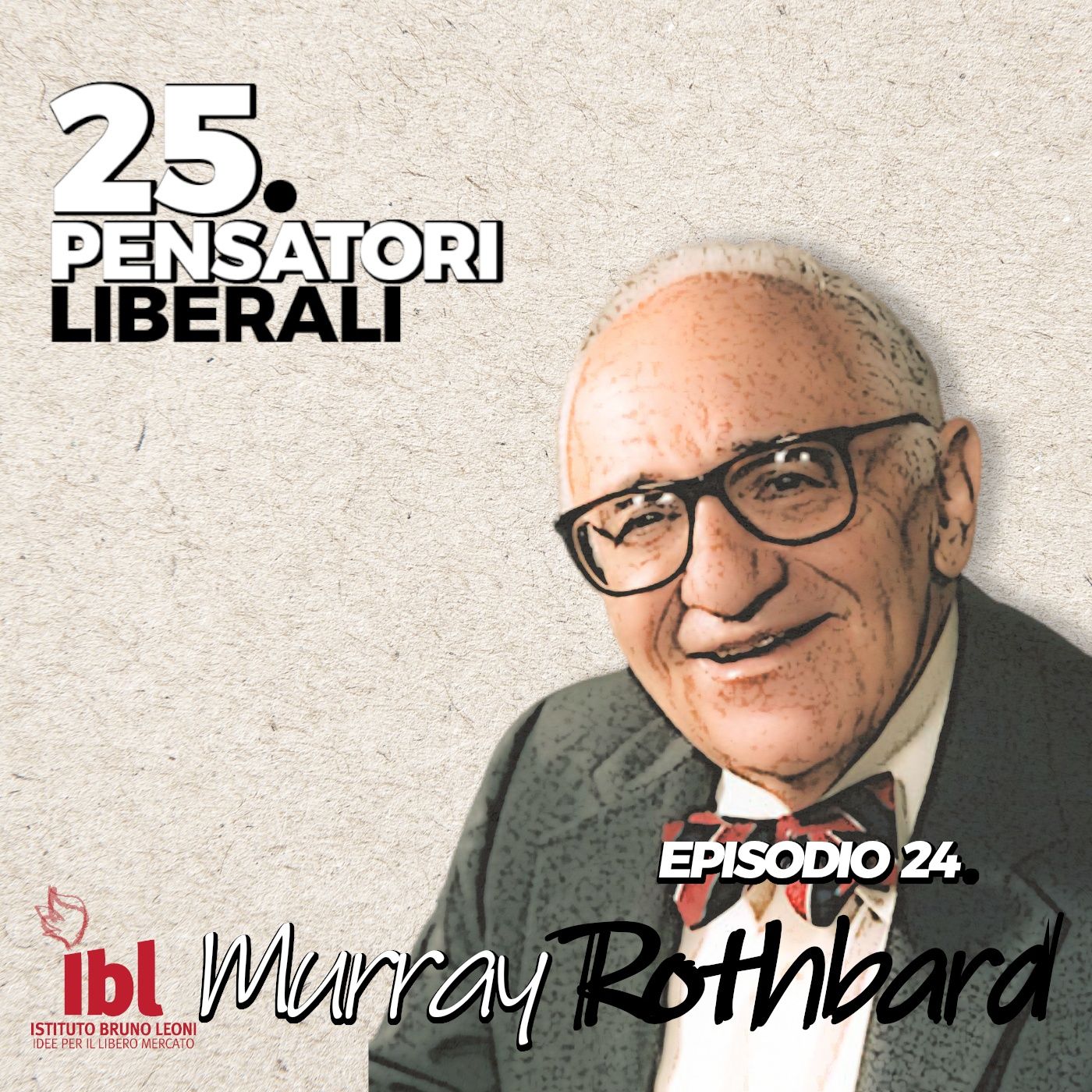
25 Pensatori Liberali#24: Murray N. Rothbard, con Roberta Modugno - 25 Pensatori Liberali"La tassazione non è altro che un puro e semplice furto, sebbene sia attuato su una scala così enormemente vasta che persino un criminale conclamato non si sognerebbe di tentare. E' un esproprio forzato delle proprietà dei cittadini, ovvero sia dei sudditi dello Stato" - Murray N. RothbardNato a New York nel 1926,Murray N. Rothbard è stato il fondatore del cosiddetto “anarco- capitalismo”. Per Rothbard, non è possibile affidare la difesa della libertà individuale a uno Stato pur “minimo”: qualsiasi forma di coercizione deve essere rigettata in toto, è inaccettabile, e inoltre non c’è davvero modo di “limitare” il potere politico, come pensavano di pote...
2023-01-1926 min
The Protestant Libertarian PodcastEp 28: ‘The Anatomy of the State’ by Murray Rothbard (Part 1)We are reviewing the first half of Murray Rothbard’s classic essay Anatomy of the State, in which he argues that the state can be defined as the entity that maintains a monopoly on violence in a given geographical area and that the state generates revenue through coercion. This is a classic in libertarian political philosophy and will be the way in which we define the concept of ‘state’ on this podcast. We look at the implications of Rothbard's ideas for a Christian understanding of the state and how we might begin to think about the way in which power...
2022-11-0856 min
She Became WeJust getting started! the She Became We TrailerShe Became We is an ever growing, ever evolving, ever emerging collective of Sisterhood. Hosted by J'aime Rothbard and Melinda Chandler, this show is a platform to end the paradigm of alone-ness. We support women in co-creating Circles with other women, activating intention-based meditation, transformation and community. In with the true, in with the new!
2022-11-0707 minKinsella On LibertyKOL338 | Human Action Podcast Ep. 308 with Jeff Deist: Rothbard on Punishment, Property, and ContractKinsella on Liberty Podcast, Episode 338.
Update: See also KOL463 | Contracts, Usury, Fractional-Reserve Banking with André Simoni and this Grok analysis of various problems with smart contracts including the fact that most loans are unsecured.
From Human Action Podcast Ep. 308, "Rothbard's The Ethics of Liberty with Stephan Kinsella" (May 27, 2021), with Jeff Deist, discussing Rothbard’s Ethics of Liberty, chapters 9, 13, 19, et pass. (PDF).
Shownotes:
Lawyer and legal theorist Stephan Kinsella joins the show as we dive into Part II of Rothbard's The Ethics of Liberty, grappling with the foundational issues of crime, proportionality, and contract. When is property justly held? When may injuries...
2021-05-281h 10
The Flyover Libertarian PodcastEp. 10 | DecentralizationIn their tenth full-length tirade, Iowancap and Rural Rothbard invite @Daribely back on the podcast to discuss decentralization and spontaneous order.
https://twitter.com/daribely_
Hear about new episodes right away! Sign up for the email list.
www.facebook.com/flyoverlib
www.flyover.page
2020-06-2335 min
The Flyover Libertarian PodcastEp. 9 | Abortion in a Free SocietyIowancap and Rural Rothbard reflect on a recent Fly-By episode about rights and force, specifically applied to the issue of abortion.
Hear about new episodes right away! Sign up for the email list.
www.facebook.com/flyoverlib
www.flyover.page
2020-06-1719 min
The Flyover Libertarian PodcastEp. 6 | Getting "Right" with IsaacThe Rural Rothbard is unavailable, so Iowancap invites a rando named Isaac on the podcast to spur conversation.
https://twitter.com/lowkey_xtian
Hear about new episodes right away! Sign up for the email list.
www.facebook.com/flyoverlib
www.flyover.page
2020-04-1436 min
The Flyover Libertarian PodcastEp. 4 | Anarchy is a Scary WordLibertarians are like Heinz: 57 varieties. Iowancap and The Rural Rothbard™ discuss anarcho-capitalism, minarchism, and vanilla conservatism. Anti-war alliances with the cultural left are weighed. Is the essence of liberty property rights, or the non-aggression principle? Iowancap connects his conservative Christian beliefs to his anarchist political philosophy (no mental gymnastics required).
"Anarcho-capitalists are just consistent libertarians, libertarians are just consistent conservatives"
-The Rural Rothbard™
2020-02-2533 min
The Flyover Libertarian PodcastEp. 3 | Can Christians be Libertarian?The podcast where two unimportant people from an unimportant place give you the opinion that you didn't ask for. Iowancap and The Rural Rothbard™ ponder Christianity, Libertarianism, and muh Romans 13. They discuss the dumpster fire that is Twitter, give a shout out to some excellent fan comments on the page, and beg people to use #MeanwhileOnTwitter so they have some content for the next episode.
www.flyover.page
www.facebook.com/flyoverlib
2020-01-2837 min
The Flyover Libertarian PodcastEp. 2 | Iran and WarThe podcast where two unimportant people from an unimportant place give you the opinion that you didn't ask for. Iowancap and The Rural Rothbard™ rant about Iran and neoconservatives. They beg people to use #MeanwhileOnTwitter so they have some content for the next episode.
www.flyover.page
www.facebook.com/flyoverlib
SHOW NOTES:
Iran Clarifies Meaning of 'Death to America' https://www.youtube.com/watch?v=U6AG1OqeItI
2020-01-1434 min
The Flyover Libertarian PodcastEp. 1 | Origin StoriesThe podcast where two unimportant people from an unimportant place give you the opinion that you didn't ask for. Iowancap and The Rural Rothbard™ discuss the origin of their extremely popular Facebook page, and the principled origins of their own political views.
www.flyover.page
www.facebook.com/flyoverlib/
EXTRA CREDIT:
Who would build the roads? https://www.youtube.com/watch?v=BcGvfoZISR8
Ayn Rand https://www.youtube.com/watch?v=MavagFXgEsA
Democracy https://www.youtube.com/watch?v=ooTMe0eqn5s
2020-01-0735 min
The Green RushDr. Jonathan Rothbard, CEO, Chief Scientific Officer and co-founder of Katexco Pharmaceuticals
Dr. Jonathan Rothbard, CEO, Chief Scientific Officer and co-founder of Katexco Pharmaceuticals, a medical cannabis biopharma company based in Palo Alto, California, is this week’s guest on The Green Rush. In addition to his work in the cannabis space, Dr. Rothbard works in the neurology department at Stanford University where he’s also worked in the departments of chemistry and rheumatology. Dr. Rothbard is also the founder of Amylin, which was eventually sold to Bristol-Myers Squibb.
Dr. Rothbard is spearheading the second generation of medical cannabis, where cannabinoids like CBD and THC will be synthesized in labs...
2019-04-1853 min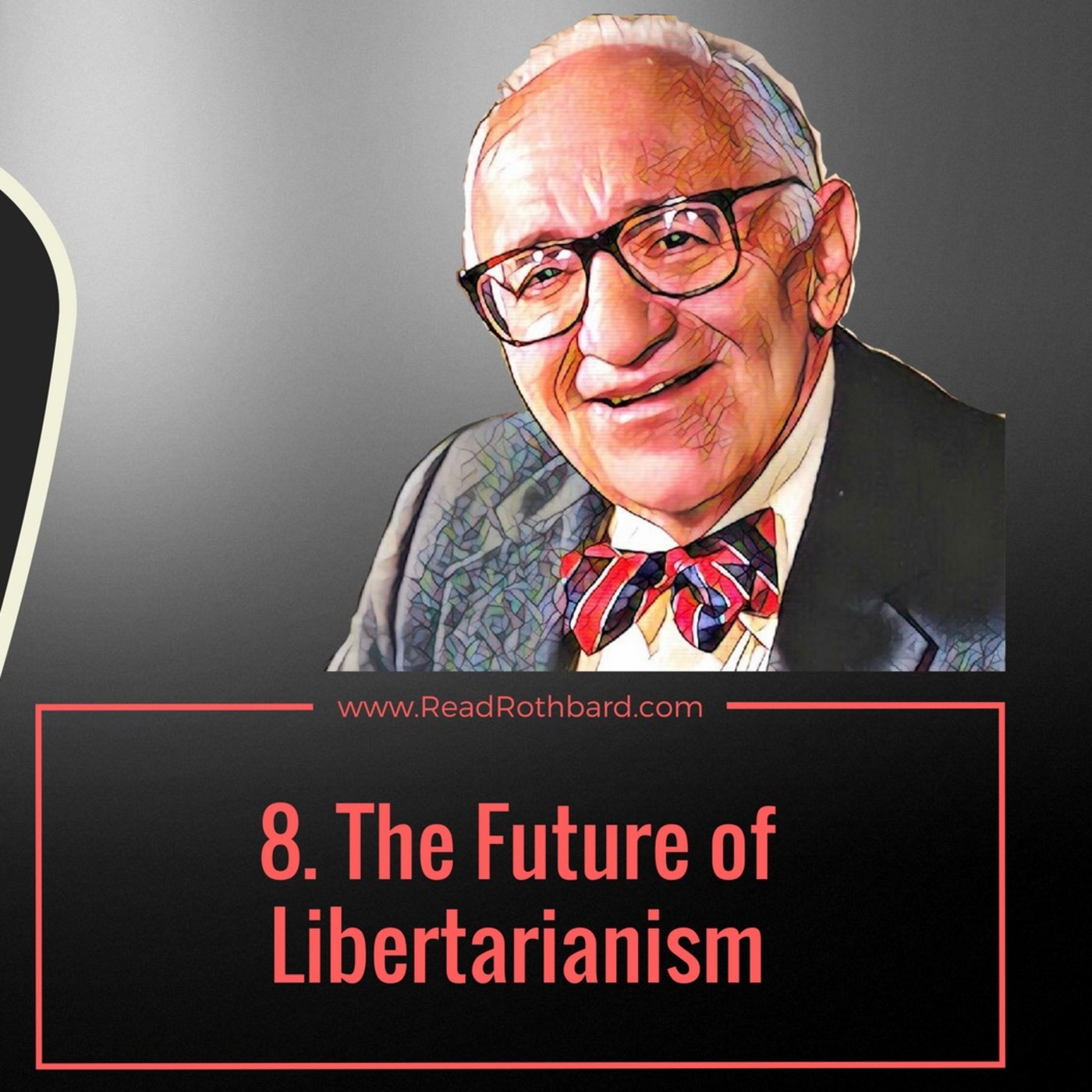
Enemy of the State: Murray RothbardEpisode 61 - 8. The Future of Libertarianism - Murray N Rothbard20th Century American Economic History
8. The Future of Libertarianism
Lecture by Murray N. Rothbard
Rothbard explains why he is optimistic. The norm of civilization has been despotism and statism. The quantum quality change in history has been the Industrial Revolution from mid-18th Century to mid-19th. Only the free market, libertarian society can expand this viable and moral industrialism. A society without a ruling class results. Peace and a classless society are classical liberal goals.
Some individuals seize control of the state apparatus and use taxes to rob the producers. Class conflicts occur because one group in society are...
2017-05-011h 23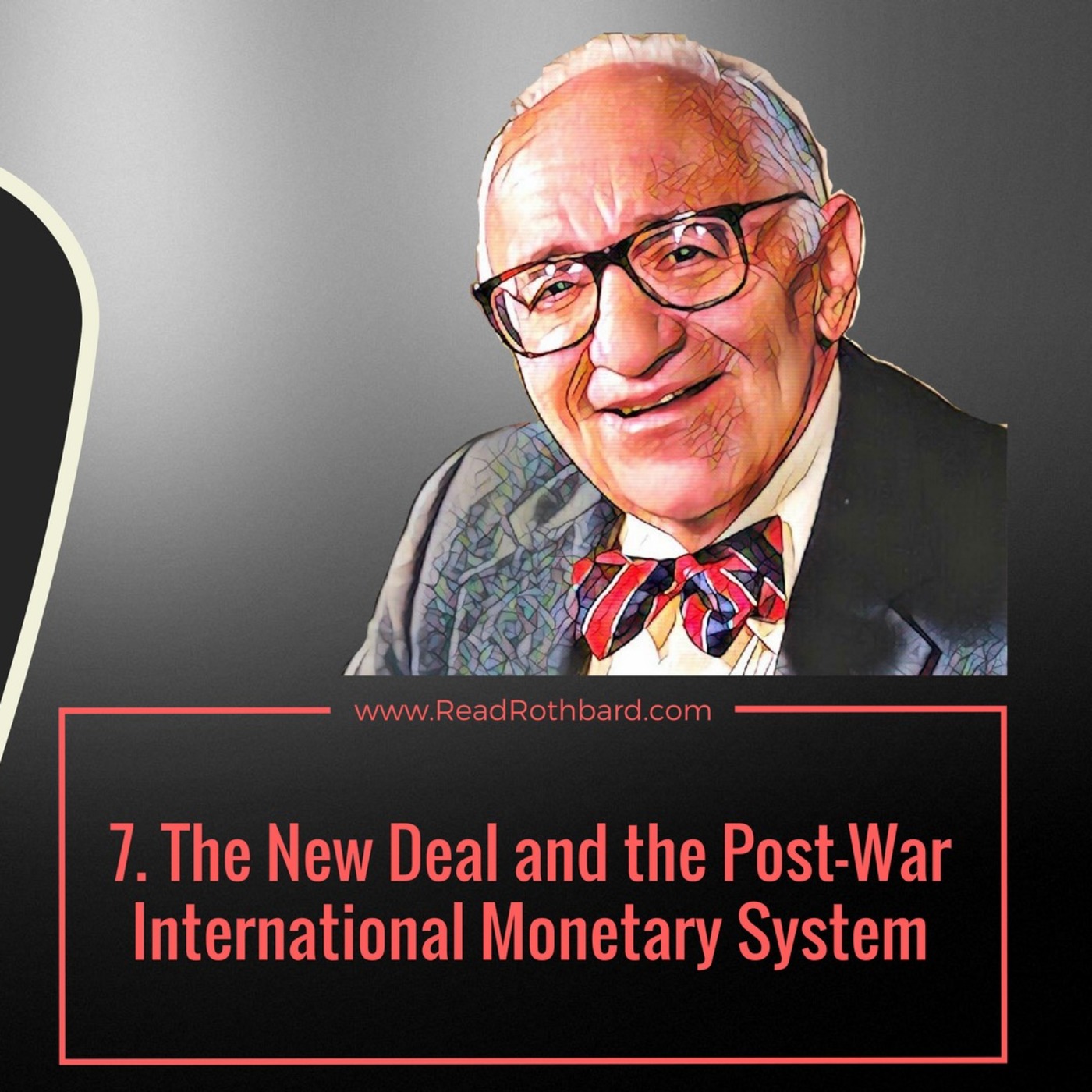
Enemy of the State: Murray RothbardEpisode 60 - 7. The New Deal and the Post War International Monetary System - Murray N Rothbard20th Century American Economic History
7. The New Deal and the Post War International Monetary System
Lecture by Murray N. Rothbard
The World Economic Conference of 1933 in London met to deal with America's Great Depression, but, without consulting anyone, FDR declared that the U.S. would not agree to the proposal because he wanted to take the U.S. off the gold standard in order to inflate the dollar. The gold-supporting British and French were horrified; Nazi Germany was delighted.
Hitler loved FDR's New Deal. Morgan men continued to hold power positions internationally, creating worldwide inflation. By 1945, Bretton Woods had established...
2017-04-231h 24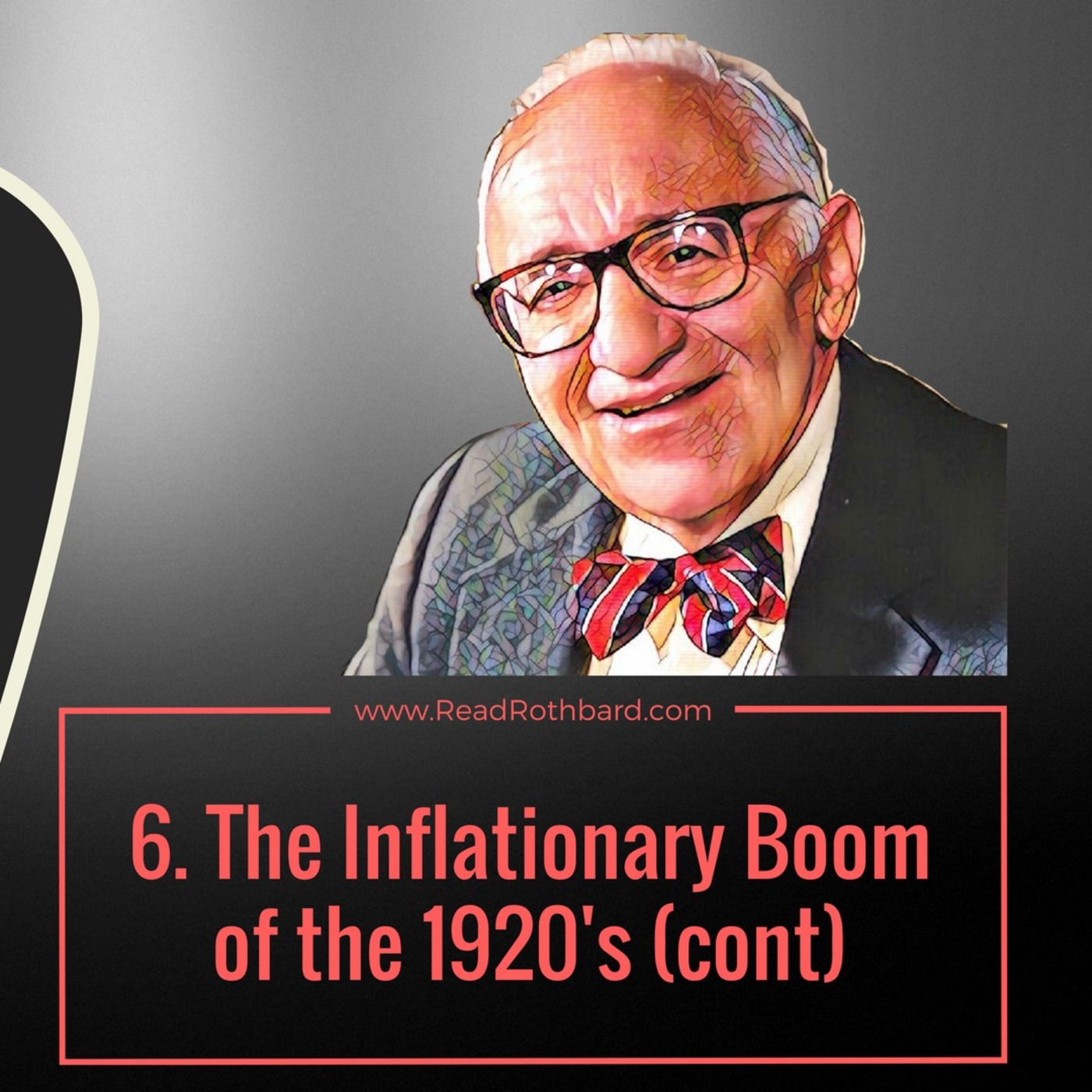
Enemy of the State: Murray RothbardEpisode 59 - 6. The Inflationary Boom of the 1920s (continued) - Murray N Rothbard20th Century American Economic History
6. The Inflationary Boom of the 1920s (continued)
Lecture by Murray N. Rothbard
Republican policy has always been high tariffs, keeping foreign goods out. But, then the US would lend those countries money to be able to pay for our higher-priced exports. This peculiar foreign-lending scheme included farm goods. Until 1928 there was an enormous foreign lending boom. The stock market collapsed in October 1929.
The Federal Reserve Act of 1913 was for inflationary purposes. The banks endorsed acceptance markets for awhile. Morgan men continued to push price stabilization, yet prices in free markets actually fall, benefiting consumers. In 1929...
2017-04-171h 04
Enemy of the State: Murray RothbardEpisode 58 - 5 . The Inflationary Boom of the 1920s - Murray N Rothbard20th Century American Economic History
5 . The Inflationary Boom of the 1920s
Lecture by Murray N. Rothbard
The Industrial Revolution and the development of the modern banking system were the two big things that happened in the Eighteenth Century in Britain. Why does the boom-bust cycle emerge? Is the cycle just a natural part of industry, or is it caused by the banking system?
The Austrian explanation of expanded bank credit not based upon private pools of savings is sound, unlike the Keynesian explanations of overproduction or under consumption. Inflation is an increase in the money supply.
5 of 8 from Murray Rothbard's 20...
2017-04-091h 07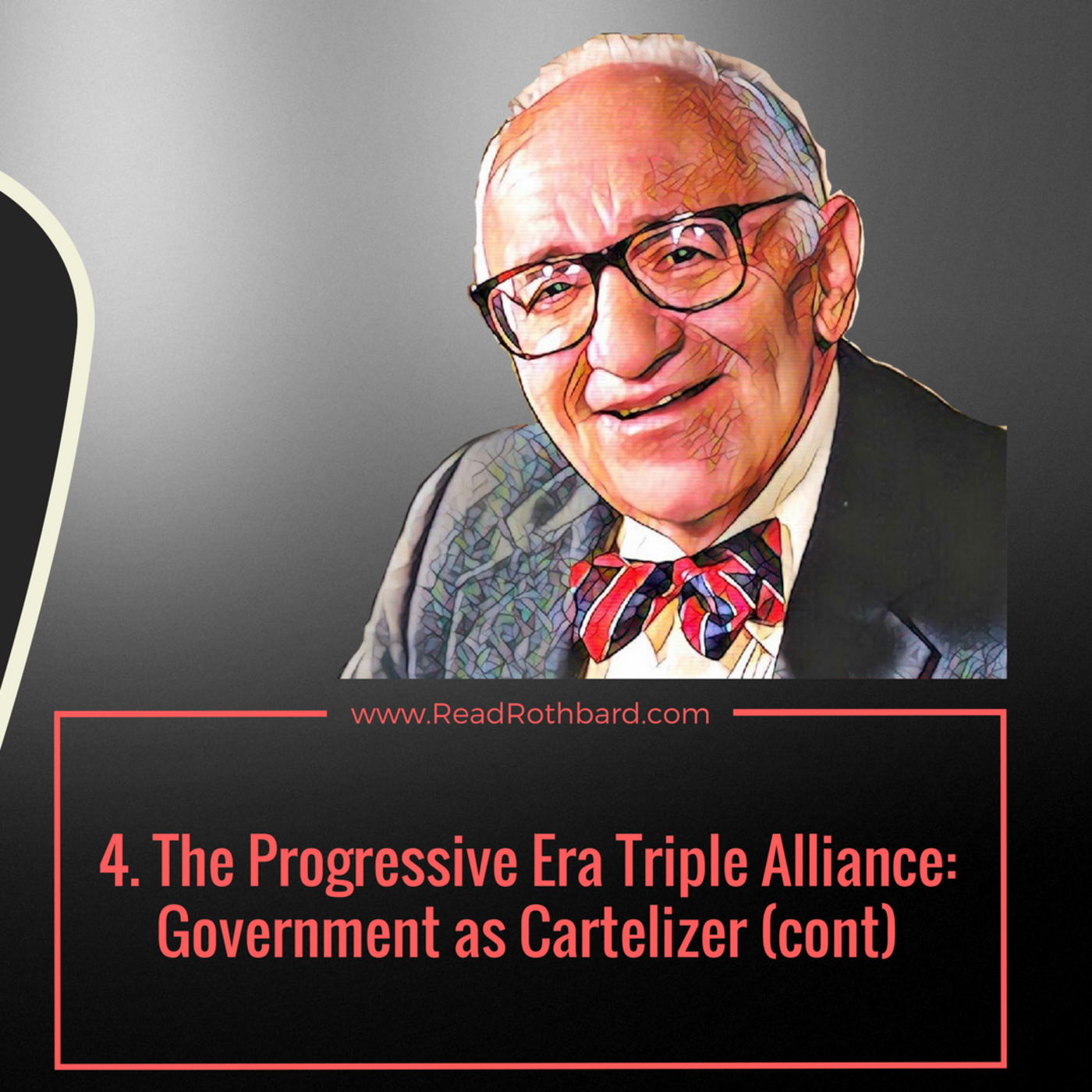
Enemy of the State: Murray RothbardEpisode 57 - 4. The Progressive Era Triple Alliance: Government as Cartelizer (continued) - Murray N Rothbard20th Century American Economic History
4. The Progressive Era Triple Alliance: Government as Cartelizer continued
Lecture by Murray N. Rothbard
The state must invest in human beings the same way you invest in cattle on a farm. This progressive corporatist view was behind the creation of the Rockefeller Foundation. Industrial solutions were to be strictly scientific, e.g. minimum wage laws, public works, and government concentration camps (CCC).
The Federal Reserve system followed the national banking system. The free banking system had had the least inflation. Government has had a long history of bailing out big banks that might fail. Benjamin...
2017-04-031h 06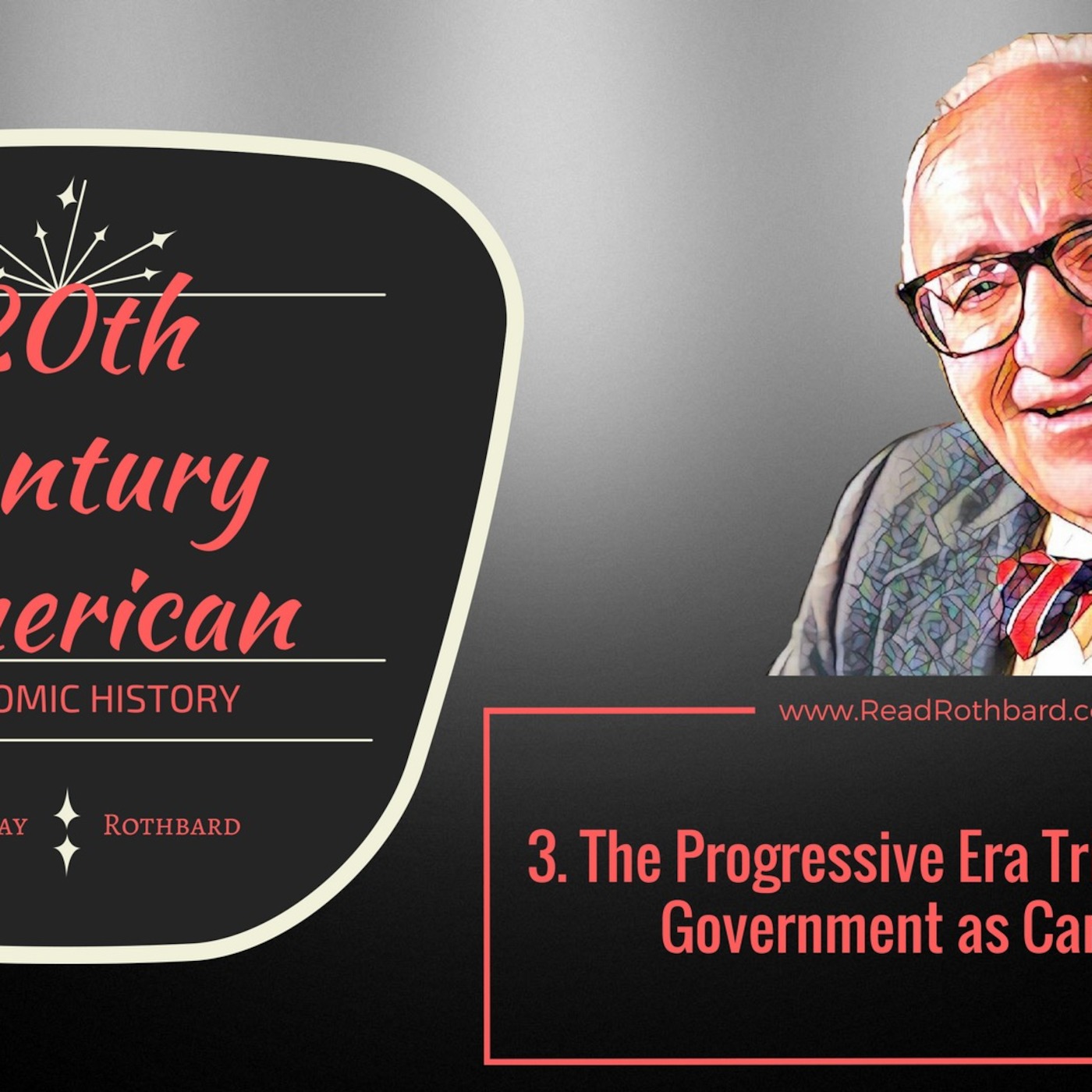
Enemy of the State: Murray RothbardEpisode 56 - 3. The Progressive Era Triple Alliance: Government as Cartelizer - Murray N Rothbard20th Century American Economic History
3. The Progressive Era Triple Alliance: Government as Cartelizer
Lecture by Murray N. Rothbard
The progressive period birthed the cancerous growth of the welfare/warfare state, fake capitalism, the middle way, neomercantilism, and the corporate state. Morgan and Rockefeller men warred with each other over many issues and many generations. Effective competition was attacked as government attempted to cartellize business.
3 of 8 from Murray Rothbard's 20th Century American Economic History lecture series.
Sourced from: https://mises.org/library/20th-century-american-economic-history
We are not endorsed or affiliated with the above.
https://creativecommons.org/licenses/by-nc-nd/3.0/legalcode
Presented by: Read...
2017-03-271h 27
Enemy of the State: Murray RothbardEpisode 55 - 2. The Rise of Big Business: The Failure of Trusts and Cartels continued Murray N Rothbard20th Century American Economic History
2. The Rise of Big Business: The Failure of Trusts and Cartels continued
Lecture by Murray N. Rothbard
Despite the drive for monopoly, only oil, sugar and corn products ended up dominated by a particular company. Bigger was not better. Biggest was not best. Smaller and more mobile was more competitive. Major inventions are still coming from small firms.
2 of 8 from Murray Rothbard's 20th Century American Economic History lecture series.
Sourced from: https://mises.org/library/20th-century-american-economic-history
We are not endorsed or affiliated with the above.
https://creativecommons.org/licenses/by-nc-nd/3.0/legalcode
Presented by: Read Rothbard...
2017-03-2051 min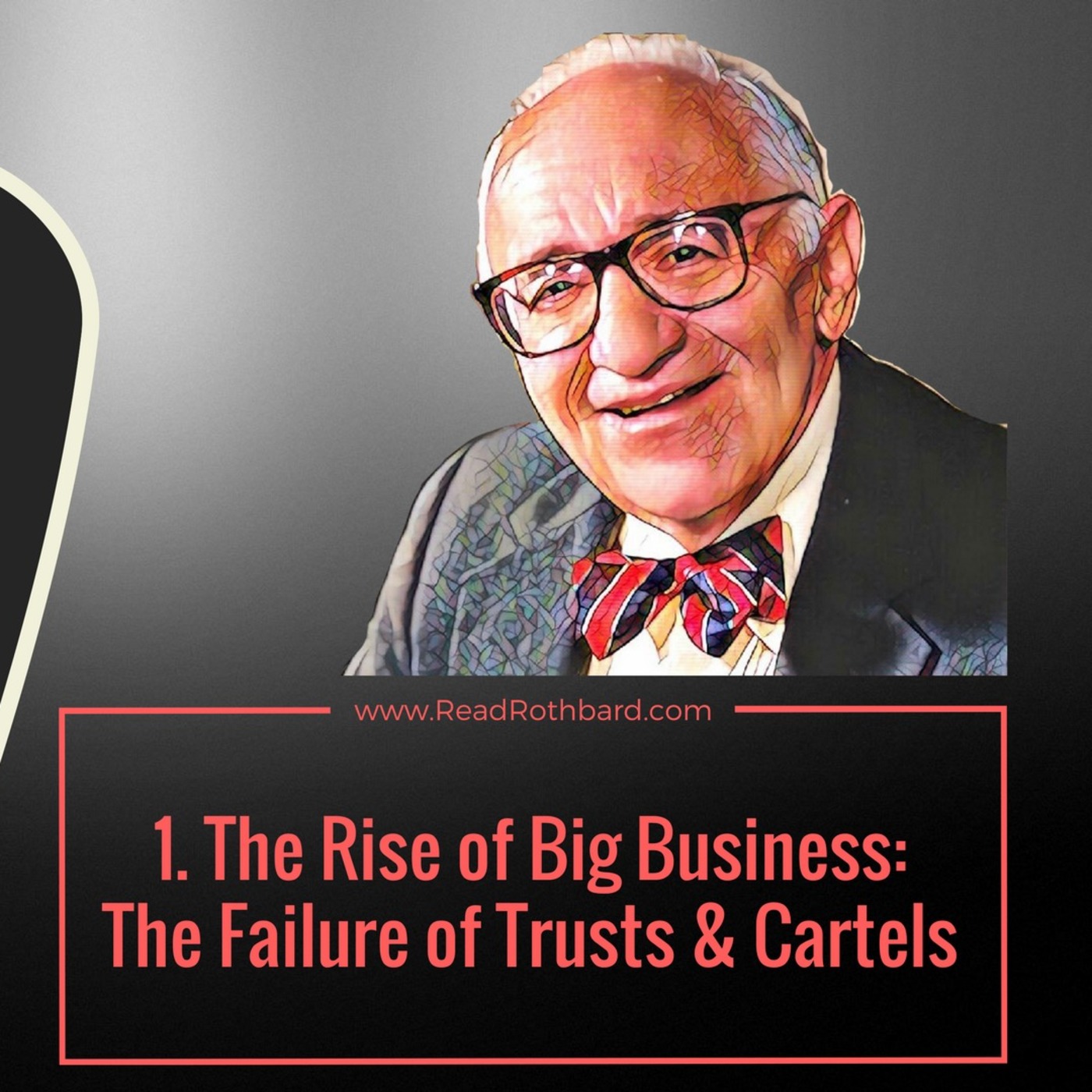
Enemy of the State: Murray RothbardEpisode 54 - 1. The Rise of Big Business: The Failure of Trusts and Cartels - Murray N Rothbard20th Century American Economic History
1. The Rise of Big Business: The Failure of Trusts and Cartels
Lecture by Murray N. Rothbard
In the 19th Century and the beginning of the 20th, the rise of big business on the free market could not create monopolies and cartels. Only government could do that. Government tried. Government failed.
1 of 8 from Murray Rothbard's 20th Century American Economic History lecture series.
Sourced from: https://mises.org/library/20th-century-american-economic-history
We are not endorsed or affiliated with the above.
https://creativecommons.org/licenses/by-nc-nd/3.0/legalcode
Presented by: Read Rothbard and Actual Anarchy
Read Rothbard is comprised of...
2017-03-1357 min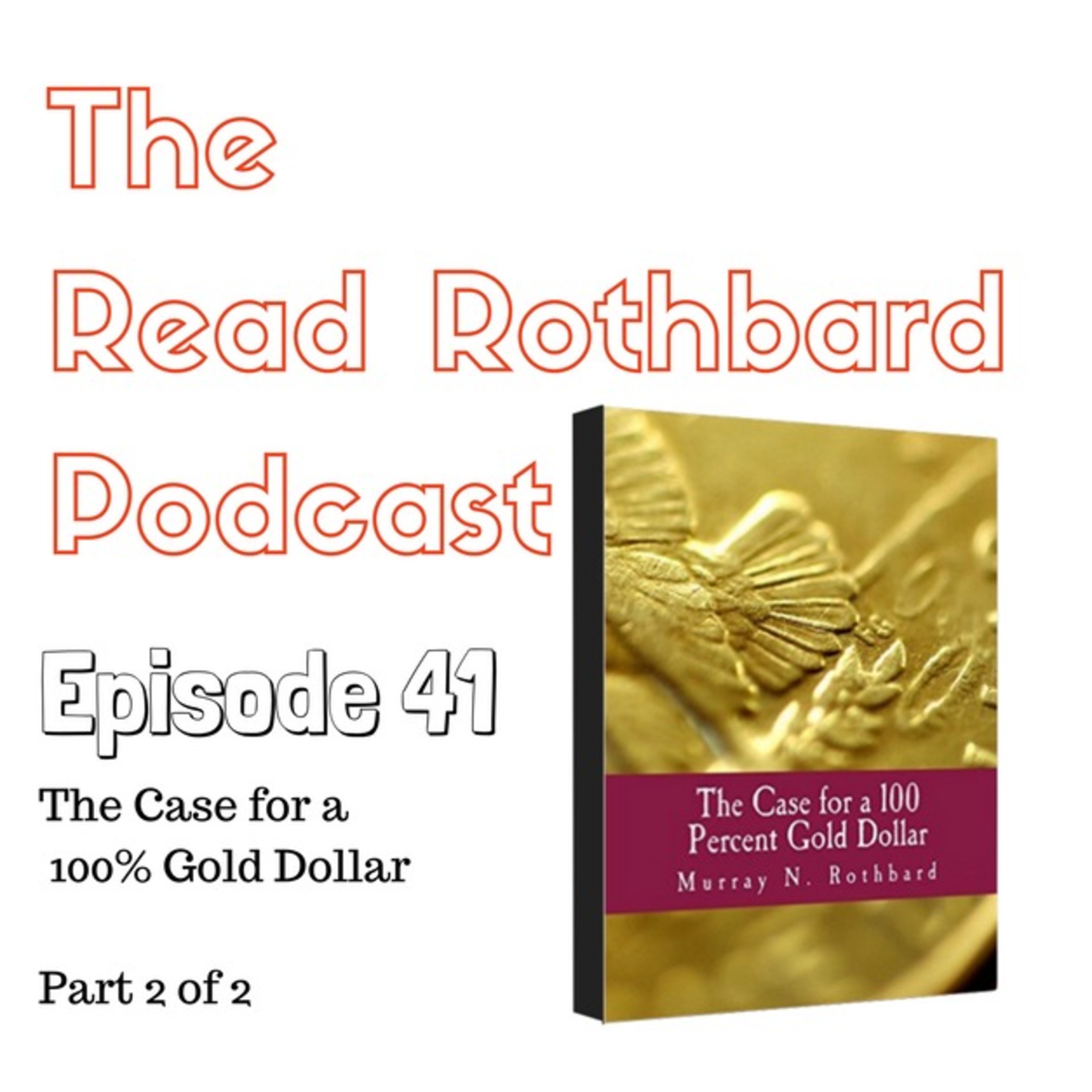
The Read Rothbard PodcastEpisode 41 - The Case for a 100 Percent Gold Dollar - Murray N. Rothbard - Audiobook - Part 2 of 2Now that we have finished the 3-part audiobook version of Murray Rothbard's "What Has Government Done To Our Money?", we move on to the companion piece "The Case For A 100 Percent Gold Dollar". Presented in two parts, this book take the history of money's origins that you just learned and applies the lessons to advocate for a free-market money that will likely, organically rest on a foundation of gold and silver.
The former "Read Rothbard Podcast" where we talk about movies from an anarcho-capitalist perspective will be re-launched as "the Actual Anarchy Podcast".
Look for more audiobook versions of...
2017-03-0353 min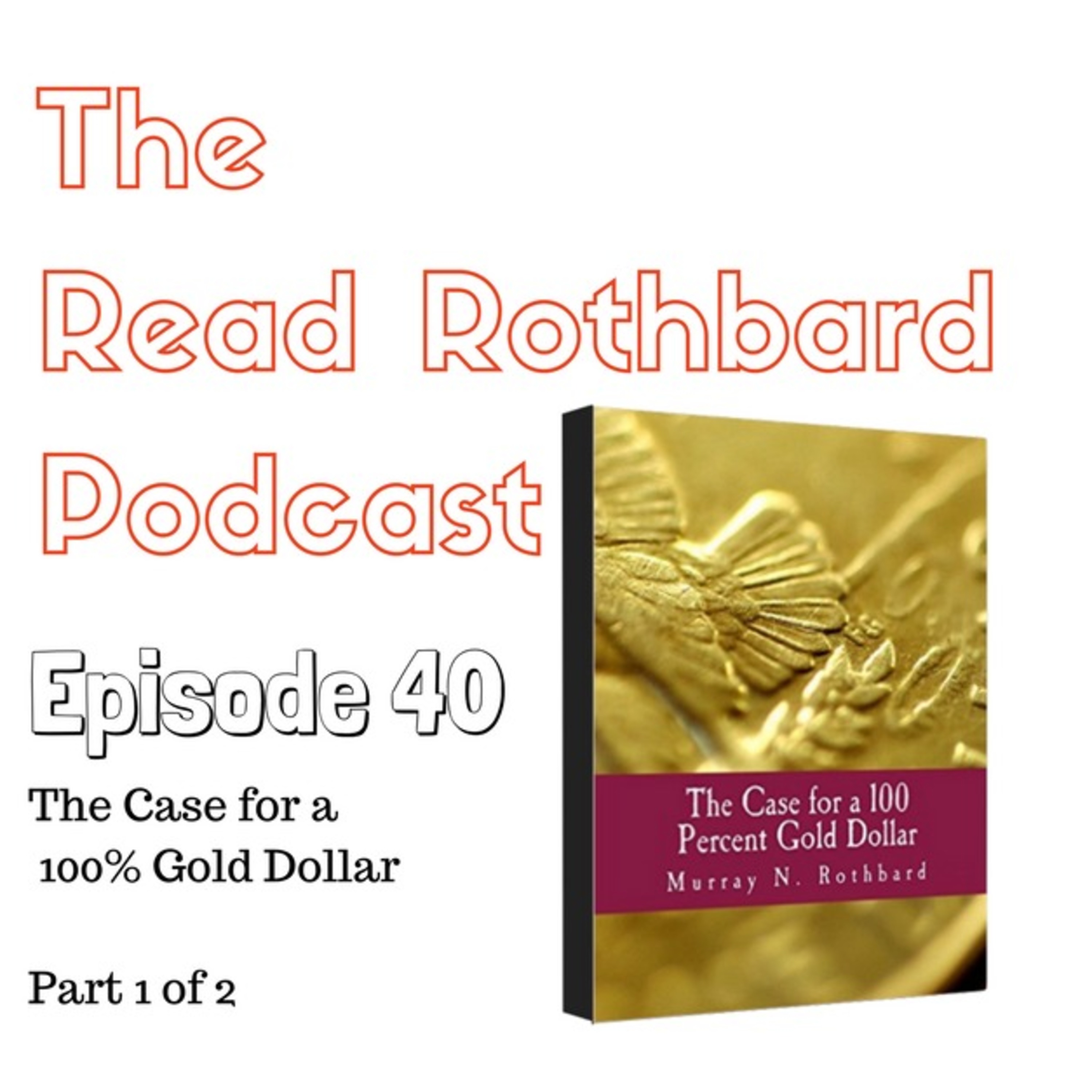
The Read Rothbard PodcastEpisode 40 - The Case for a 100 Percent Gold Dollar - Murray N. Rothbard - Audiobook - Part 1 of 2Now that we have finished the 3-part audiobook version of Murray Rothbard's "What Has Government Done To Our Money?", we move on to the companion piece "The Case For A 100 Percent Gold Dollar". Presented in two parts, this book take the history of money's origins that you just learned and applies the lessons to advocate for a free-market money that will likely, organically rest on a foundation of gold and silver.
The former "Read Rothbard Podcast" where we talk about movies from an anarcho-capitalist perspective will be re-launched as "the Actual Anarchy Podcast".
Look for more audiobook versions of...
2017-02-2452 min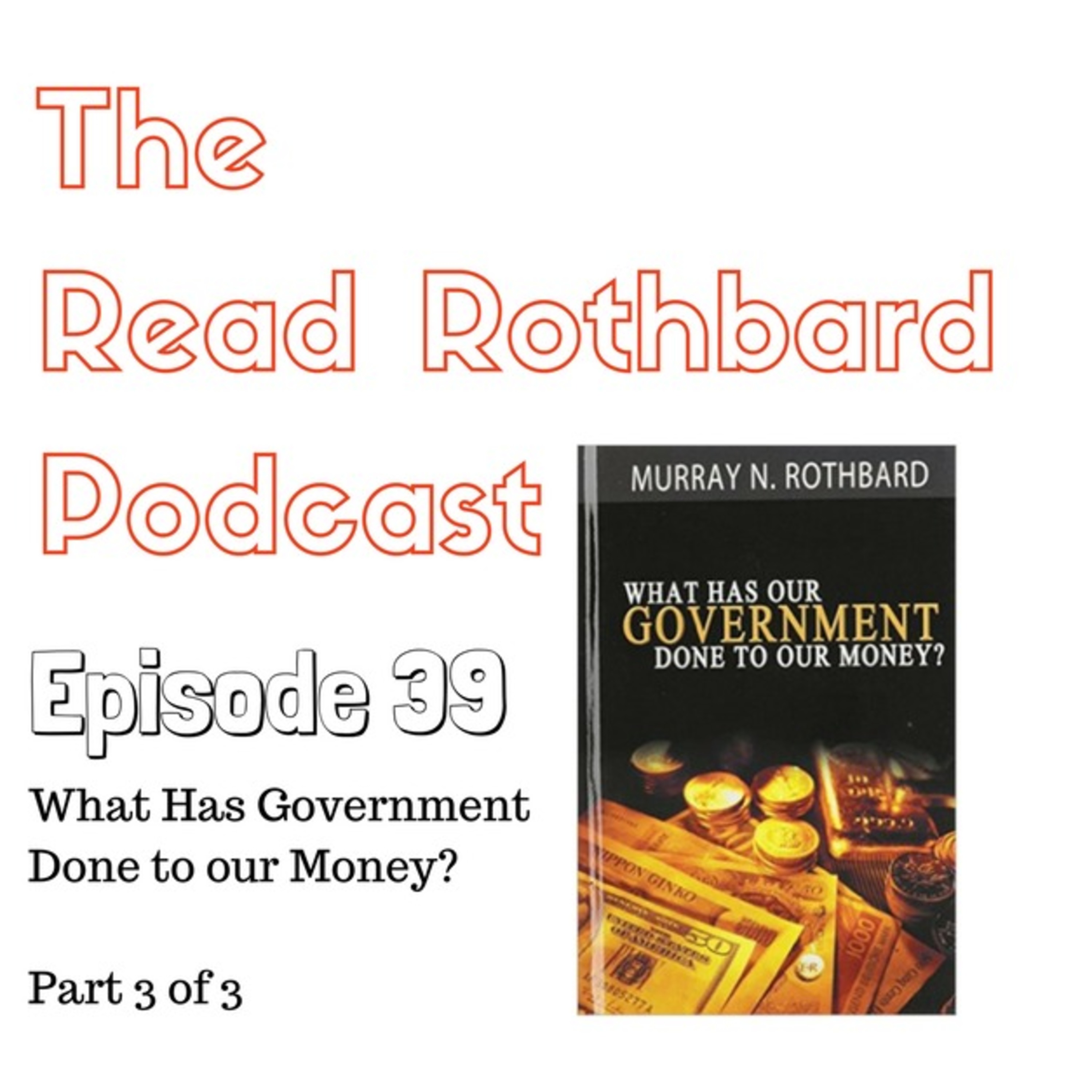
The Read Rothbard PodcastEpisode 39 - What Has Government Done To Our Money? - Murray N. Rothbard - Audiobook - Part 3 of 3After the past two weeks where we posted Murray Rothbard's "Economic Depressions: Their Cause and Cure" and "Anatomy of the State", we now get into further detail on money, where it comes from and what government has done to separate it from its original purpose. Join us for this 3-part audiobook version of Murray Rothbard's "What Has Government Done To Our Money"?
The former "Read Rothbard Podcast" where we talk about movies from an anarcho-capitalist perspective will be re-launched as "the Actual Anarchy Podcast".
Look for more audiobook versions of a Murray Rothbard books and articles posting on Fridays...
2017-02-1744 min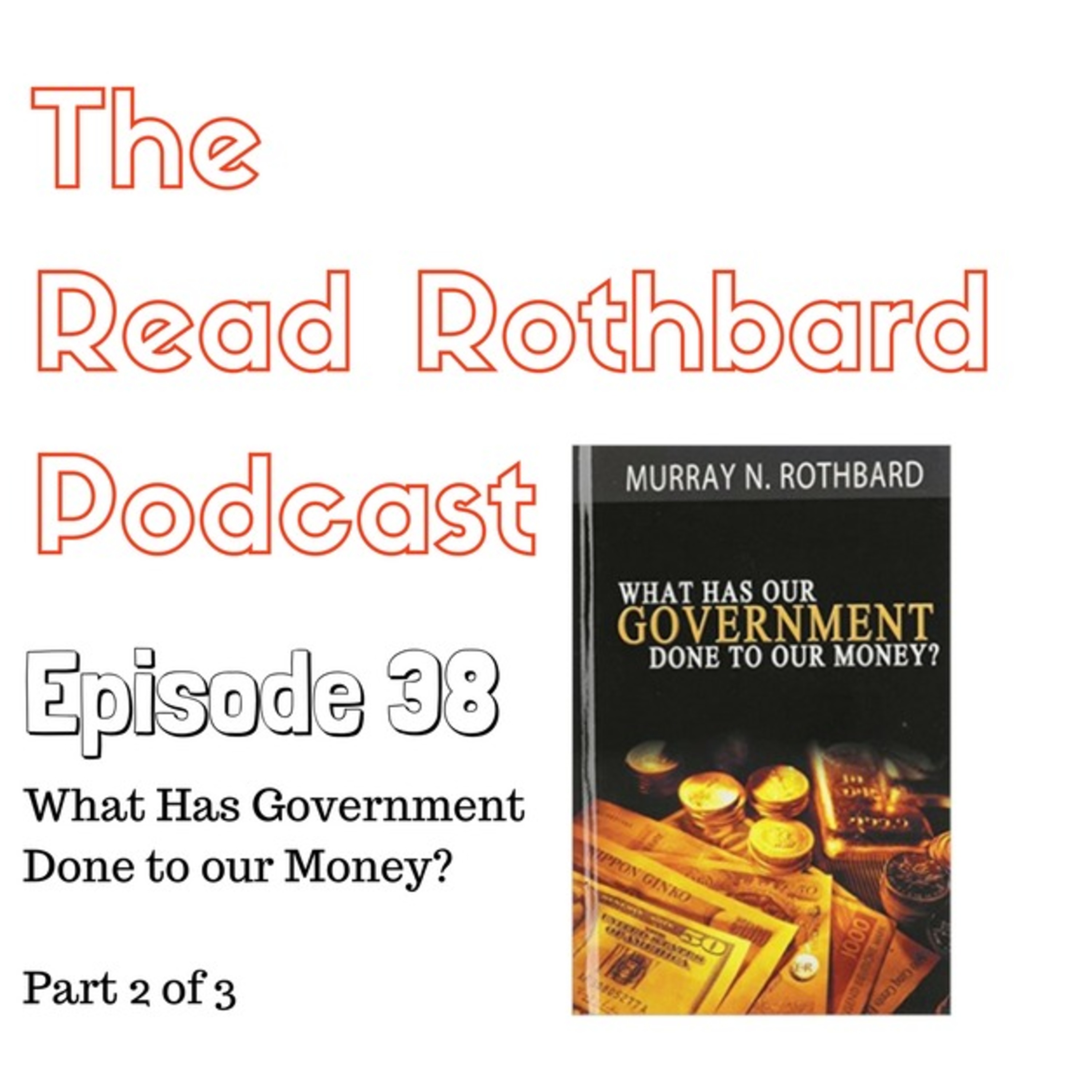
The Read Rothbard PodcastEpisode 38 - What Has Government Done To Our Money? - Murray N. Rothbard - Audiobook - Part 2 of 3After the past two weeks where we posted Murray Rothbard's "Economic Depressions: Their Cause and Cure" and "Anatomy of the State", we now get into further detail on money, where it comes from and what government has done to separate it from its original purpose. Join us for this 3-part audiobook version of Murray Rothbard's "What Has Government Done To Our Money"?
The former "Read Rothbard Podcast" where we talk about movies from an anarcho-capitalist perspective will be re-launched as "the Actual Anarchy Podcast".
Look for more audiobook versions of a Murray Rothbard books and articles posting on Fridays...
2017-02-101h 06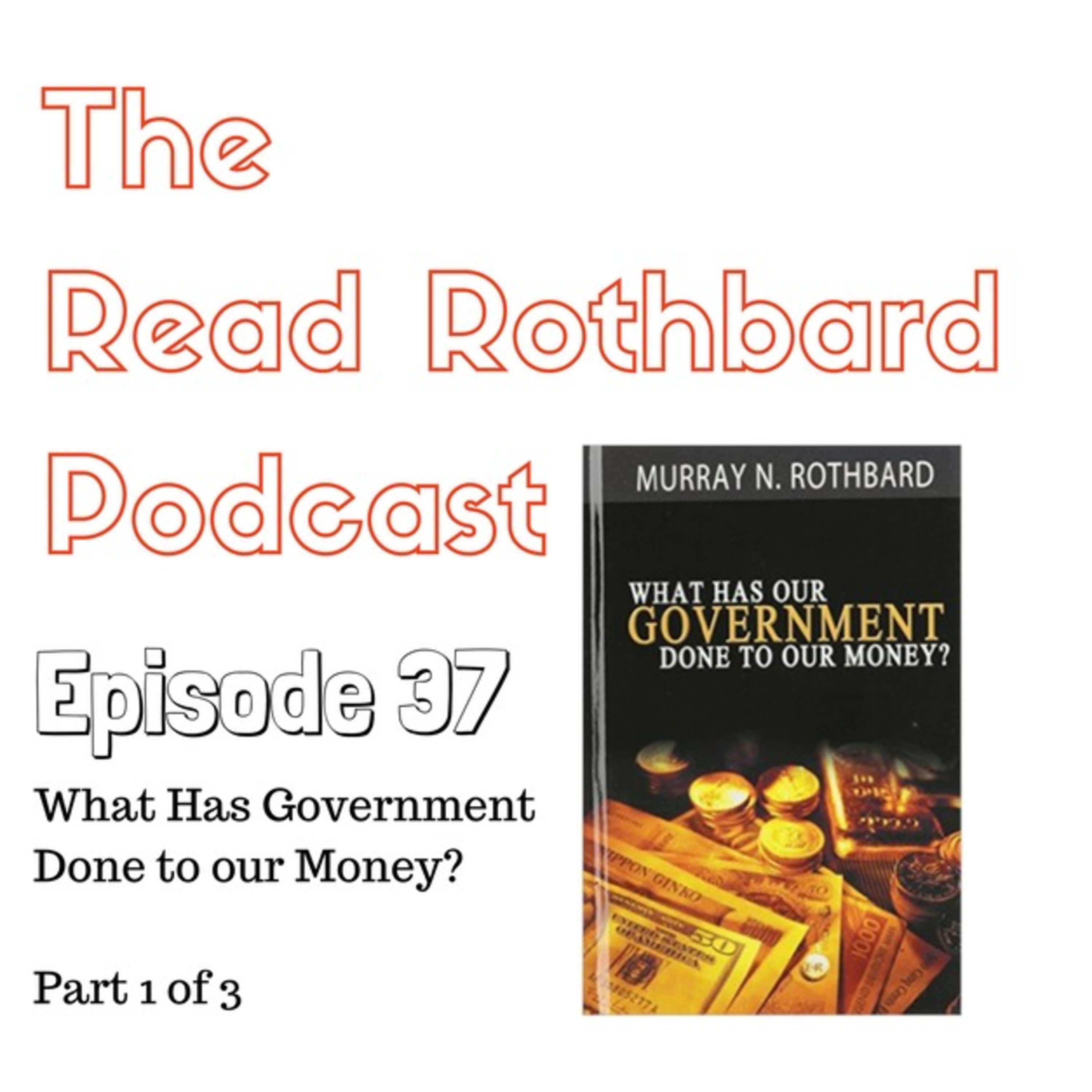
The Read Rothbard PodcastEpisode 37 - What Has Government Done To Our Money? - Murray N. Rothbard - Audiobook - Part 1 of 3After the past two weeks where we posted Murray Rothbard's "Economic Depressions: Their Cause and Cure" and "Anatomy of the State", we now get into further detail on money, where it comes from and what government has done to separate it from its original purpose. Join us for this 3-part audiobook version of Murray Rothbard's "What Has Government Done To Our Money"?
The former "Read Rothbard Podcast" where we talk about movies from an anarcho-capitalist perspective will be re-launched as "the Actual Anarchy Podcast".
Look for more audiobook versions of a Murray Rothbard books and articles posting on Fridays...
2017-02-031h 32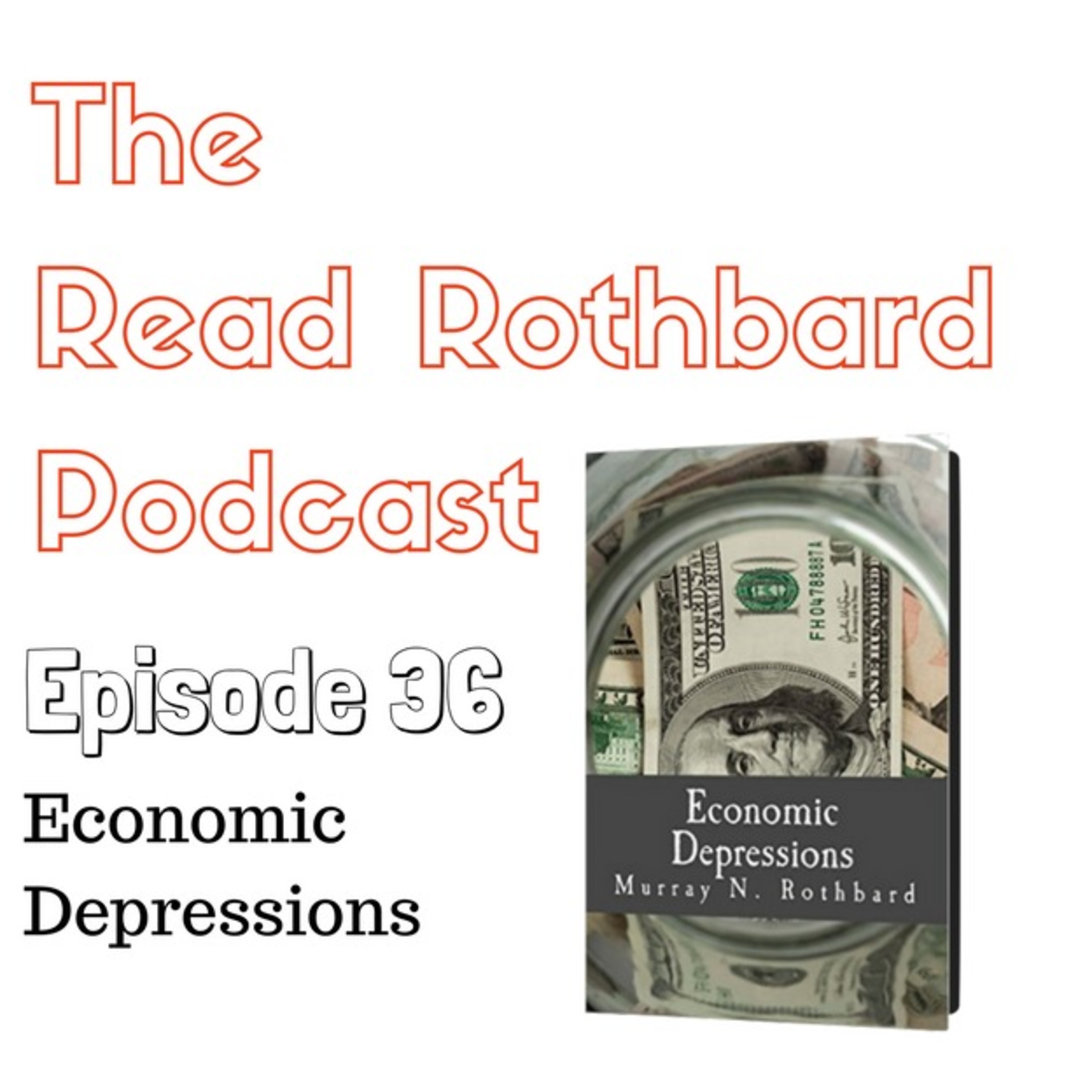
The Read Rothbard PodcastEpisode 36 - Economic Depressions: Their Cause and Cure - Murray N. Rothbard - AudiobookAs announced on our most recent shows, we will be transitioning "the Read Rothbard Podcast" to audiobooks of Murray's books and articles.
The second post is his "Economic Depressions: Their Cause and Cure" which is a great follow-up to last week's "Anatomy of the State". This gives a cogent understanding of where market-cycles come from, why they occur and how to prevent them.
The former "Read Rothbard Podcast" where we talk about movies from an anarcho-capitalist perspective will be re-launched as "the Actual Anarchy Podcast".
Look for more audiobook versions of a Murray Rothbard books and articles posting on...
2017-01-2742 min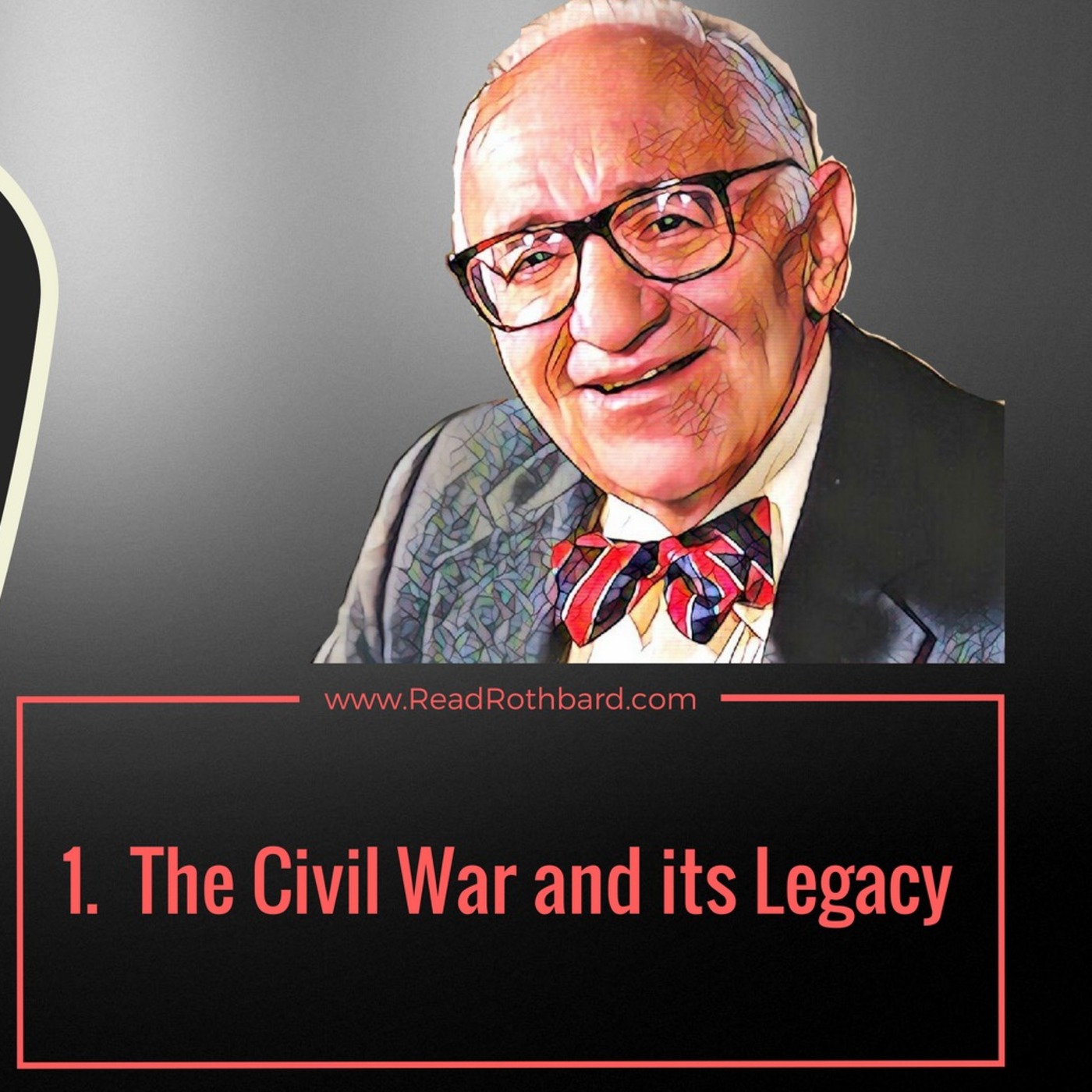
Enemy of the State: Murray RothbardEpisode 41 - American Economy and the End of Laissez-Faire - 1 of 13 - The Civil War and Its Legacy - Murray N. RothbardThe American Economy and the End of Laissez-Faire: 1870 to World War II
1. The Civil War and Its Legacy
Lecture by Murray N. Rothbard
How does government intervene in the economy? What are the consequences? What are the motivations behind passing these interventions? The lives of the people involved explain why they do these things. Rothbard delves into the religious views of the leaders in American history to understand motivations. Schools, drink, and Sabbath laws were the focus of Yankees in Northern states for ninety years.
Lecture 1 of 13 presented in Fall of 1986 at the New York Polytechnic University.
This lecture on Y...
2017-01-211h 55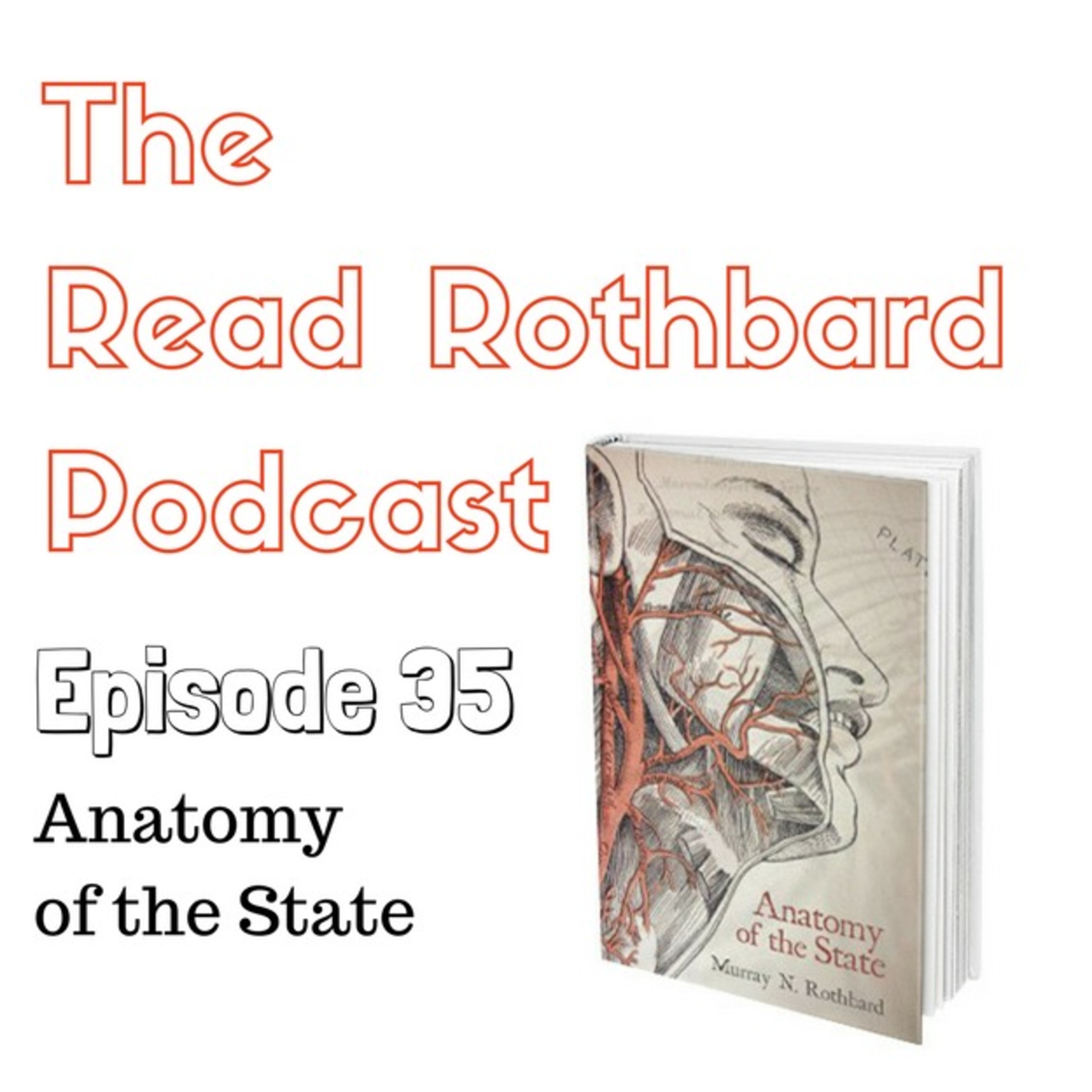
The Read Rothbard PodcastEpisode 35 - Anatomy of the State - Murray N. Rothbard - AudiobookAs announced on our most recent shows, we will be transitioning "the Read Rothbard Podcast" to audiobooks of Murray's books and articles.
The first post is his "Anatomy of the State" which is a great red-pill, gateway drug for a lot of people to finally see the state for what it is; and what it is not.
The former "Read Rothbard Podcast" where we talk about movies from an anarcho-capitalist perspective will be re-launched as "the Actual Anarchy Podcast".
Look for more audiobook versions of a Murray Rothbard books and articles posting on Fridays each week.
More information to...
2017-01-201h 00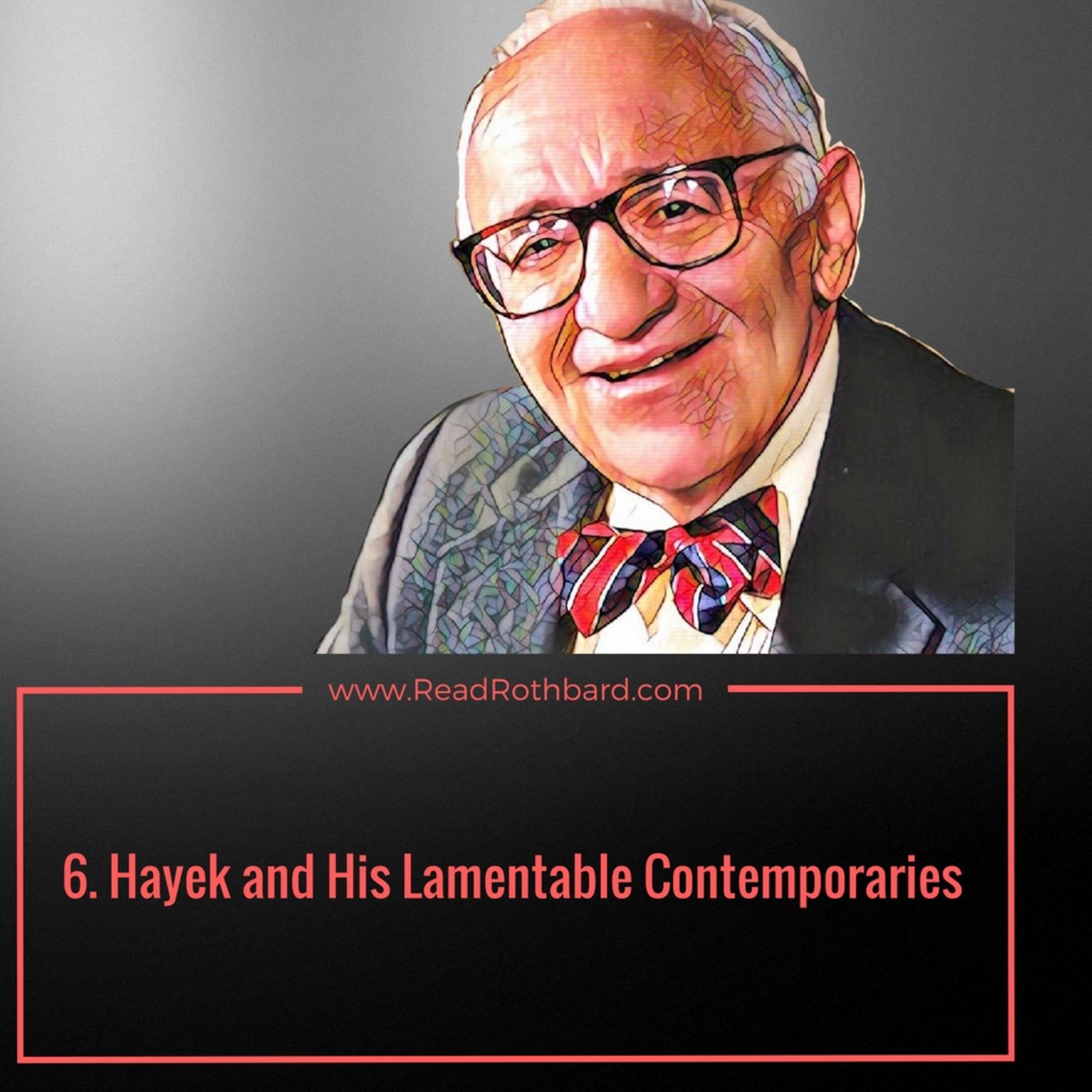
Enemy of the State: Murray RothbardEpisode 40 - History of Economic Thought - 6 of 6 - Hayek and His Lamentable Contemporaries - Murray N RothbardMurray Rothbard died before he could write the third volume of his famous History of Economic Thought, which would cover the birth and development of the Austrian School, through the Keynesian Revolution and Chicago School. With this six-lecture course, however, the History of Economic Thought is complete.
6. Hayek and His Lamentable Contemporaries
The Nobel award to F.A. Hayek in 1974 went directly against the tradition of that prize to go only to mathematical forecasters, left-liberals, and government central planners. Not only was Hayek’s work pioneering, but it is also the only correct analysis of business cycles past, present and fu...
2017-01-191h 07
The Read Rothbard PodcastMLK Special - Selma and the Civil Rights MovementWe have another special guest on to discuss the movie Selma for the Martin Luther King Jr. Day Special. Ryan Jones joines us from www.theafrolibertarian.com to discuss the film, MLK's legacy and many other issues related to race and government. This is a long one...and fitting for what is our final episode as the Read Rothbard Podcast. The name will live on, but as Murray Rothbard audiobook versions of his books and articles. The show that we do will also live on as the Actual Anarchy Podcast, where we take a look at movies and events...
2017-01-171h 54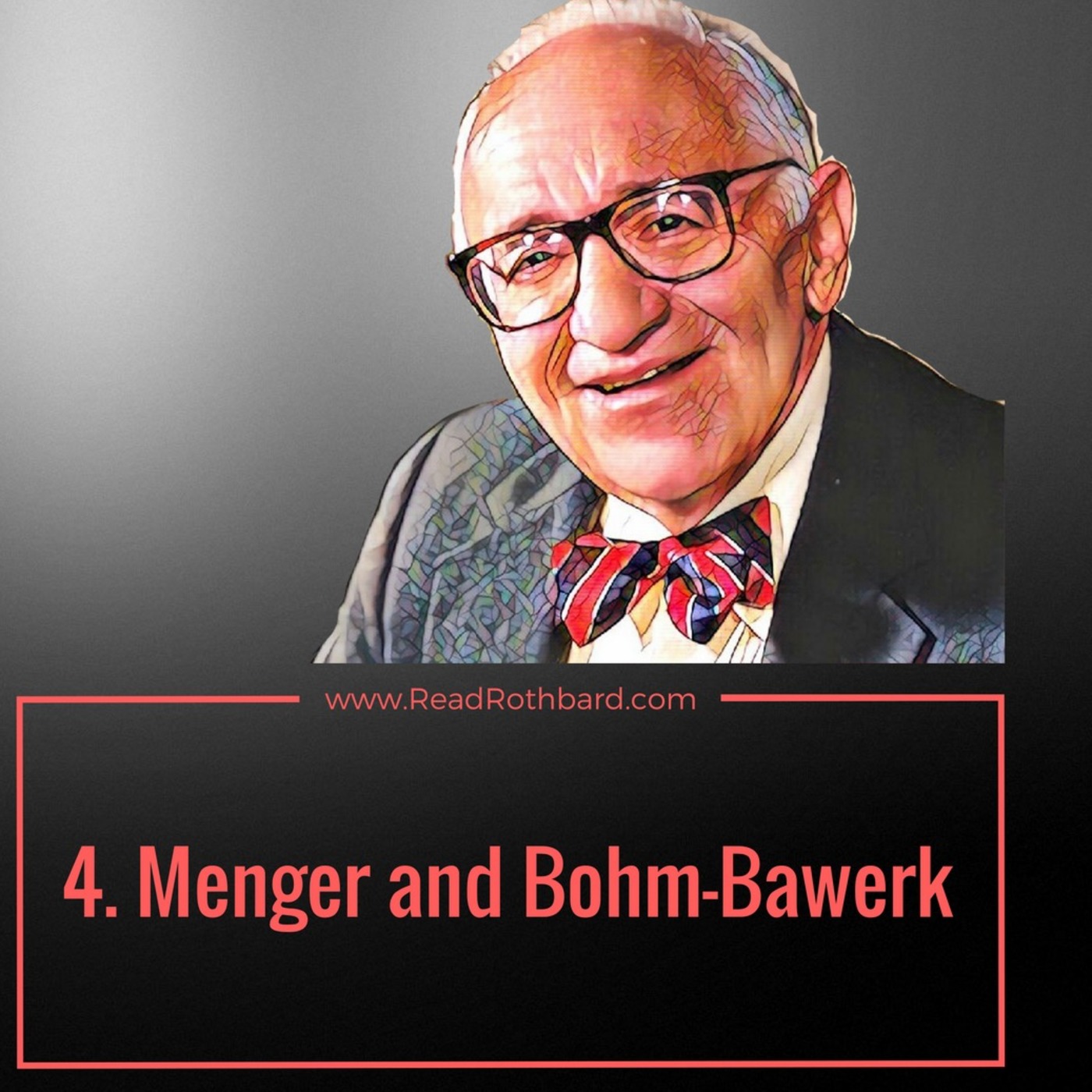
Enemy of the State: Murray RothbardEpisode 38 - History of Economic Thought - 4 of 6 - Menger and Böhm-Bawerk - Murray N RothbardMurray Rothbard died before he could write the third volume of his famous History of Economic Thought, which would cover the birth and development of the Austrian School, through the Keynesian Revolution and Chicago School. With this six-lecture course, however, the History of Economic Thought is complete.
4. Menger and Böhm-Bawerk
Carl Menger, 1840-1921, founded Austrian economics. Eugen von Bohm-Bawerk was the most important student. Weiser was his brother-in-law, but was fairly pre-Keynesian. Mises was the great successor to Bohn-Bawerk.
With Adam Smith, and with especially Riccardo, we shift toward the theory which still plagues us to the present day – nam...
2017-01-141h 11
The Read Rothbard PodcastEpisode 34 - Rat-a-shooty (1:02:42)We compare and contrast Disney/Pixar's Ratatouille and Morgan Spurlock's Rats from a non-aggression principled stance. Do not watch the Spurlock movie before the Pixar movie - as it changes the whole thing. Are sentient rats capable of understanding property rights; can they steal? Are we justified in setting traps or shooting them? We discuss these topics and more on this episode. Enjoy!
For show notes and more, please visit:
http://www.readrothbard.com/episode-34
Presented by Read Rothbard:
Read Rothbard is comprised of a small group of voluntaryists who are fans of Murray N. Rothbard. We curate content...
2017-01-141h 02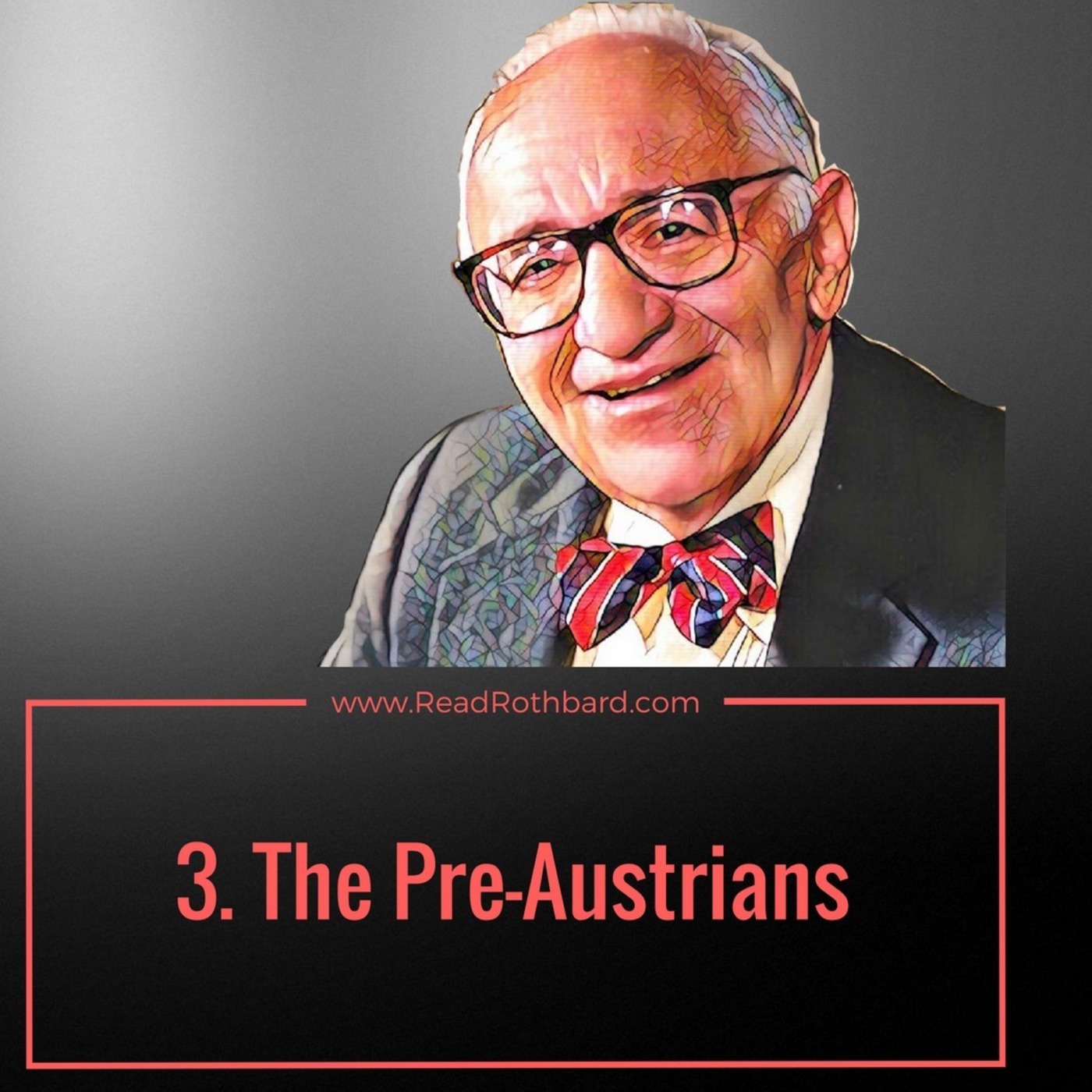
Enemy of the State: Murray RothbardEpisode 37 - History of Economic Thought - 3 of 6 - The Pre Austrians - Murray N RothbardMurray Rothbard died before he could write the third volume of his famous History of Economic Thought, which would cover the birth and development of the Austrian School, through the Keynesian Revolution and Chicago School. With this six-lecture course, however, the History of Economic Thought is complete.
3. The Pre Austrians
Richard Cantillon was quite Misesian before Mises. He wrote of utility theory and the entrepreneur’s uncertainty in the 1970s. Cantillon was a great money practitioner. He became a bank and banker to the Jacobite Stuart line and to John Law who launched paper money inflation.
Turgot became finance minister in...
2017-01-121h 11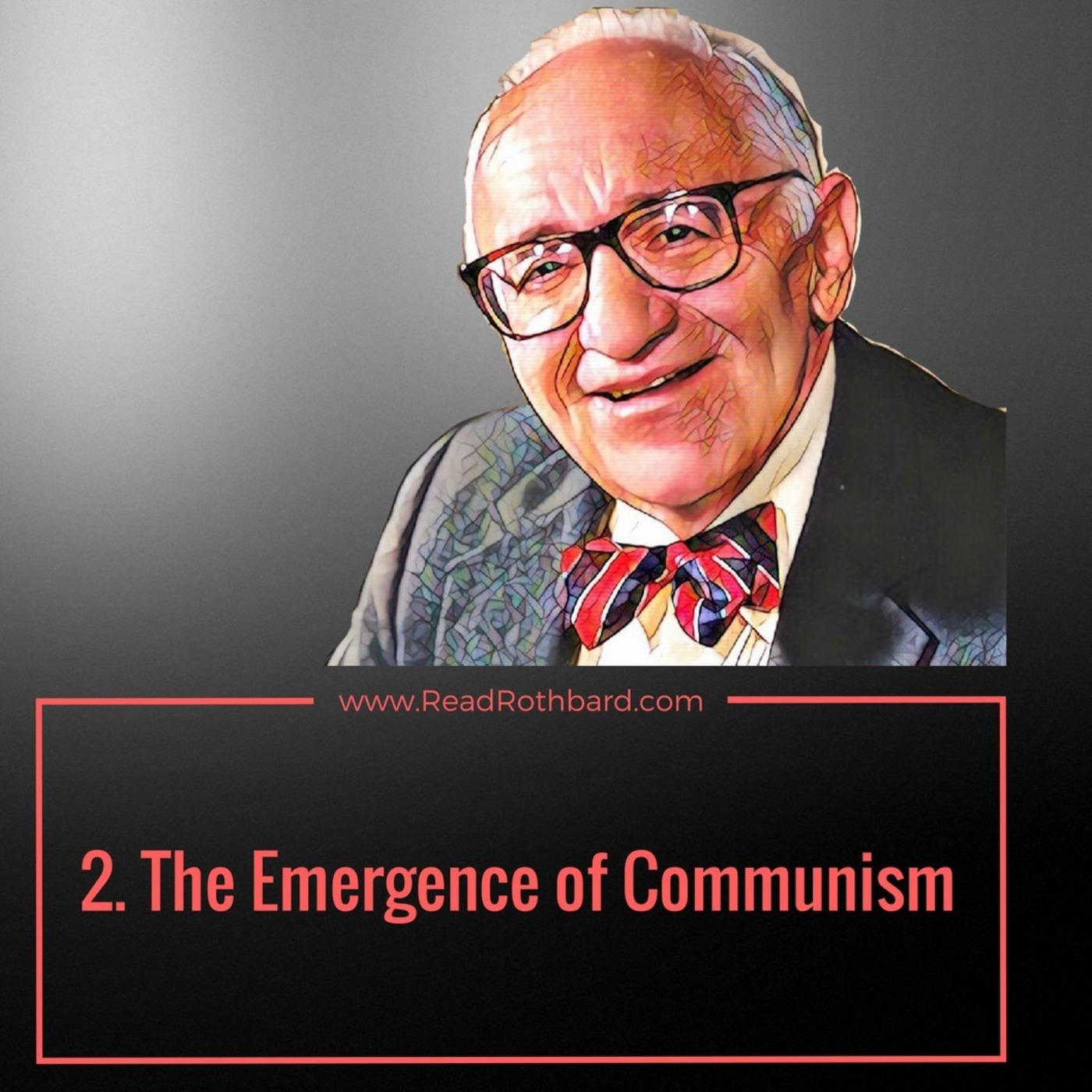
Enemy of the State: Murray RothbardEpisode 36 - History of Economic Thought - 2 of 6 - The Emergence of Communism - Murray N RothbardMurray Rothbard died before he could write the third volume of his famous History of Economic Thought, which would cover the birth and development of the Austrian School, through the Keynesian Revolution and Chicago School. With this six-lecture course, however, the History of Economic Thought is complete.
2. The Emergence of Communism
The roots of Marxism were in messianic communism. Marx’s devotion to communism was his crucial point. Violent, worldwide revolution, in Marx’s version made by the oppressed proletariat, would be the instrument of the advent of his millennium, communism.
All visions of communism include certain features. Private property is e...
2017-01-101h 11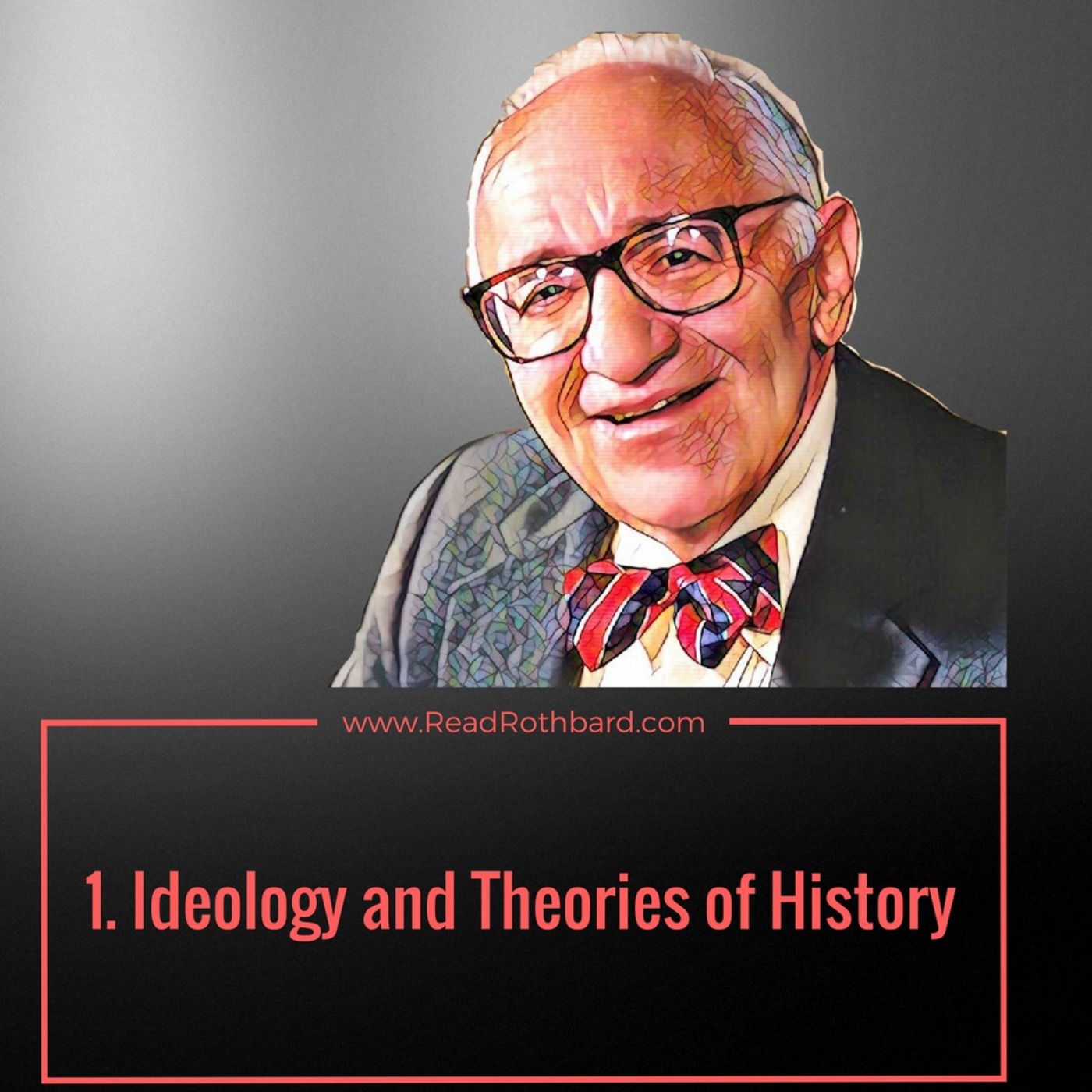
Enemy of the State: Murray RothbardEpisode 35 - History of Economic Thought - 1 of 6 - Ideology and Theories of History - Murray N RothbardMurray Rothbard died before he could write the third volume of his famous History of Economic Thought, which would cover the birth and development of the Austrian School, through the Keynesian Revolution and Chicago School. With this six-lecture course, however, the History of Economic Thought is complete.
1. Ideology and Theories of History
History is not an inevitable march upward, as concluded in the 1830s. That determinist view put the stamp of approval on everything past and present. It permeates economic history. It ignores the great moral choices. History is a race between state power and social power.
The Whig theory...
2017-01-071h 06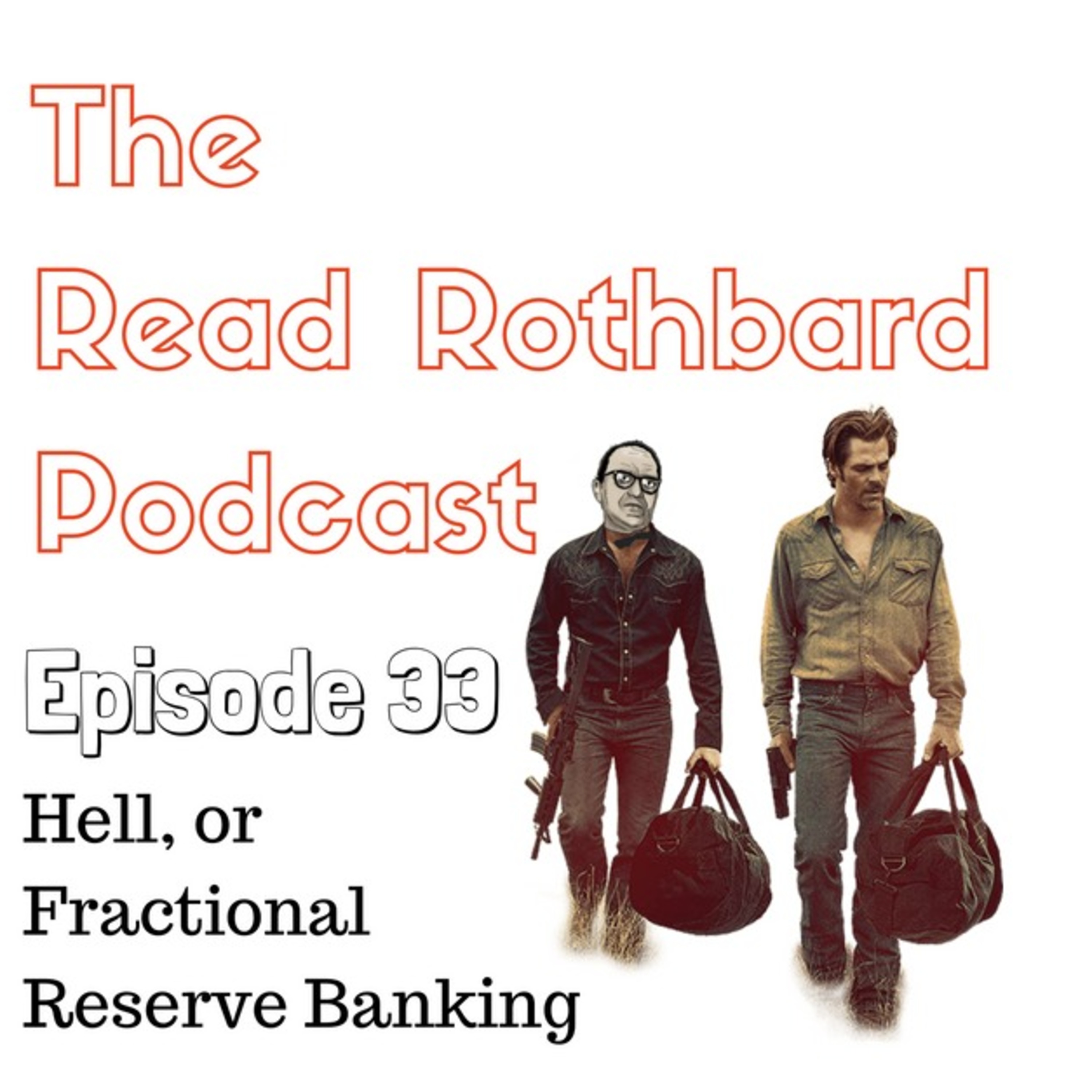
The Read Rothbard PodcastEpisode 33 - Hell or Fractional Reserve Banking (53:01)We talk about the film "Hell or High Water" starring Chris Pine, Jeff Bridges and Ben Foster. It's a 2016 heist film centered on two brothers who rob the bank that their family owe their mortgage to. Oil was recently discovered on the property, but they are at risk of losing the ranch within a few days. They resort to this elaborate bank robbery plan to save the ranch and secure the oil money for their children. No NAP violations here right?!?! We discuss a giant plot hole and a bit about the 2008 financial crisis and fractional reserve lending.
For...
2017-01-0653 min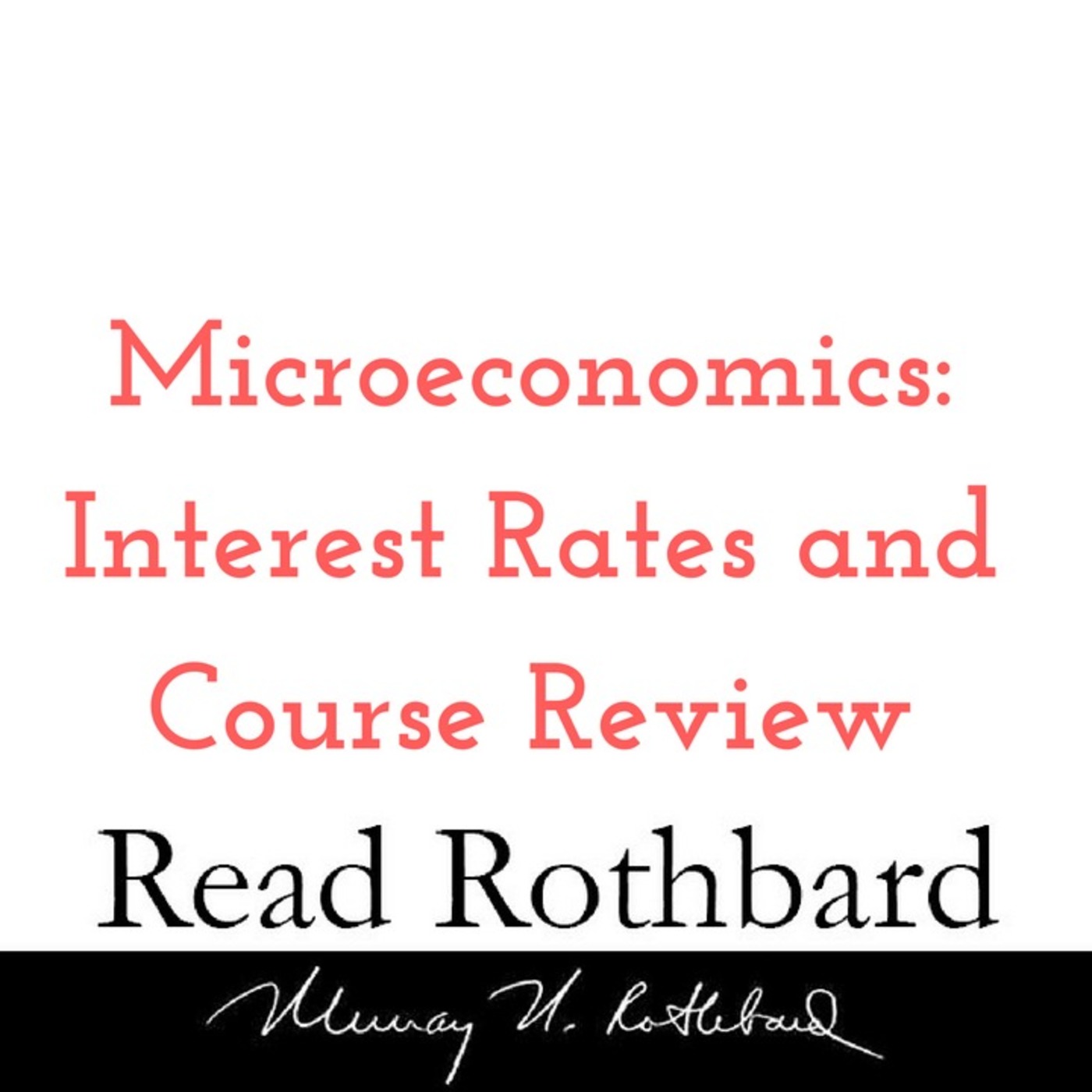
Enemy of the State: Murray RothbardEpisode 34 - Introduction to Microeconomics - 14 of 14 Interest Rates and Course Review - Murray N RothbardINTRODUCTION TO MICROECONOMICS
Presented by Murray N. Rothbard in 1986 at New York Polytechnic University. Recorded by Hans-Hermann Hoppe.
14. Intro to Micro: Interest Rates and Course Review
The time market determines the pure rate of interest. Price per unit of time may be wages or rent. The interest income will be earned by the capitalist who has assumed the task of advancing present money. The capitalist then waits for five years until the product matures before recouping his money.
Part 14 of 14. Presented in 1986 at New York Polytechnic University.
This lecture on YouTube: https://youtu.be/0gXHFLWN4UE
Sourced from: https://mises...
2017-01-051h 01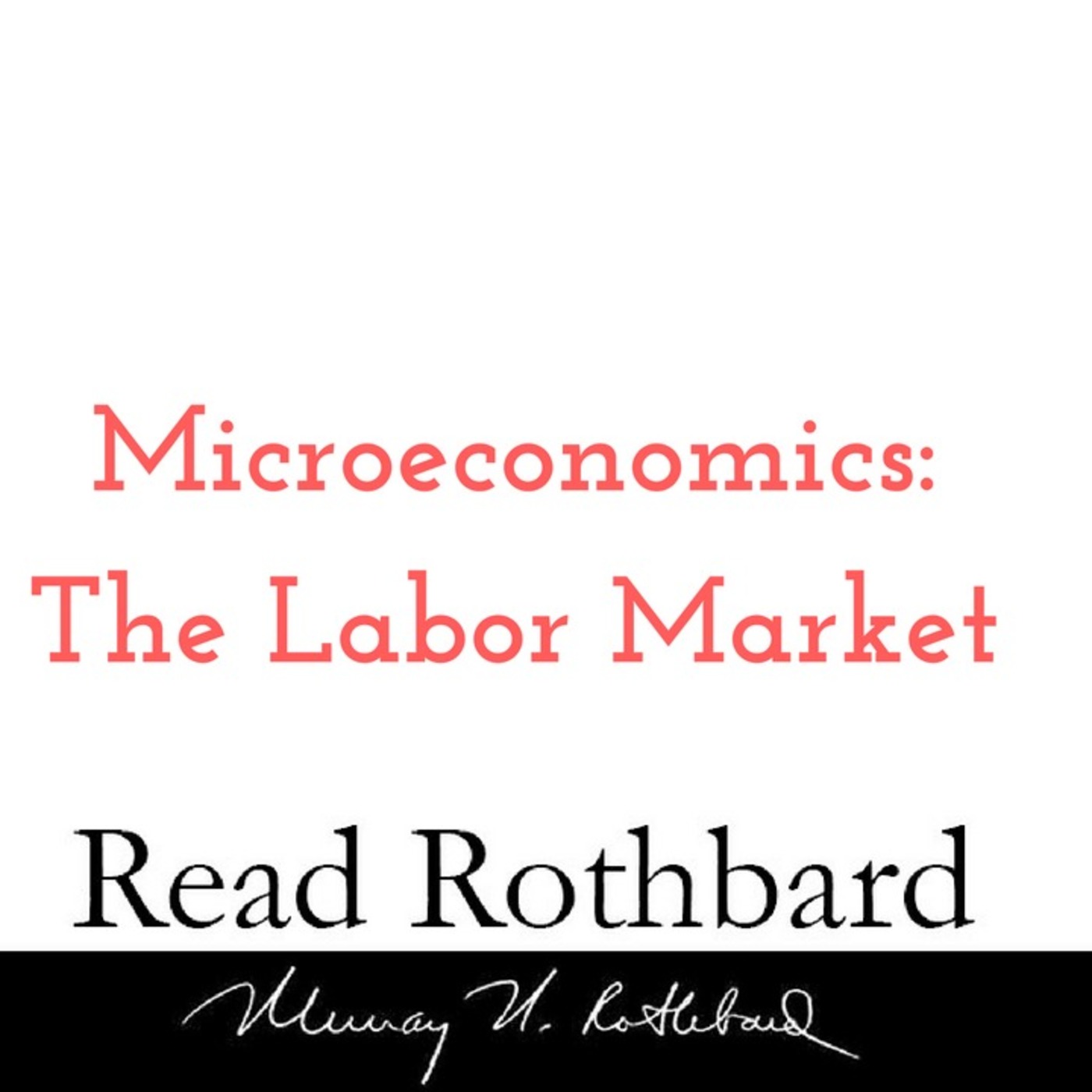
Enemy of the State: Murray RothbardEpisode 33 - Introduction to Microeconomics - 13 of 14 - The Labor Market - Murray N RothbardINTRODUCTION TO MICROECONOMICS
Presented by Murray N. Rothbard in 1986 at New York Polytechnic University. Recorded by Hans-Hermann Hoppe.
13. Intro to Micro: The Labor Market
Economists can say little about population and its size, despite the gloomy views of Malthus. More people are a good thing because of the division of labor. Living standards are higher when populations are higher. Living standards are higher when populations are denser. When people voluntarily reduce births, average population age rises. Many of the poorest areas of the world are low density, e.g. Africa and interior Brazil.
Part 13 of 14. Presented in 1986 at New York...
2017-01-0433 min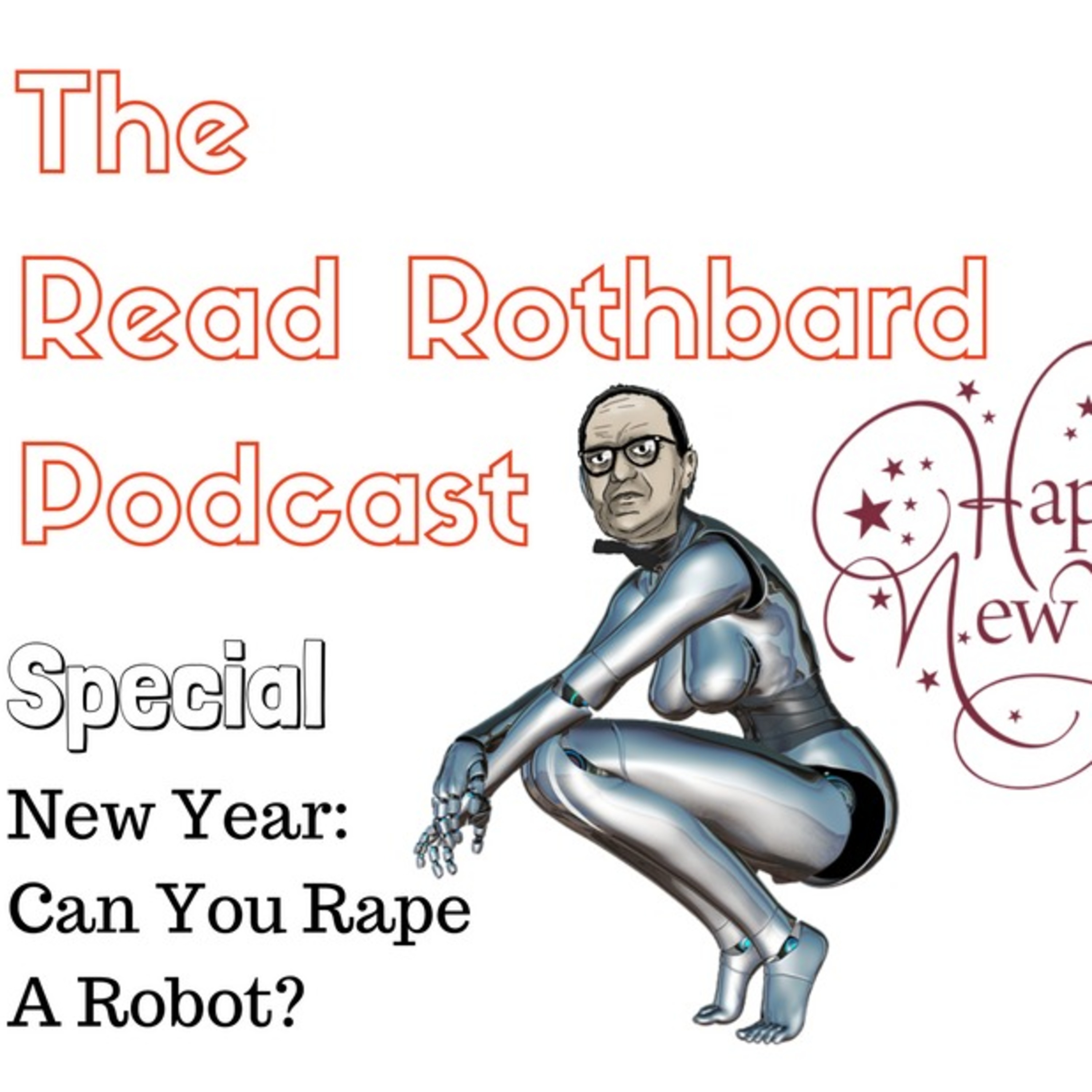
The Read Rothbard PodcastSpecial - Happy New Year - Can You Rape a Robot?Hoppe New Year! We discuss the movie Ex Machina and the implications of AI in regards to NAP, Property Rights, Self-Defense and a myriad of other issues.
Our first non-family member guest, Liam Cardenas, joins us for a lively discussion that spans just over an hour.
You can check out Liam's blog over at: https://ljc.io/
We hope you enjoy this one and here's to the best to come in 2017!
For Show Notes and more, please visit:
http://www.readrothbard.com/Special-Happy-New-Year
Presented by Read Rothbard:
Read Rothbard is comprised of a small group of voluntaryists who are...
2016-12-311h 14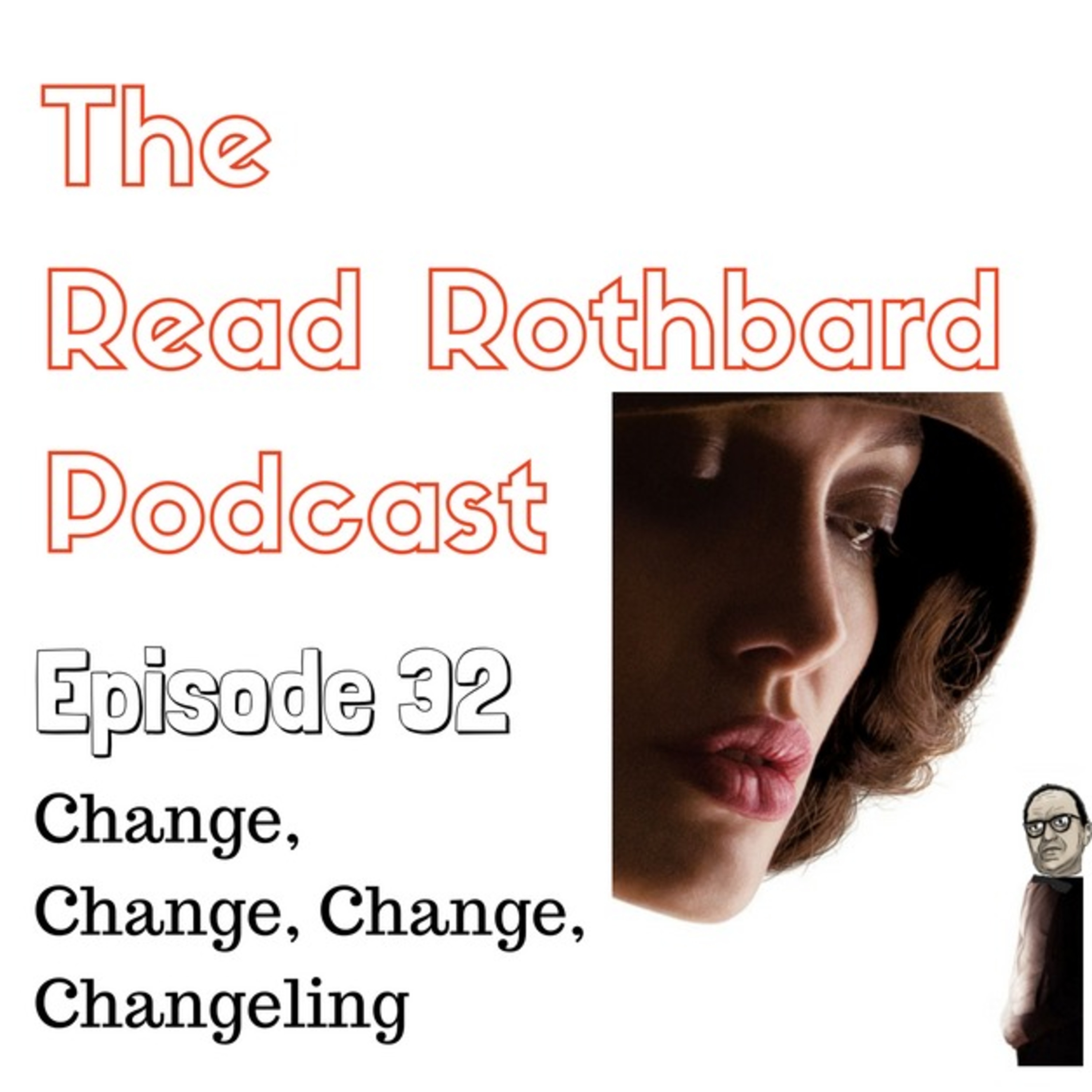
The Read Rothbard PodcastEpisode 32 - Change, Change, Change, ChangelingWe discuss the Clint Eastwood directed film Changeling starring Angelina Jolie and feature our very first guest! My wife jumps on the call near the end to offer her thoughts on the film where we discuss morality, police corruption, feminism, raising children and much more on this final episode of 2016. Enjoy!
Take advantage of the Tom Woods Liberty Classroom deal expiring midnight tonight (Dec 30th)! Go to: www.ReadRothbard.com/libertyclassroom
This episode on YouTube: https://youtu.be/5DMhfO1j8JE
For Show Notes and more, please visit: www.ReadRothbard.com/Episode-32
Presented by Read Rothbard:
Read Rothbard is...
2016-12-311h 00
Enemy of the State: Murray RothbardEpisode 32 - Introduction to Microeconomics - 12 of 14 - Labor and Unions - Murray N RothbardINTRODUCTION TO MICROECONOMICS
Presented by Murray N. Rothbard in 1986 at New York Polytechnic University. Recorded by Hans-Hermann Hoppe.
(*Note - This episode was previously posted as: Episode 16 - Economics 101 - 5 of 8 - Labor and Unions - Murray N Rothbard)
12. Intro to Micro: Labor and Unions
In order for anyone to make ethical judgments, he must know the consequences of his various actions. In questions of union actions displacement or unemployment for oneself or others will be considered unfortunate by most people. Once understood, far fewer people will be prounion or hostile to nonunion competitors. Unions lower the marginal productivity of...
2016-12-291h 27
The Read Rothbard PodcastA Very Murray Christmas CarolMurray Christmas! We discuss Charles Dickens and his holiday story A Christmas Carol and how it is an anti-capitalist, anti-industrial revolution propaganda piece used to argue for additional government interventions. From the anecdotal testimony that is used to play on emotion vs. the reality of actual improvement in living standard (so long as they are voluntarily working in the factories, it is an improvement over their prior alternatives), the enclosure movement, corn laws, etc...So, we pretty much ruin your holiday story with this one....and, there is no Santa Claus! Enjoy!
For show notes and more, please visit...
2016-12-2444 min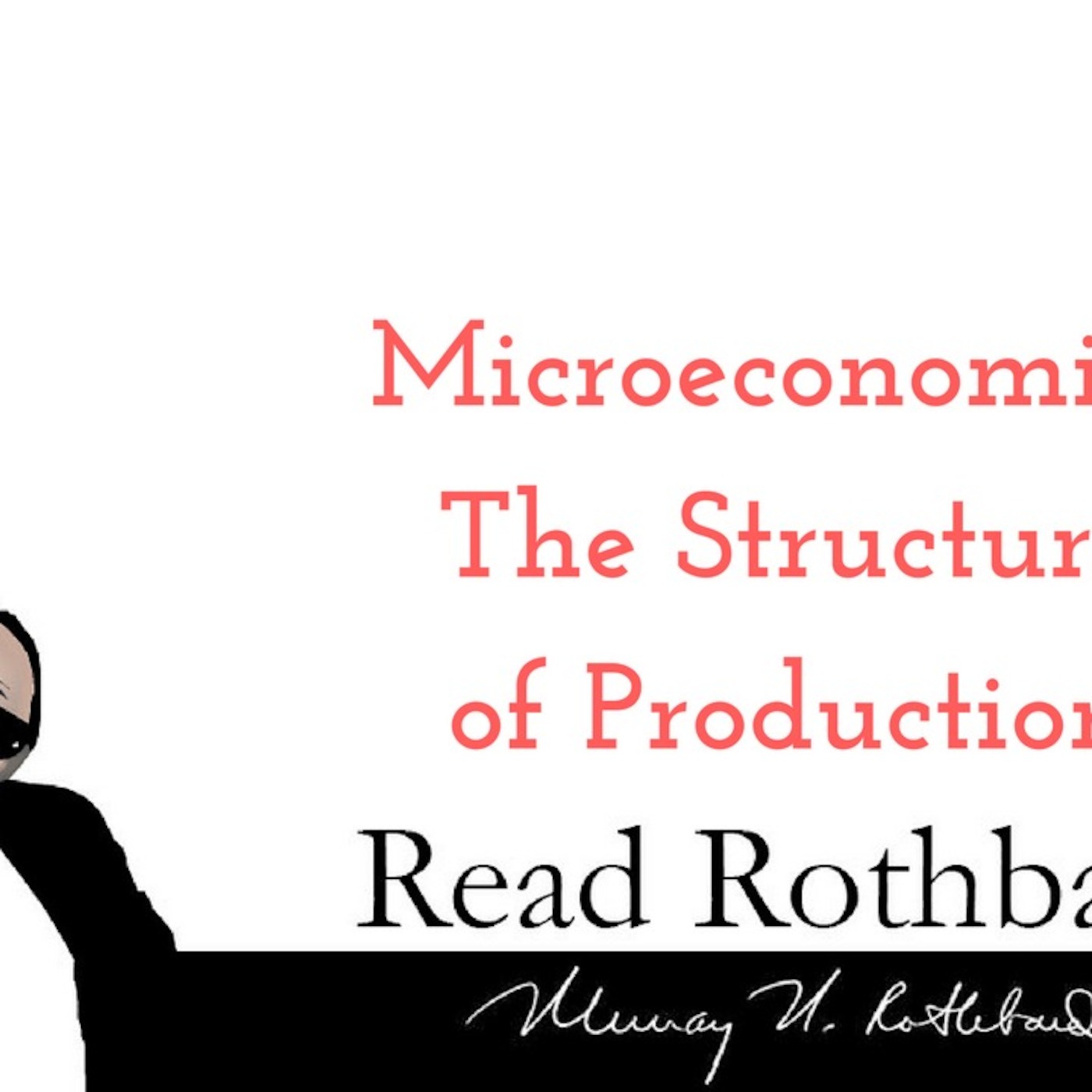
Enemy of the State: Murray RothbardEpisode 31 - Introduction to Microeconomics - 11 of 14 - The Structure of Production - Murray N RothbardINTRODUCTION TO MICROECONOMICS
Presented by Murray N. Rothbard in 1986 at New York Polytechnic University. Recorded by Hans-Hermann Hoppe.
11. Intro to Micro: The Structure of Production
As factors of production, supply and demand of labor, land and capital will determine how much the producer will get out of this process. This process occurs in different stages. In the earlier or higher stages, producers' goods must be produced that will later cooperate in producing other producers' goods that will finally co-operate in producing the desired consumers' goods. The consumers' good is valued because it is consumed - directly satisfying man's ends.
Part 11...
2016-12-2259 min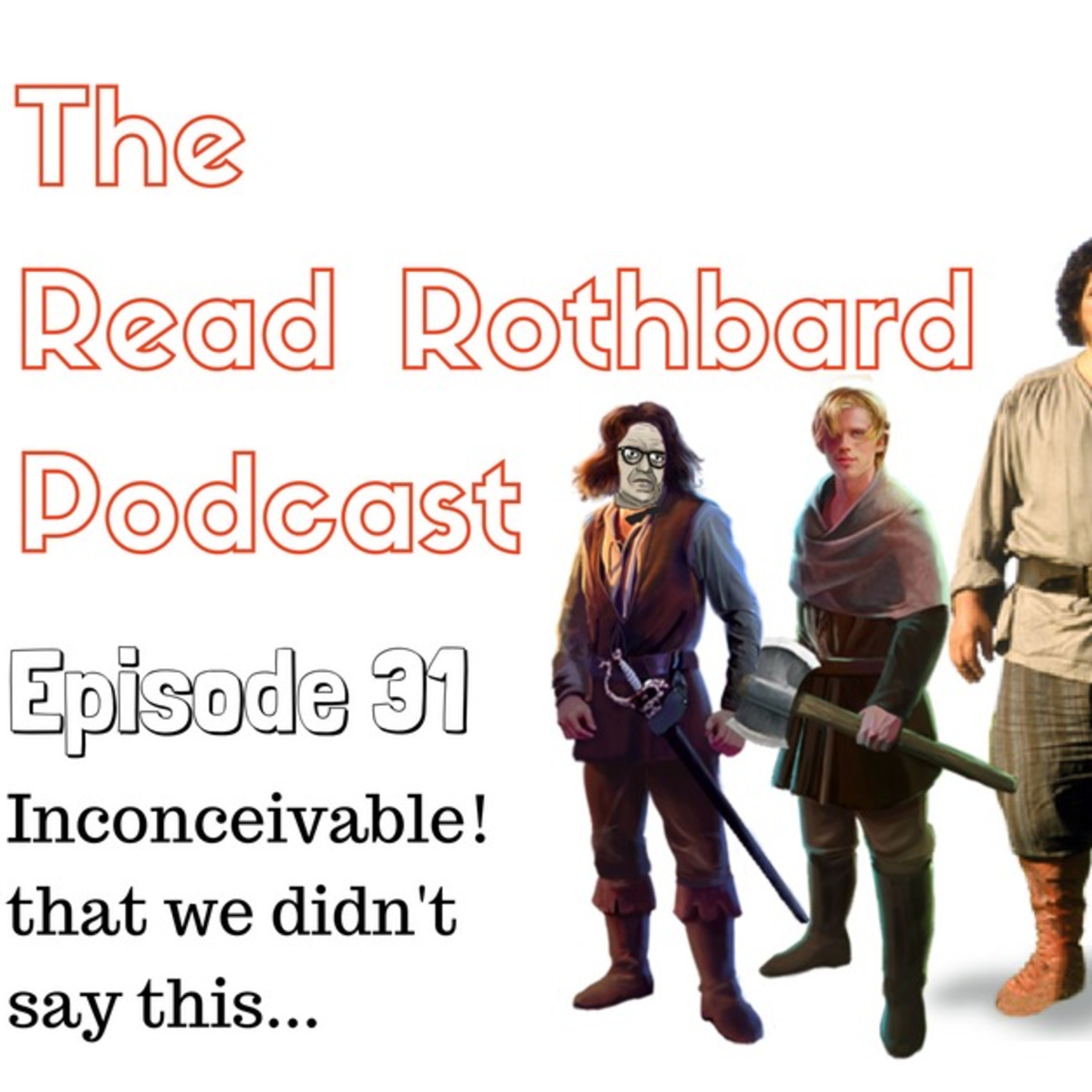
The Read Rothbard PodcastEpisode 31 - Inconceivable!We didn't say the word Inconceivable while discussing the great Princess Bride movie, which is in itself inconceivable. Robert lists this as one of his favorite movies and we endeavor to pack a few libertarian messages into this familiar story. Also, spoiler alert, I make a mistake on a word definition that Robert is correct on - and I smugly, and incorrectly, try to correct him. Oh well. We hope you enjoy the show!
For show notes and more: http://www.readrothbard.com/Episode-31
This episode on YouTube:
Presented by Read Rothbard:
Read Rothbard is comprised of a small...
2016-12-221h 07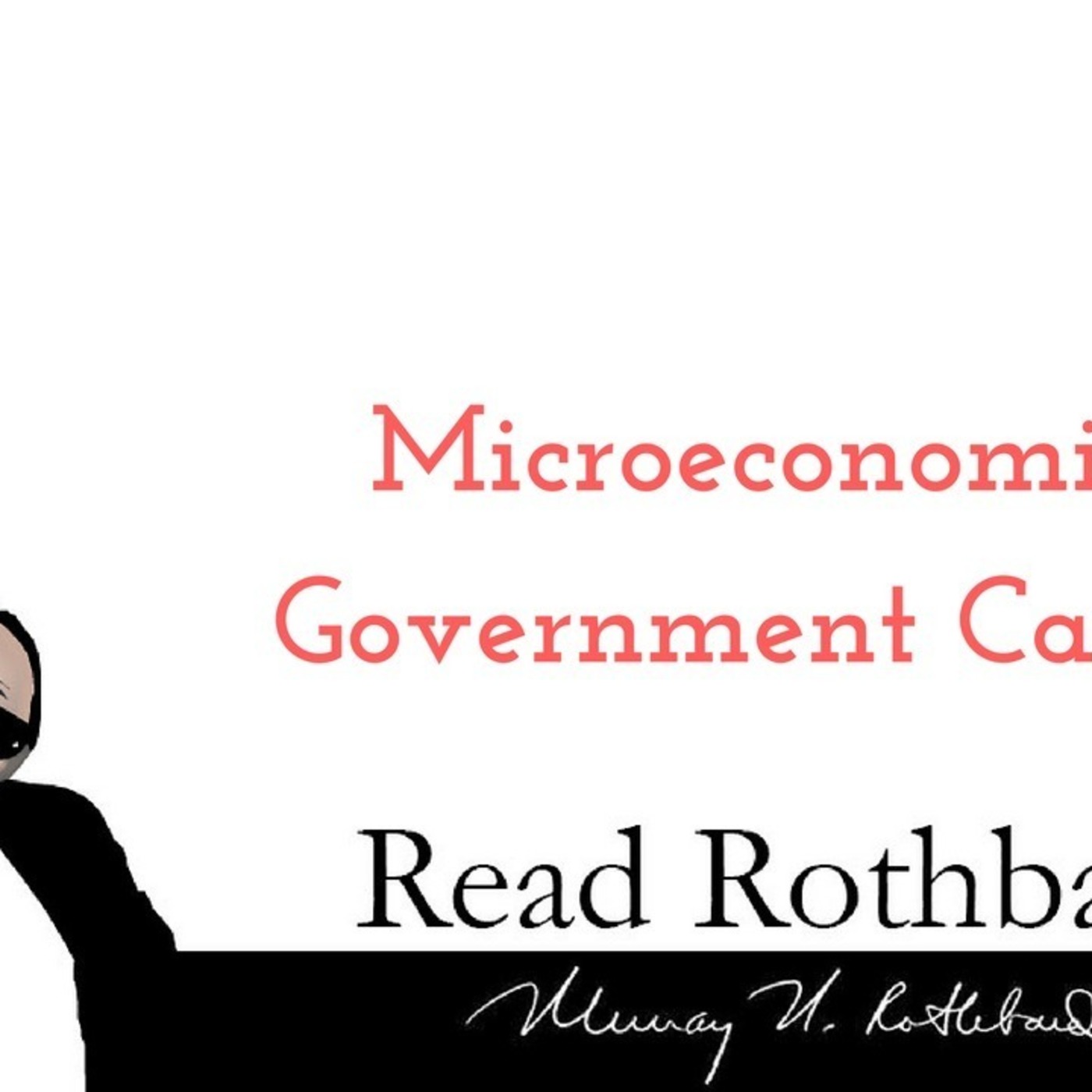
Enemy of the State: Murray RothbardEpisode 30 - Introduction to Microeconomics - 10 of 14 - Government Cartels - Murray N RothbardINTRODUCTION TO MICROECONOMICS
Presented by Murray N. Rothbard in 1986 at New York Polytechnic University. Recorded by Hans-Hermann Hoppe.
10. Intro to Micro: Government Cartels
The only cartels that have lasted have been government cartels. There is no essential difference between a cartel and an ordinary corporation or partnership. Not even the De Beers cartel is all powerful. The South African government nationalizes all land upon which diamonds are discovered. The government only licenses De Beers to work the mines; they shoot others. New York cabs are cartels. Farm price supports are cartelized agriculture.
Part 10 of 14. Presented in 1986 at New York Polytechnic...
2016-12-2158 min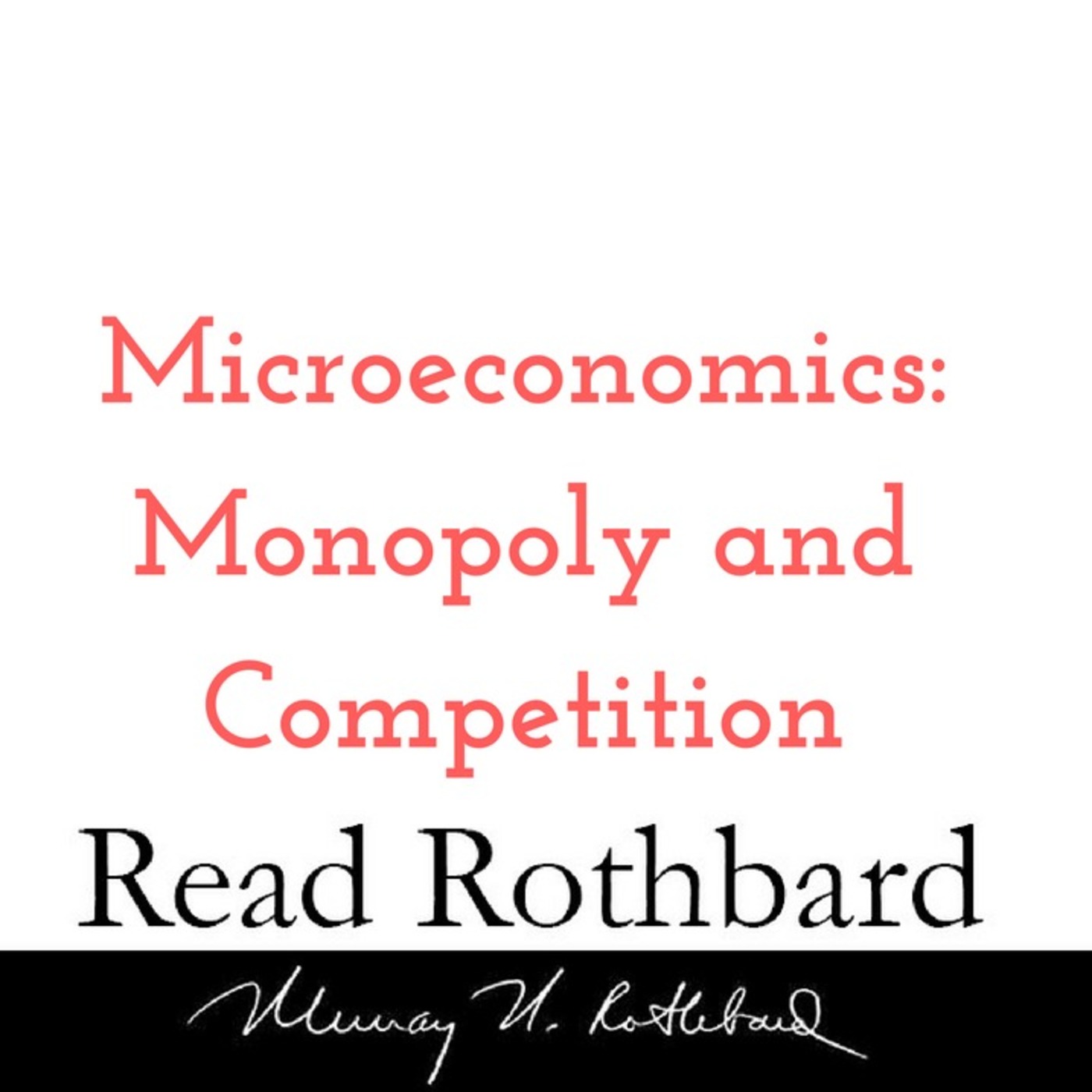
Enemy of the State: Murray RothbardEpisode 29 - Introduction to Microeconomics - 9 of 14 - Monopoly and Competition - Murray N RothbardINTRODUCTION TO MICROECONOMICS
Presented by Murray N. Rothbard in 1986 at New York Polytechnic University. Recorded by Hans-Hermann Hoppe.
9. Intro to Micro: Monopoly and Competition
The words monopoly and competition have been changed. Competition meant rivalry or competing, either active or potential. Businesses do not like this. Monopoly meant a grant of privilege by the government. It now means a falling demand curve. Government creates crazy regulations and the market works to get around them. Cheaper consumer products are better. It's difficult to sustain quotas - cartel agreements; everybody cheats. Cartels break up in the free market unless government intervenes and...
2016-12-2156 min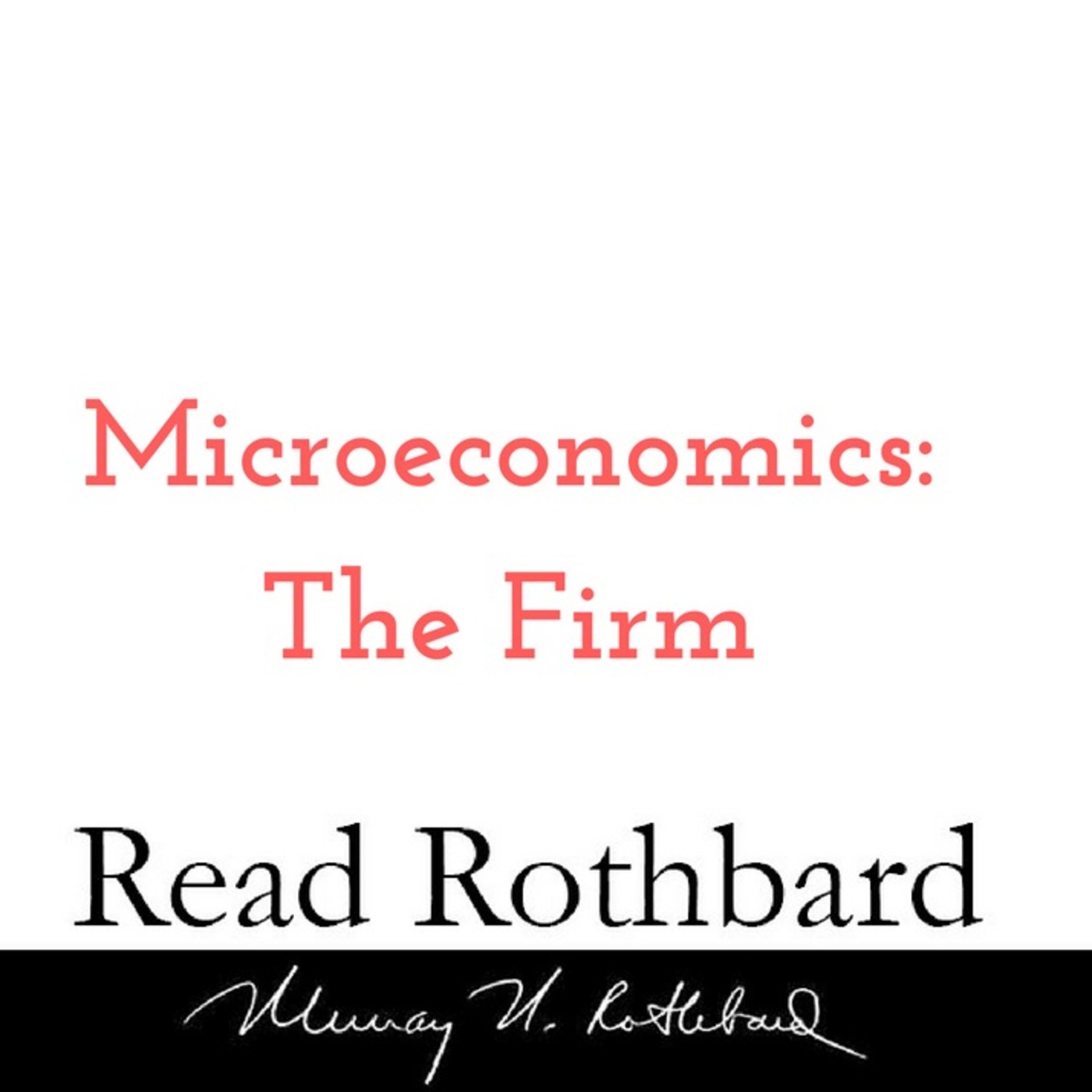
Enemy of the State: Murray RothbardEpisode 28 - Introduction to Microeconomics - 8 of 14 - The Firm - Murray N RothbardINTRODUCTION TO MICROECONOMICS
Presented by Murray N. Rothbard in 1986 at New York Polytechnic University. Recorded by Hans-Hermann Hoppe.
8. Intro to Micro: The Firm
Business men must make sure they can cover their costs by incoming revenue. The production function will yield a certain quantity of a product. The firm considers marginal costs and average costs to weigh where along the demand curve production is. Average revenues less average costs multiplied by quantity will reflect profits (or losses) for the firm. Every firm (not industry) will always be where the demand curve is elastic. Perfect and pure competition is where the...
2016-12-1952 min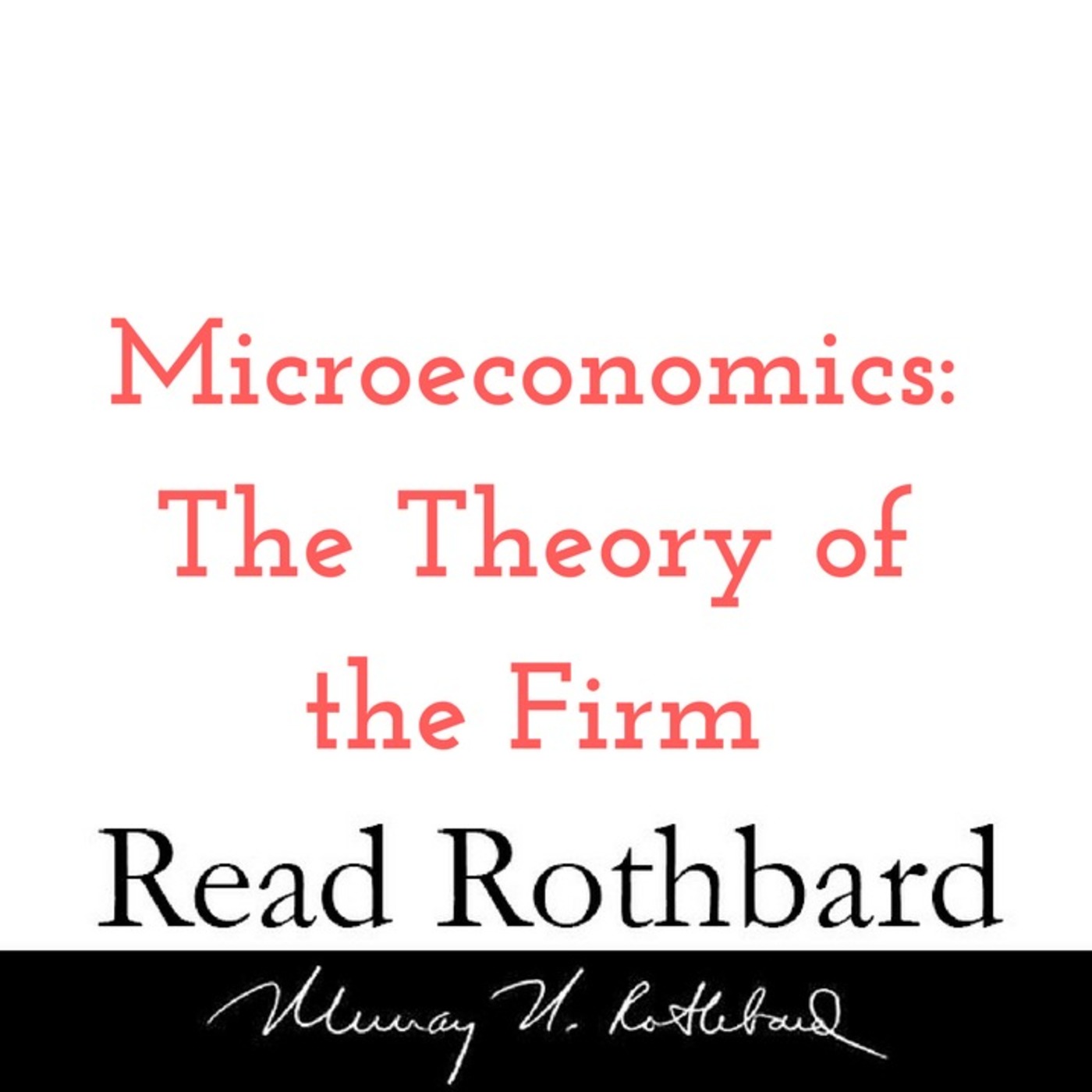
Enemy of the State: Murray RothbardEpisode 27 - Introduction to Microeconomics - 7 of 14 - The Theory of the Firm - Murray N RothbardINTRODUCTION TO MICROECONOMICS
Presented by Murray N. Rothbard in 1986 at New York Polytechnic University. Recorded by Hans-Hermann Hoppe.
7. Intro to Micro: Mid-Term Review and The Theory of the Firm
The objective of the corporate firm is to maximize profits and avoid losses - the same objective of the free market. But the costs are paid out before the income comes in. Stockholders will sell stock to shake up the managers. Government firms - agencies - do not have shareholders and there are no shares to be sold.
Part 7 of 14. Presented in 1986 at New York Polytechnic University.
This lecture on YouTube...
2016-12-181h 16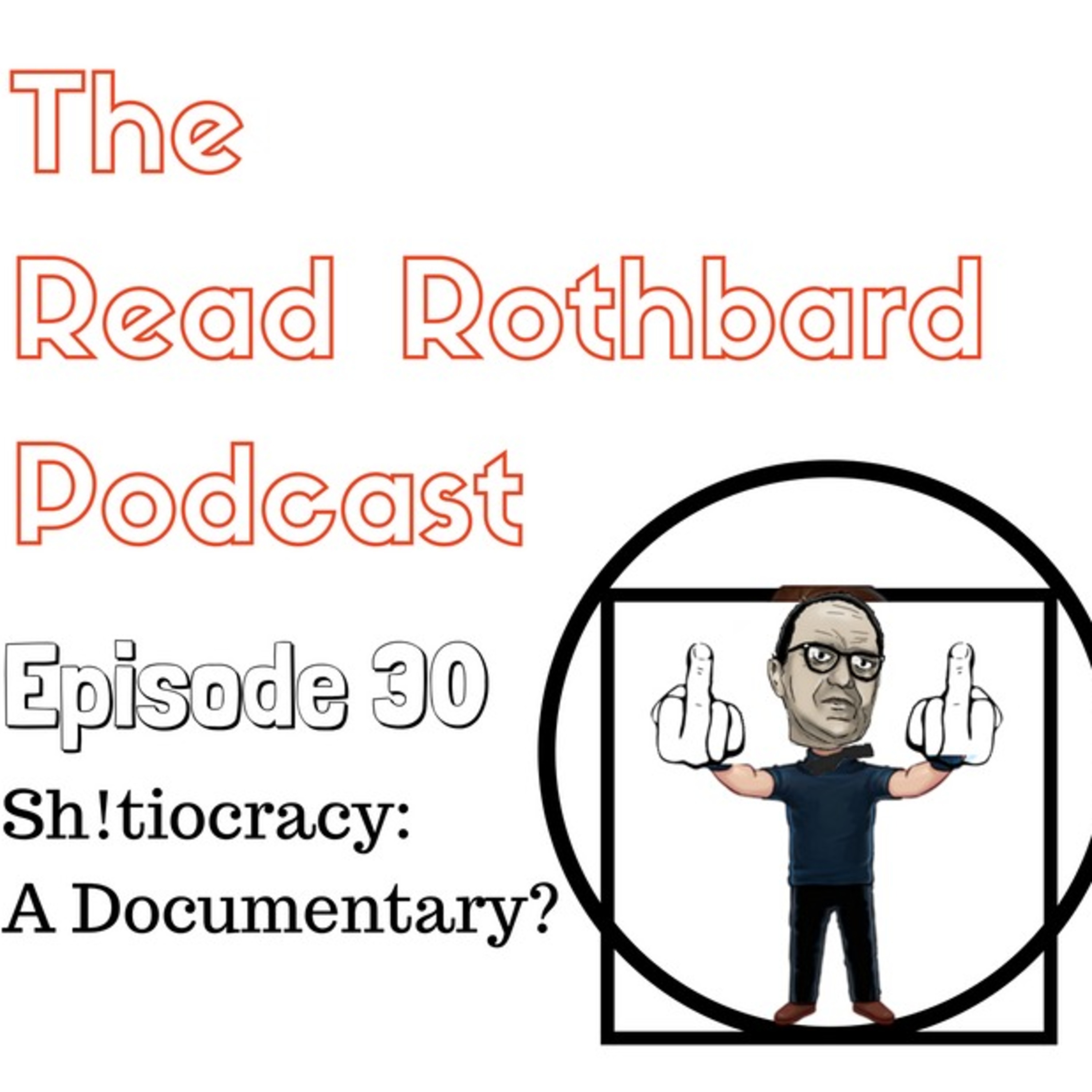
The Read Rothbard PodcastEpisode 30 - Sh!tiocracy: A Documentary? (1:20:49)We discuss the narrative that Idiocracy is currently viewed as a prescient documentary that foretold today's events regarding Trump being elected President. We argue that this may be true, but not in the way that they think. It is the echo-chamber of social media that allowed people to be blindsided to the Trump-phenomenon and the current attack on "fake news" is only going to double-down on the problem and compound it. This is a pretty fun one that feels like we really hit our stride.
Also, apparently I was not quite right about the water being the only thing...
2016-12-171h 20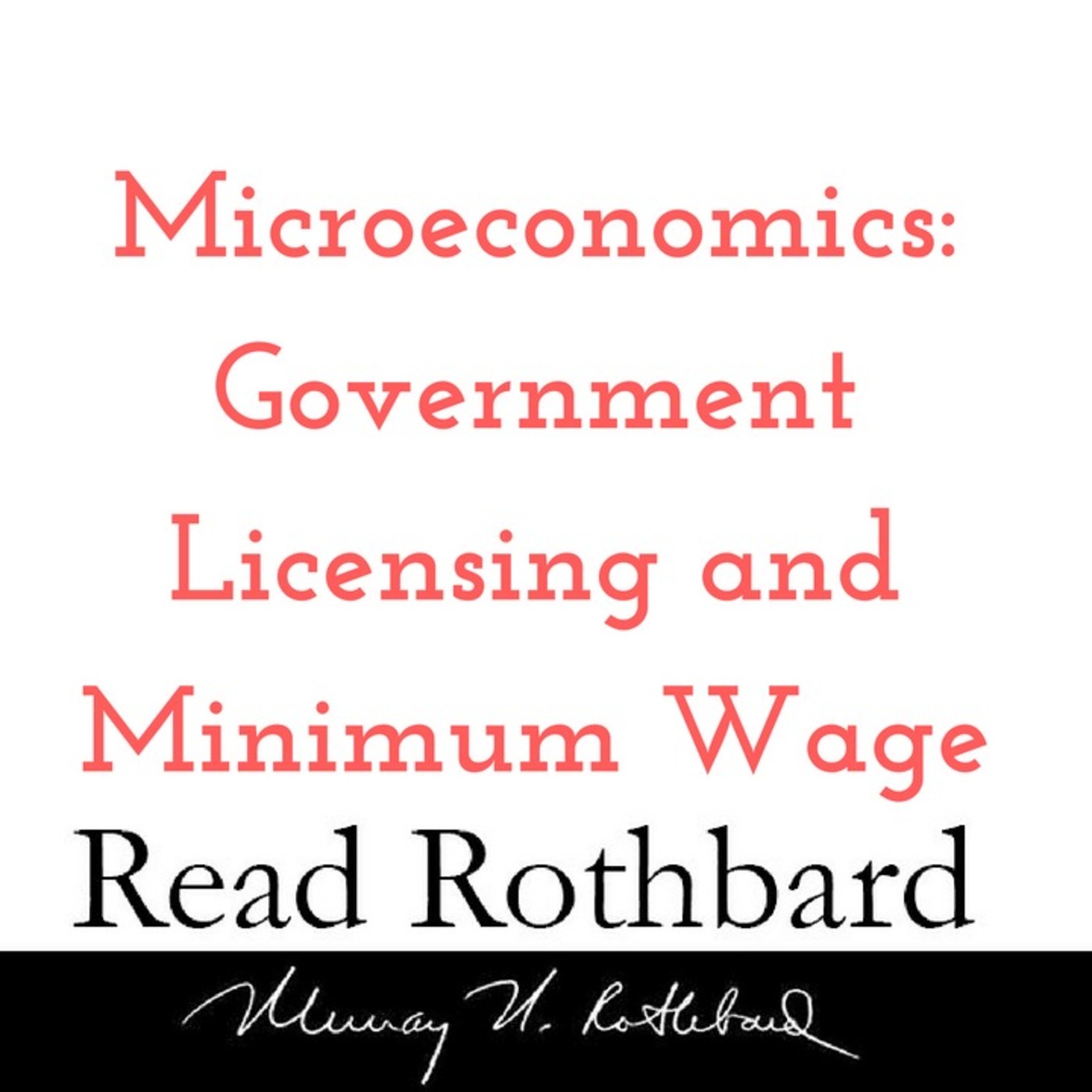
Enemy of the State: Murray RothbardEpisode 26 - Introduction to Microeconomics - 6 of 14 - Government Licensing and Minimum Wage - Murray N RothbardINTRODUCTION TO MICROECONOMICS
Presented by Murray N. Rothbard in 1986 at New York Polytechnic University. Recorded by Hans-Hermann Hoppe.
6. Intro to Micro: Government Licensing of Industry and Minimum Wage
The peanut butter crunch was in 1980. Crop acreage and production was cut down by 45% by government price support, import quotas, and cartelizing of the industry. The price of peanuts more than tripled. Farm price supports also keep cheese prices above market levels. The minimum wage law imposes a wage above the laborer's discounted marginal value product. The supply of labor exceeds the demand, and the unsold surplus of labor services means involuntary...
2016-12-161h 01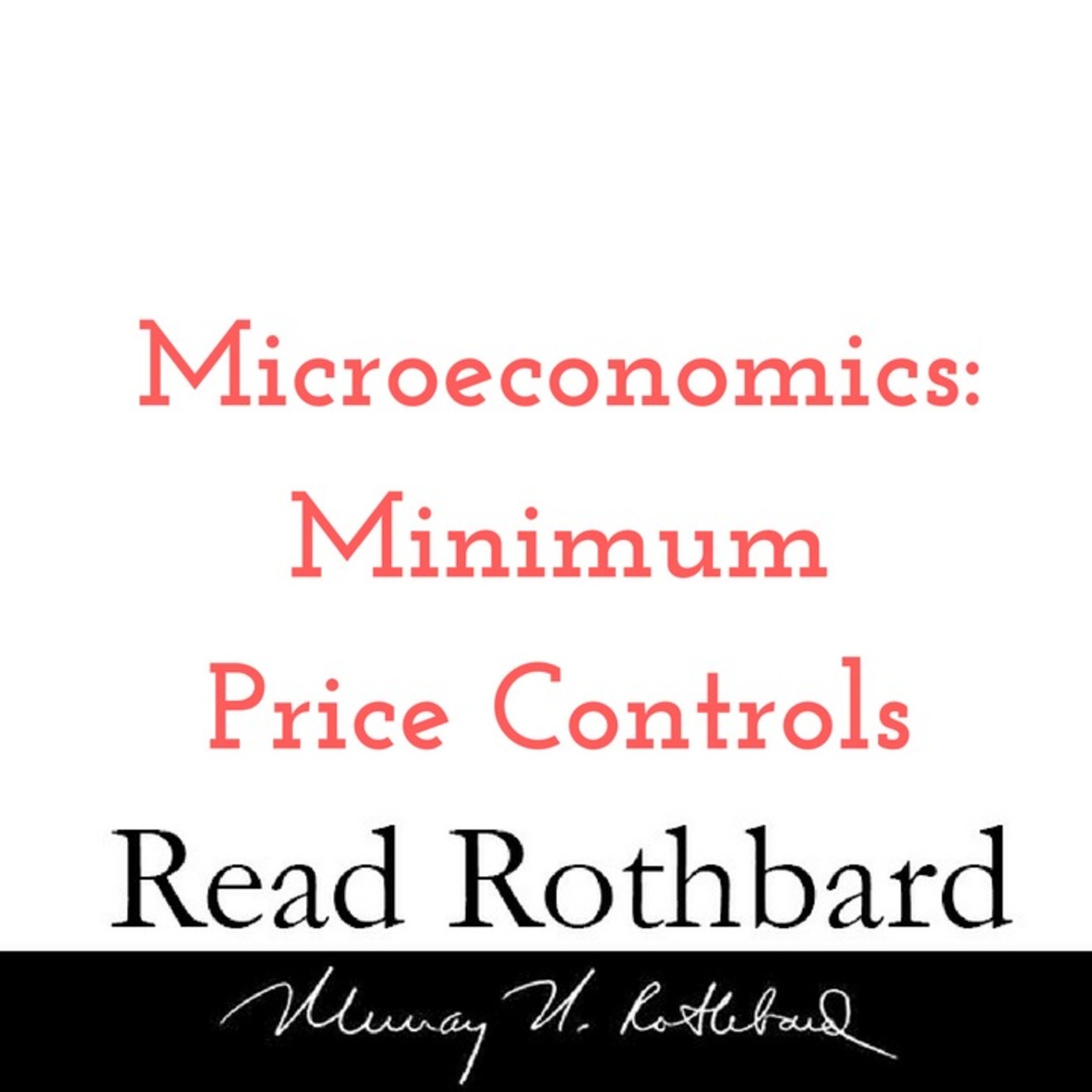
Enemy of the State: Murray RothbardEpisode 25 - Introduction to Microeconomics - 5 of 14 - Minimum Price Controls - Murray N RothbardINTRODUCTION TO MICROECONOMICS
Presented by Murray N. Rothbard in 1986 at New York Polytechnic University. Recorded by Hans-Hermann Hoppe.
5. Intro to Micro: Minimum Price Controls
Thou shalt not sell a certain product or service below a certain price, e.g. wheat, cotton, corn, cheese, sugar. This will result in an artificial unsold permanent surplus, as it does in the American farm situation. Initially resources are attracted into the field, but the artificially high price discourages buyer demand. This kind of interventionary tampering with market signals destroys the market tendency to adjustment and brings about losses and misallocation of resources in satisfying...
2016-12-1543 min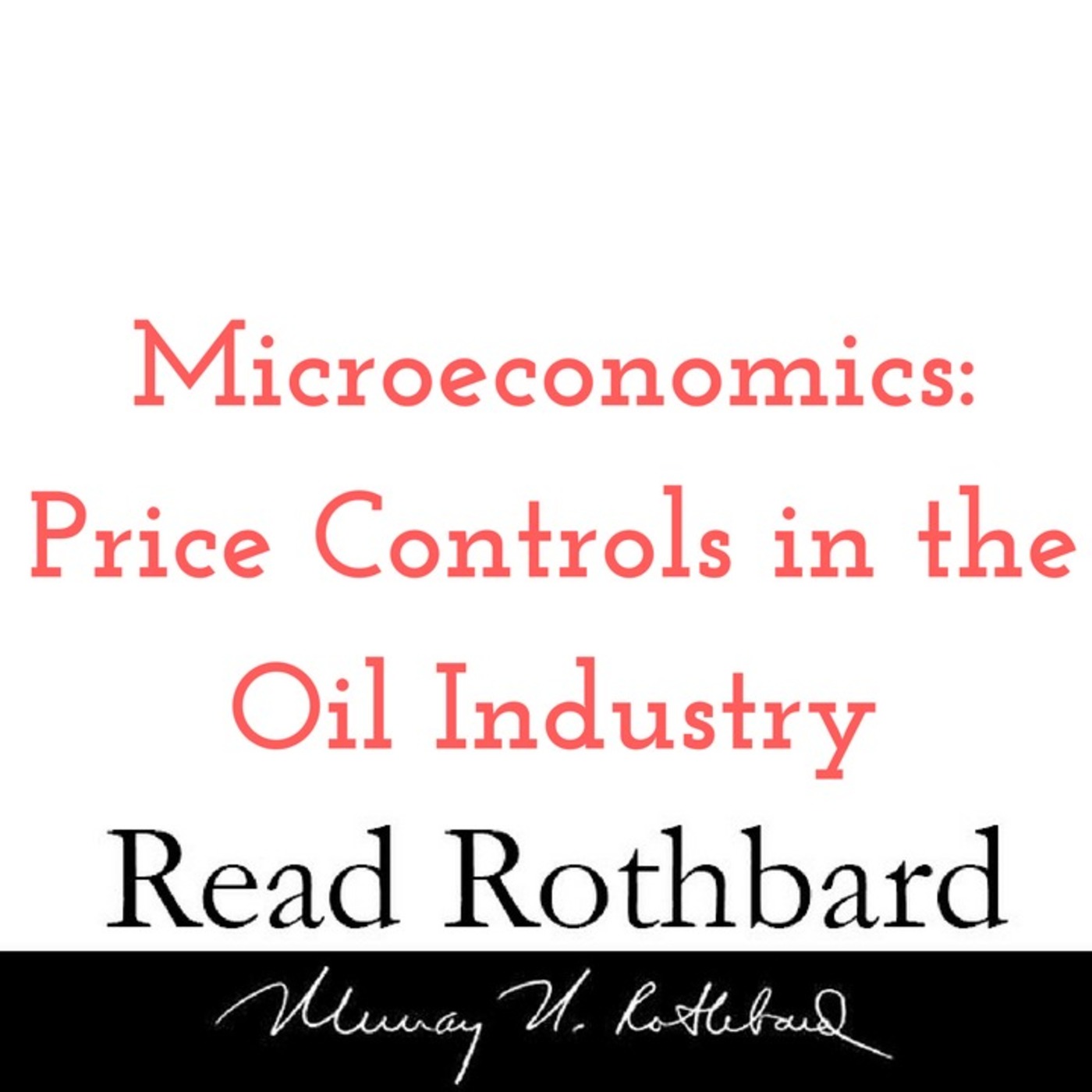
Enemy of the State: Murray RothbardEpisode 23 - Introduction to Microeconomics - 4 of 14 - Price Controls in the Oil Industry - Murray N RothbardINTRODUCTION TO MICROECONOMICS
Presented by Murray N. Rothbard in 1986 at New York Polytechnic University. Recorded by Hans-Hermann Hoppe.
4. Intro to Micro: Price Controls in the Oil Industry
The disappearance of oil has been forecast every decade. Prices were overlooked. When the price is high it is more profitable to look for oil. Total reserves on the ground are higher than they were in 1890. Treating demand as a fixed quantity, the oil industry tried to control production and prices. Gas rationing was implemented. 55 MPH limit was legislated without economic or safety benefit. Safety belts increased fatalities of pedestrians. Natural gas experienced...
2016-12-141h 07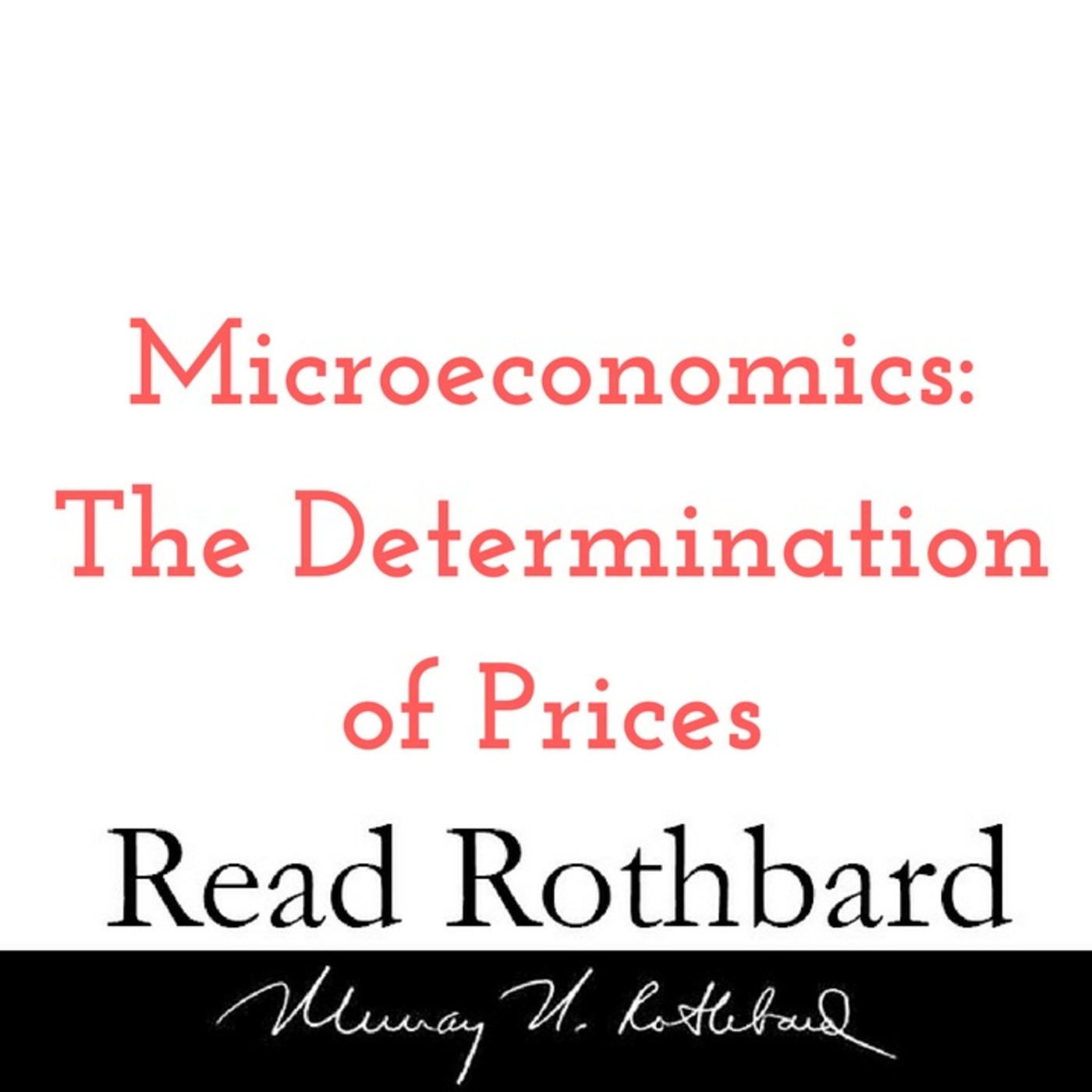
Enemy of the State: Murray RothbardEpisode 22 - Introduction to Microeconomics - 3 of 14 - The Determination of Prices - Murray N RothbardINTRODUCTION TO MICROECONOMICS
Presented by Murray N. Rothbard in 1986 at New York Polytechnic University. Recorded by Hans-Hermann Hoppe.
3. The Determination of Prices
Price is determined by the equilibrium price and the equilibrium quantity. If your good is not selling, you lower the price. If your goods fly off the shelves you are selling too cheaply and you raise prices. Demand changes constantly, e.g. the shift to white wines away from dark hard liquor. Prices will fall when demand falls.
Part 3 of 14. Presented in 1986 at New York Polytechnic University.
This lecture as a Podcast: http://enemyofthestate.podomatic.com/
Sourced from...
2016-12-121h 10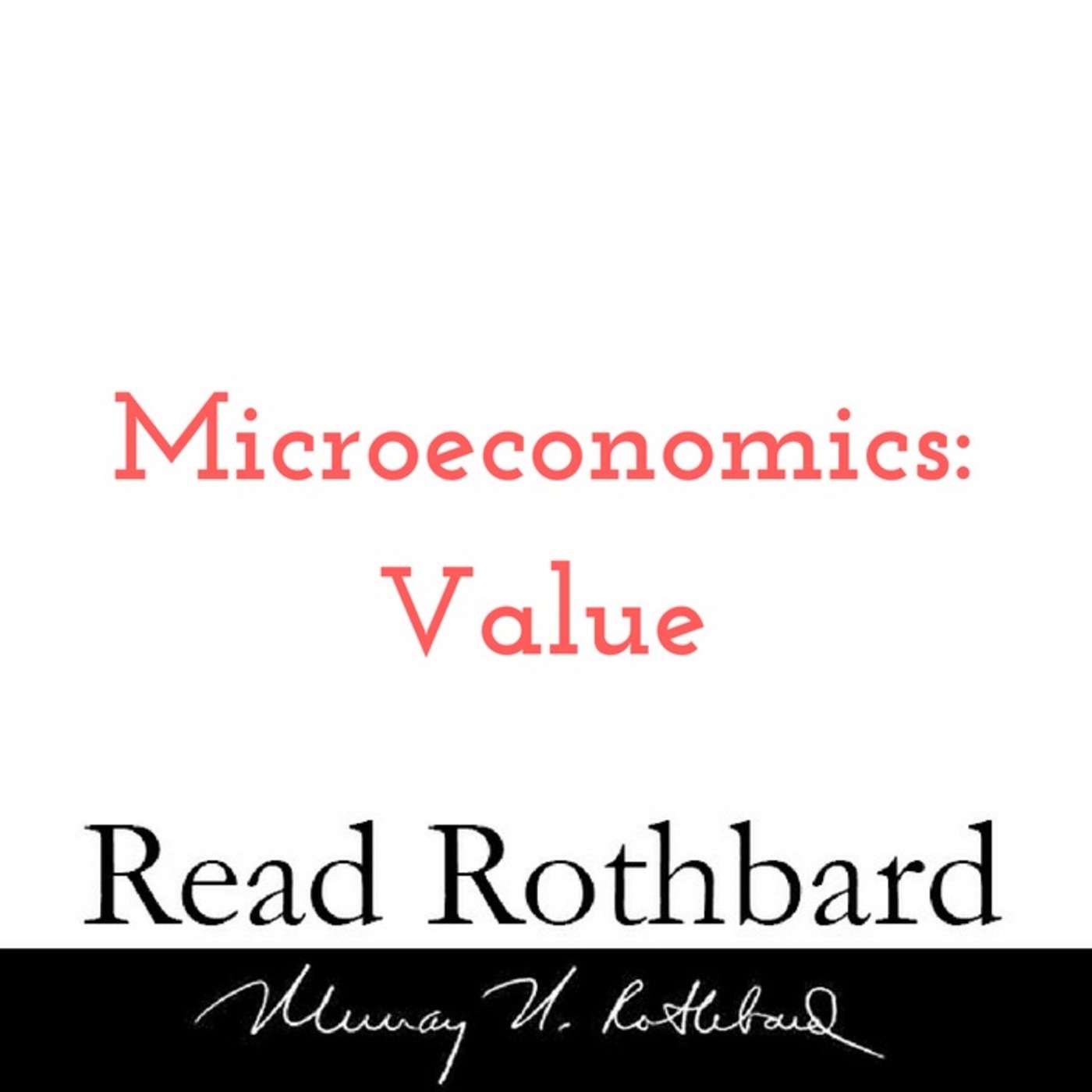
Enemy of the State: Murray RothbardEpisode 21 - Introduction to Microeconomics - 2 of 14 - Value - Murray N RothbardINTRODUCTION TO MICROECONOMICS
Presented by Murray N. Rothbard in 1986 at New York Polytechnic University. Recorded by Hans-Hermann Hoppe.
2. Intro to Micro: Value
Why is it that things like bread and water which have high use values are cheap while on the other hand luxury items like diamonds are very expensive? This paradox was not solved until it became understood that people choose only a marginal unit - this loaf or this diamond. Value can be attached to a good only by individuals' desires to use it directly in the present or in the present expectation of selling to such individuals...
2016-12-0934 min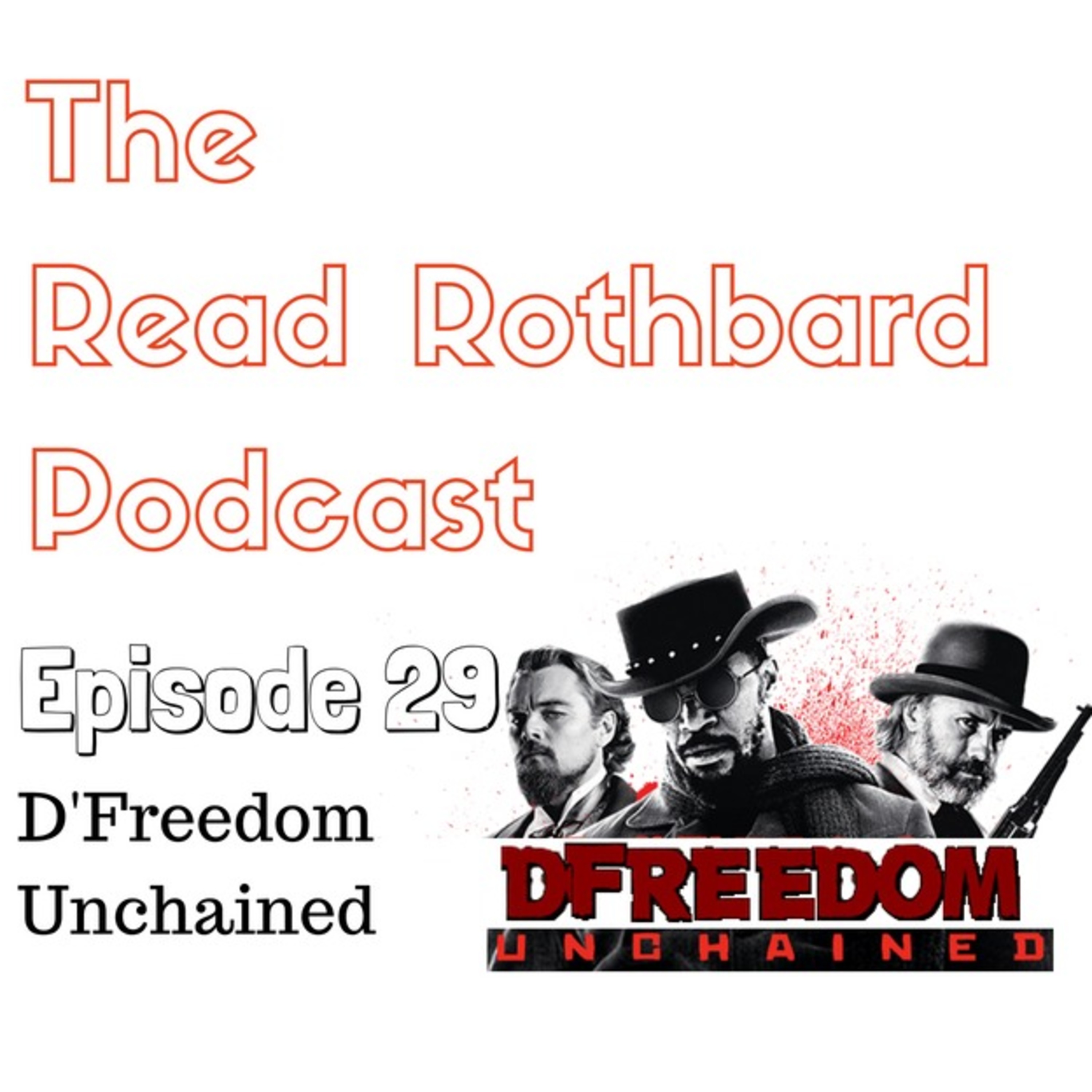
The Read Rothbard PodcastEpisode 29 - DFreedom Unchained (1:32:43)We talk about DJango Unchained and some of the various NAP violations contained therein. As it's a Tarantino movie, there are aplenty. We also talk about copyright and counterfeiting where we mostly raise questions and don't have super solid answers. We hope it is at least entertaining.
For show notes and more, please visit: http://www.readrothbard.com/Episode-29
Presented by Read Rothbard:
Read Rothbard is comprised of a small group of voluntaryists who are fans of Murray N. Rothbard. We curate content on the www.ReadRothbard.com site including books, lectures, articles, speeches, and we make a weekly...
2016-12-091h 32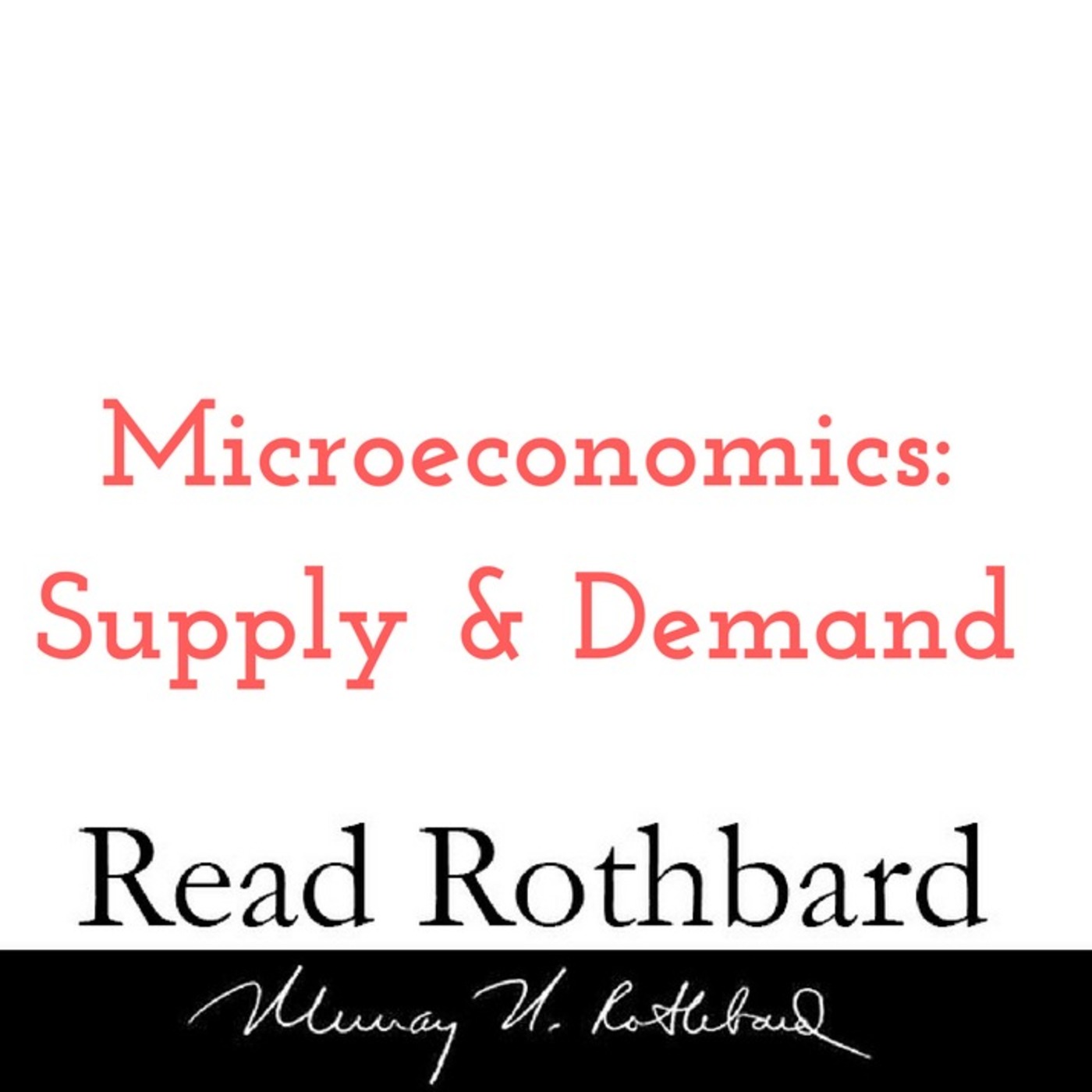
Enemy of the State: Murray RothbardEpisode 20 - Introduction to Microeconomics - 1 of 14 - Demand and Supply - Murray N RothbardINTRODUCTION TO MICROECONOMICS
Presented by Murray N. Rothbard in 1986 at New York Polytechnic University. Recorded by Hans-Hermann Hoppe.
1. Intro to Micro: Demand and Supply
Micro means dealing with the individual action. Macro deals with larger pictures of business cycles. Macro is screwed up. Micro is in pretty good shape. Study it first. Every individual has goals they wish to achieve.You use means to achieve goals. Economic theory is based on this deductive fact that the individual wants to arrive at goals - the means-ends objective.
Part 1 of 14. Presented in 1986 at New York Polytechnic University.
This lecture on YouTube: https...
2016-12-061h 01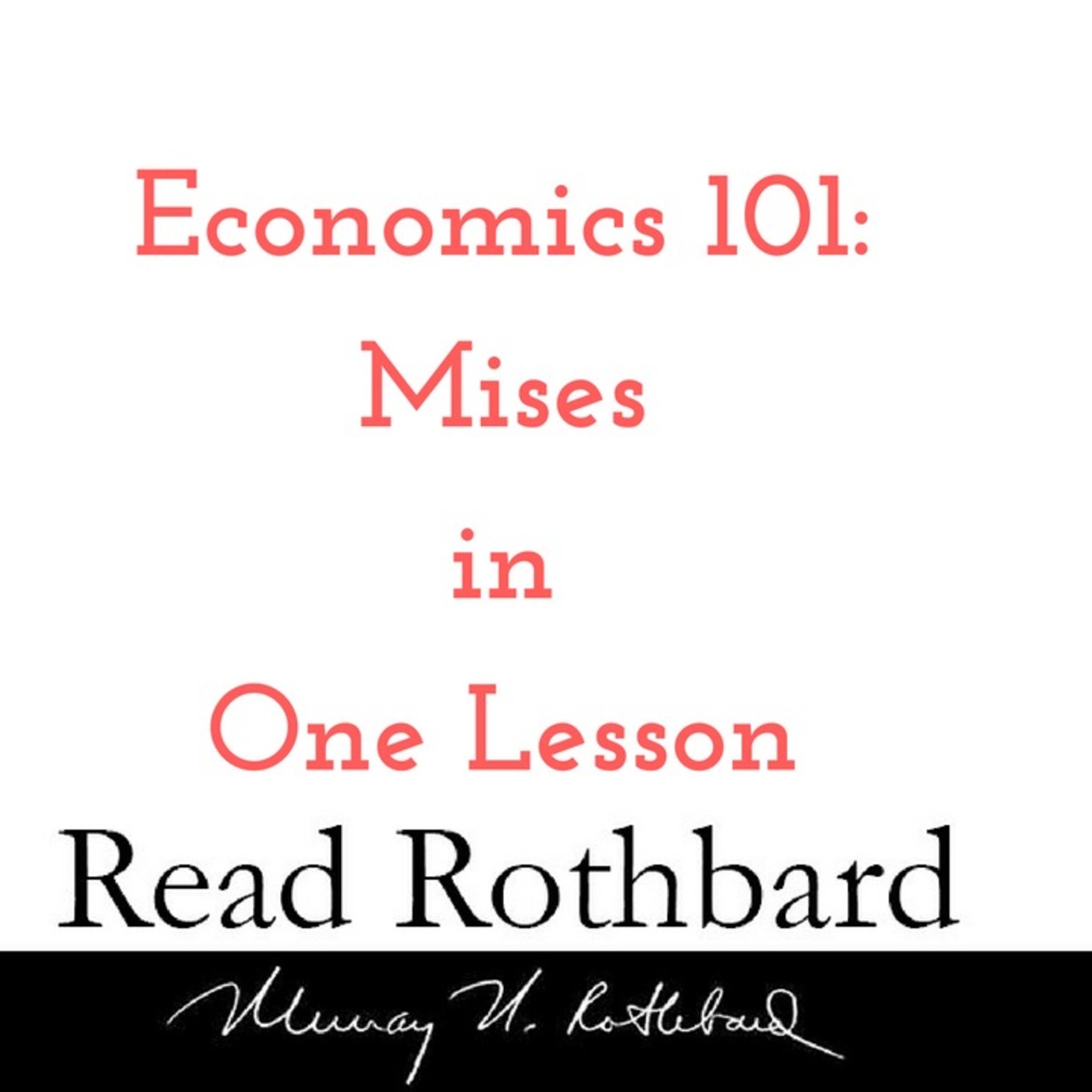
Enemy of the State: Murray RothbardEpisode 19 - Economics 101 - 8 of 8 - Mises in One Lesson - Murray N RothbardECONOMICS 101
Murray Rothbard's Economics 101 series
8. Mises in One Lesson
Austrian economics has nothing to do with the economics of Austria. Austrian Economics (AE) began with Carl Menger in 1871. It is based on an analysis of individual action, not aggregates or groups.
Economics predated Adam Smith. The British classical economics school could not solve the value paradox. It also embraced the labor theory of value. Another big fallacy was a focus on long-run equilibrium. Additionally, they separated micro and macroeconomics into two hermetically sealed spheres.
Menger and Bohm-Bawerk focused systematically on individual action. The purpose of production is consumption. Value is...
2016-12-021h 00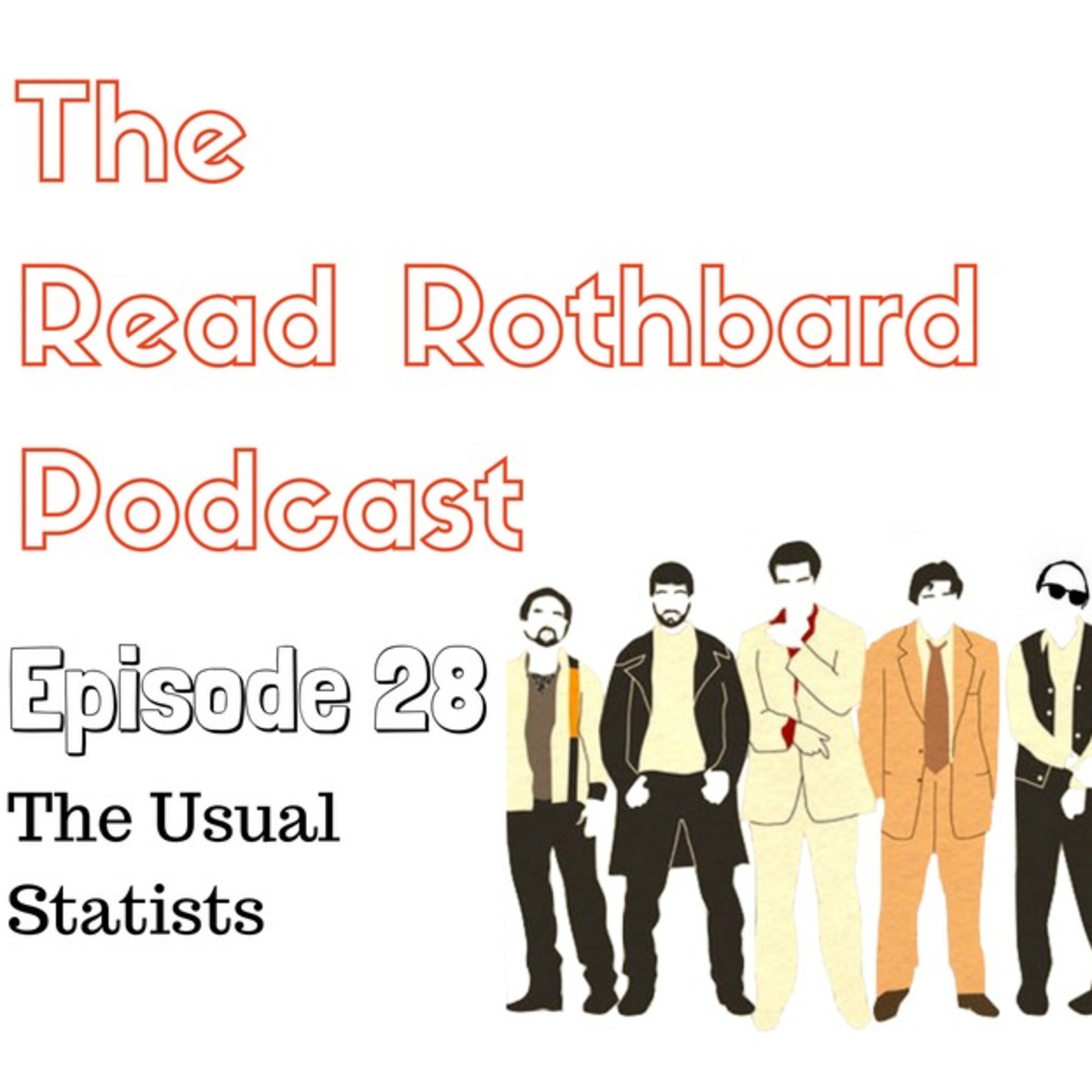
The Read Rothbard PodcastEpisode 28 - the Usual Statists"The greatest trick the devil ever pulled, was convincing the world that he didn't exist."
As it is with Verbal Kint in the Usual Suspects, the true evil is just under your nose for the entire film. He engenders himself to the detectives with requests for help, saying he likes cops, spinning yarns, all to distract from the monster beneath.
This is much the same way that the government presents itself as a provider of safety and security, what is needed for a civil society - yet it is the largest transgressor upon life and liberty; creating the most...
2016-12-0258 min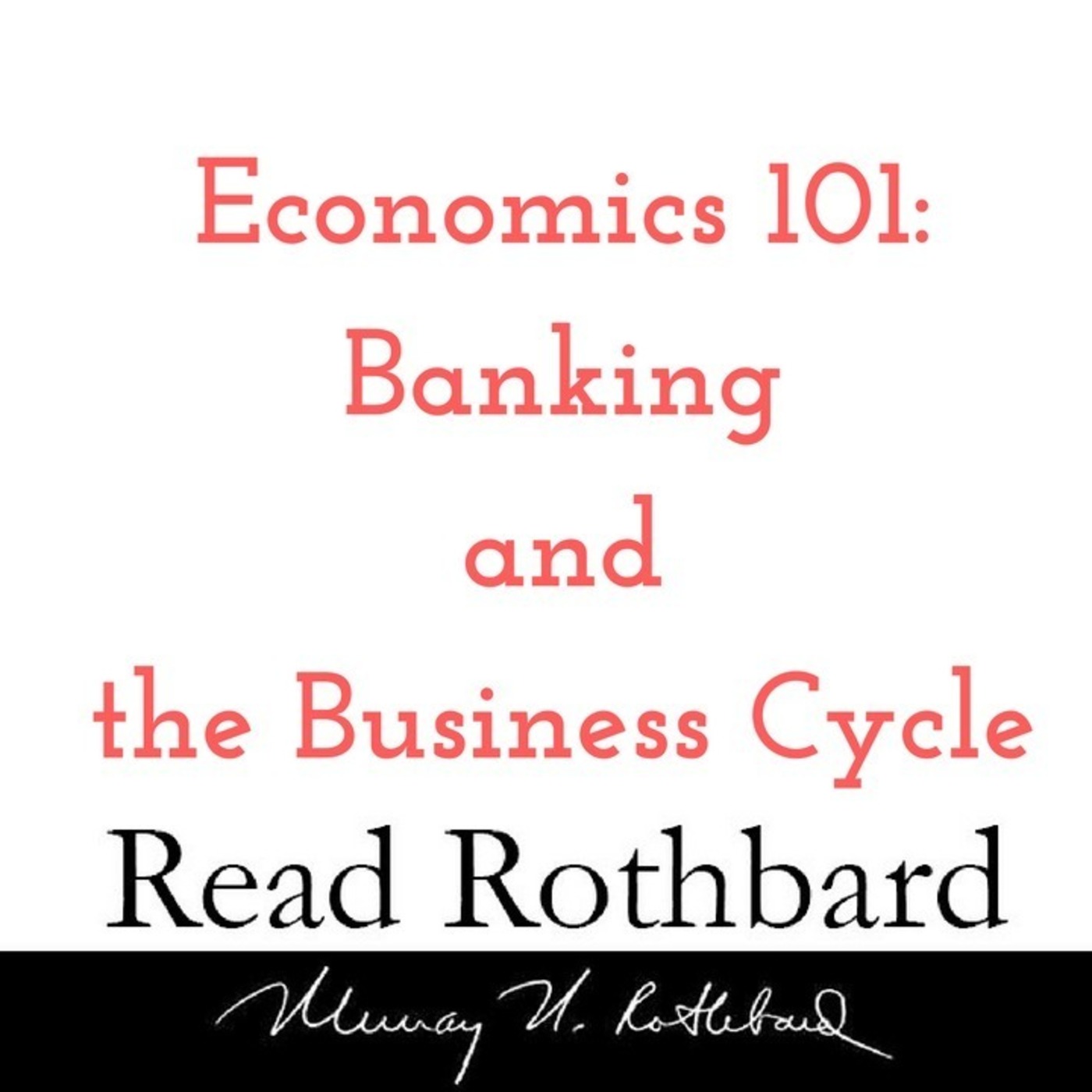
Enemy of the State: Murray RothbardEpisode 18 - Economics 101 - 7 of 8 - Banking and the Business Cycle - Murray N RothbardECONOMICS 101
Murray Rothbard's Economics 101 series
7. Banking and the Business Cycle
One of the most difficult things to understand about banking is how money is created out of thin air. Current commercial bank liabilities are immediate. The banks do not have the reserves to redeem all demand notes. Thus, banks are inherently insolvent. But, government has eliminated runs on banks. Banks are not allowed to fail when they are mismanaged.
Central banks are sold to the public as restraining inflation, but central banking was created to allow inflation. The inflationary process generates the boom and bust business cycle.
The Bank of...
2016-11-301h 38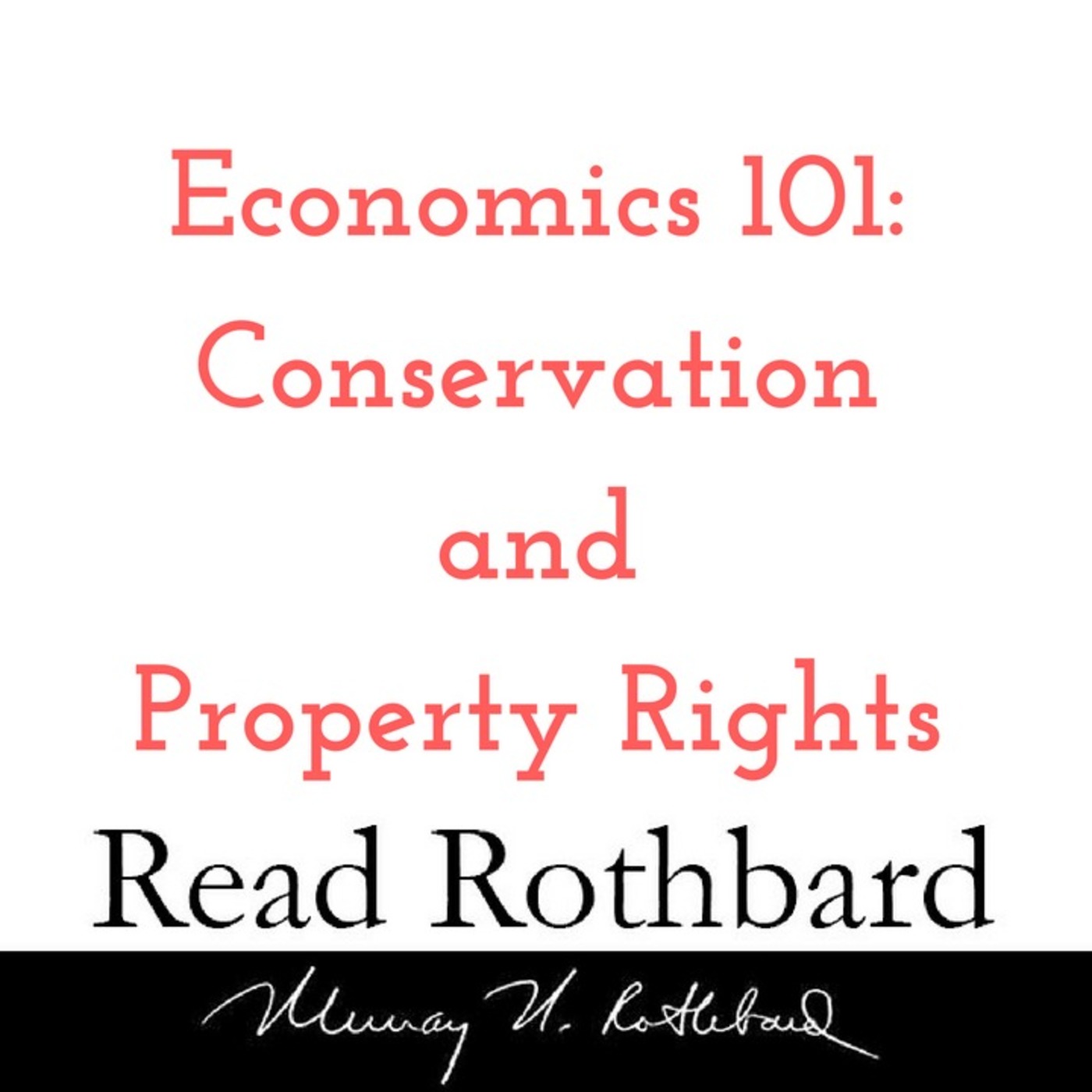
Enemy of the State: Murray RothbardEpisode 17 - Economics 101 - 6 of 8 - Conservation and Property Rights - Murray N RothbardECONOMICS 101
Murray Rothbard's Economics 101 series
6. Conservation and Property Rights
Free markets shift resources from where they are less valued to where they are most valued, benefiting consumers. When private property and free markets are allowed to operate, a natural conservation of resources occurs. Nothing is a resource unless it is useful to man.
Governments do not own anything and are not interested in preservation or maintenance. The conservation movement since 1900 simply closed off land. Western railroads and Western real estate owners financed the conservationists in order to keep land off the market.
Oceans have yet to adopt private property rights...
2016-11-2954 min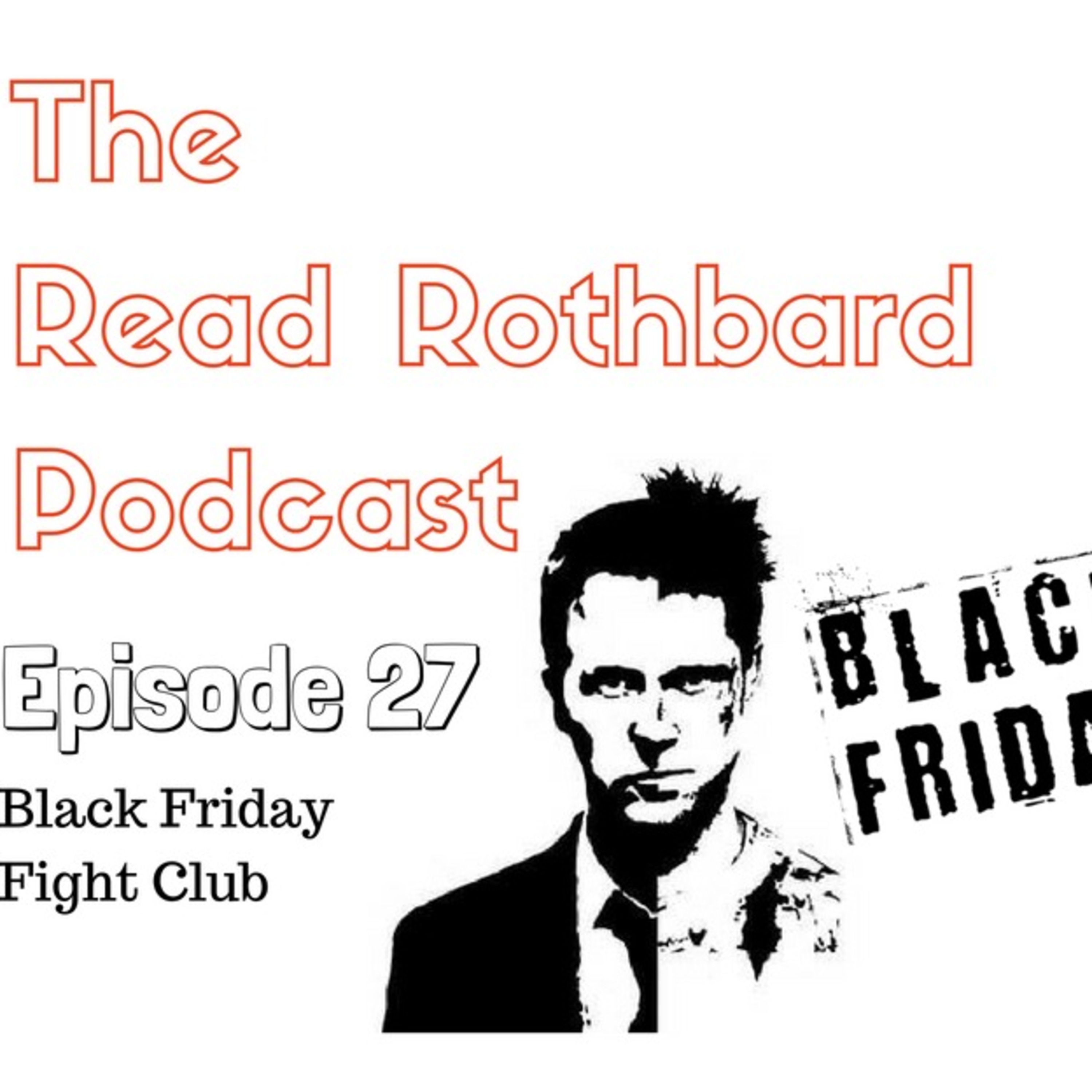
The Read Rothbard PodcastEpisode 27 - Black Friday Fight ClubWe talk Fight Club and the annual tradition of Black Friday where people line up in the wee hours after Thanksgiving to get into actual fights over Wal-Mart toasters. We also touch on the death of Castro and how leftists and world leaders (but I digress) are taking the news.
For show notes and more, please visit: http://www.readrothbard.com/episode-27
============================================
Read Rothbard is comprised of a small group of voluntaryists who are fans of Murray N. Rothbard. We curate content on the www.ReadRothbard.com site including books, lectures, articles, speeches, and we make a weekly podcast...
2016-11-271h 37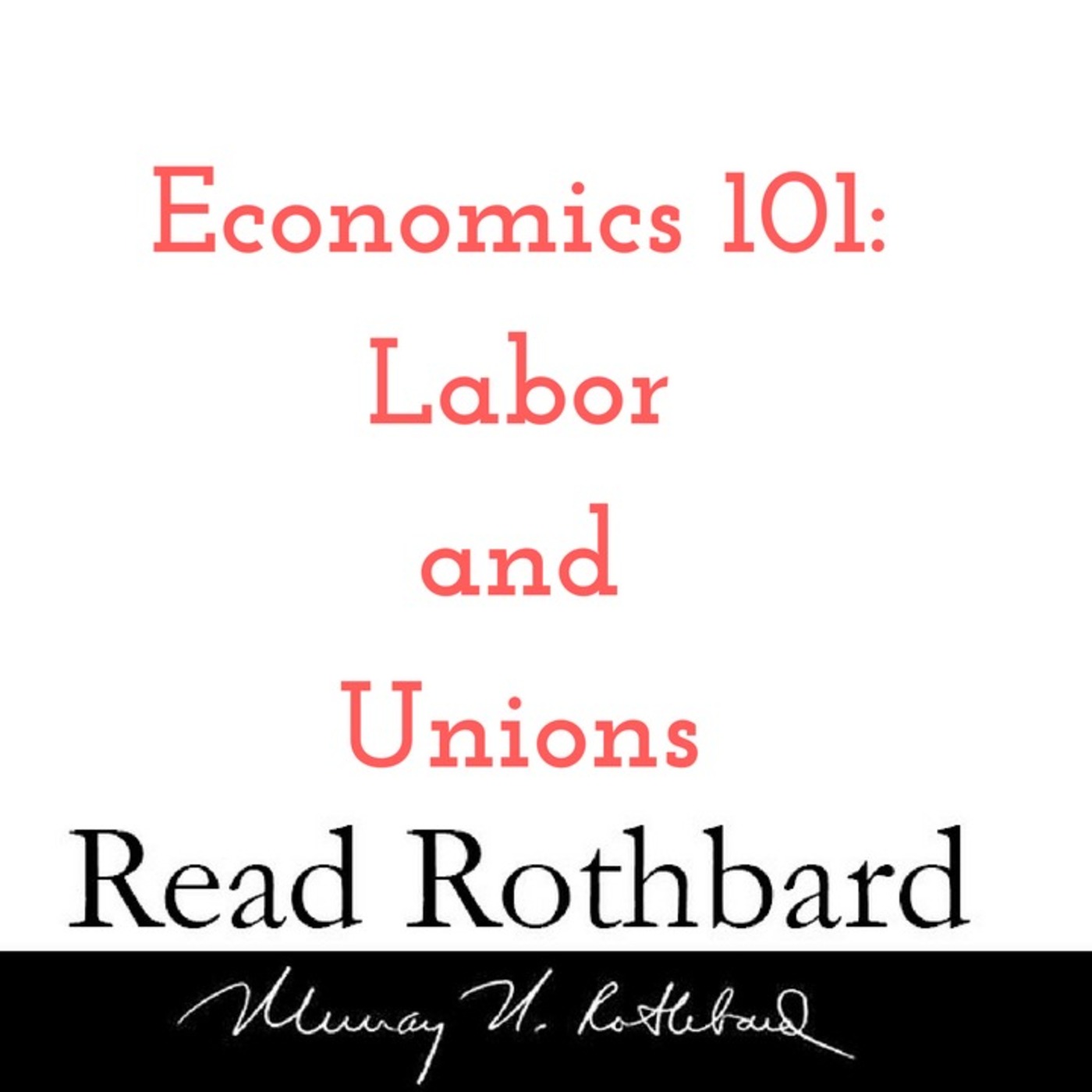
Enemy of the State: Murray RothbardEpisode 16 - Economics 101 - 5 of 8 - Labor and Unions - Murray N RothbardECONOMICS 101
Murray Rothbard's Economics 101 series
5. Labor and Unions
Rothbard covers the principles of demand and supply curves. Prices are at the seat of the whole system. Use the logic of reality. The most mobile labor force is teenagers. Over time, capital equipment per laborer increases. Real wage rates increase. Consumer prices decrease.
Unions cannot determine wage rates without putting companies out of business and causing unemployment. They attempt to control the labor market by restricting people. Unions have very little power when labor is ample. There were no labor unions from 1885 to 1935. Unions were first established in construction, coal mining...
2016-11-231h 27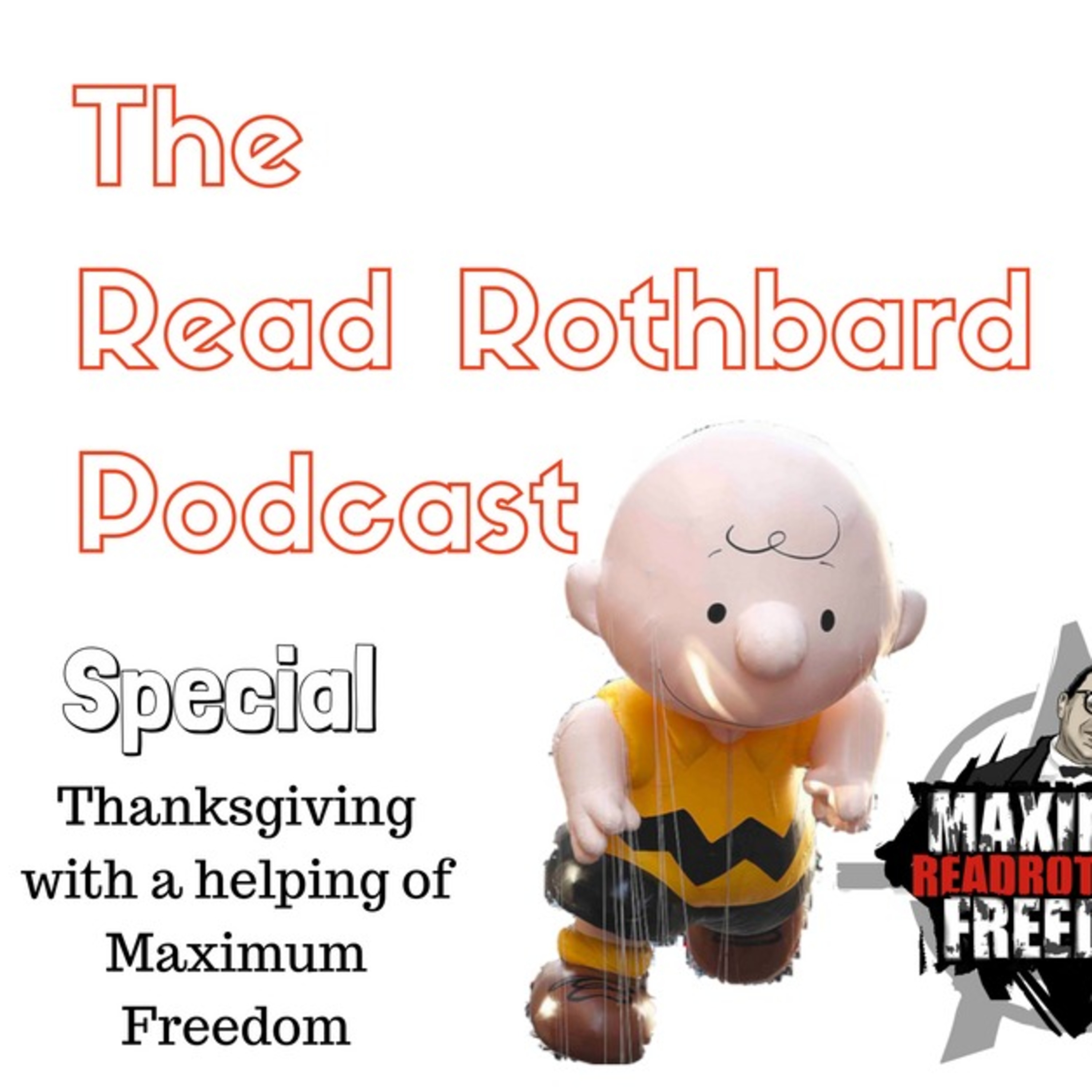
The Read Rothbard PodcastSpecial - Thanksgiving with a helping of Maximum Freedom (58:38)Here is the Read Rothbard Podcast Thanksgiving special! We talk about Peanuts with Charlie Brown, Peppermint Patty, Snoopy, Woodstock and the posse. Strange that there are no adults in the show, other than Charlie Brown's Grandmother on the phone.
Also, be sure to check out Tom Woods's Liberty Classroom Black Friday Special for BIG Savings on a GREAT product: http://www.readrothbard.com/libertyclassroom
For Show Notes and more, please visit: http://www.readrothbard.com/Special-Thanksgiving
This Podcast on YouTube: https://youtu.be/PcGfmqF2uP4
Presented by Read Rothbard:
Read Rothbard is comprised of a small group of voluntaryists...
2016-11-2258 min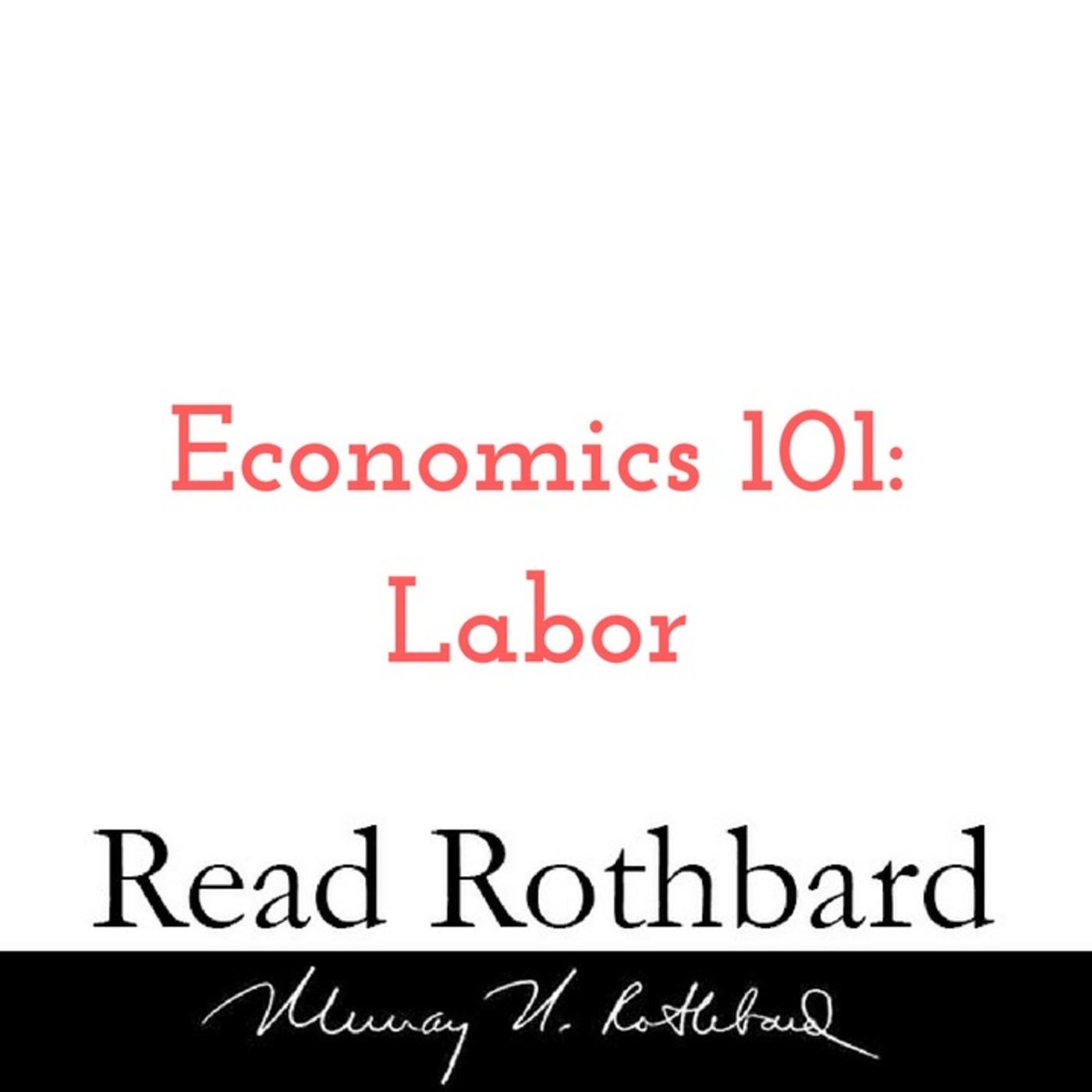
Enemy of the State: Murray RothbardEpisode 15 - Economics 101 - 4 of 8 - Labor - Murray N RothbardECONOMICS 101
Murray Rothbard's Economics 101 series
4. Labor
Minimum wage laws force unemployment up. All of those with few skills looking for an entry position will be denied because they cannot add enough value to the business labor field to be paid minimum wage. Unemployment follows minimum wage hikes. Marginal workers are being denied the labor market.
There were workers in canning businesses making thirty cents an hour who were disemployed when a forty cents minimum wage was enacted. By changing definitions of employment government agencies manipulate figures.
Population growth issues have often been irrational. Overpopulation in one area could be under...
2016-11-2150 min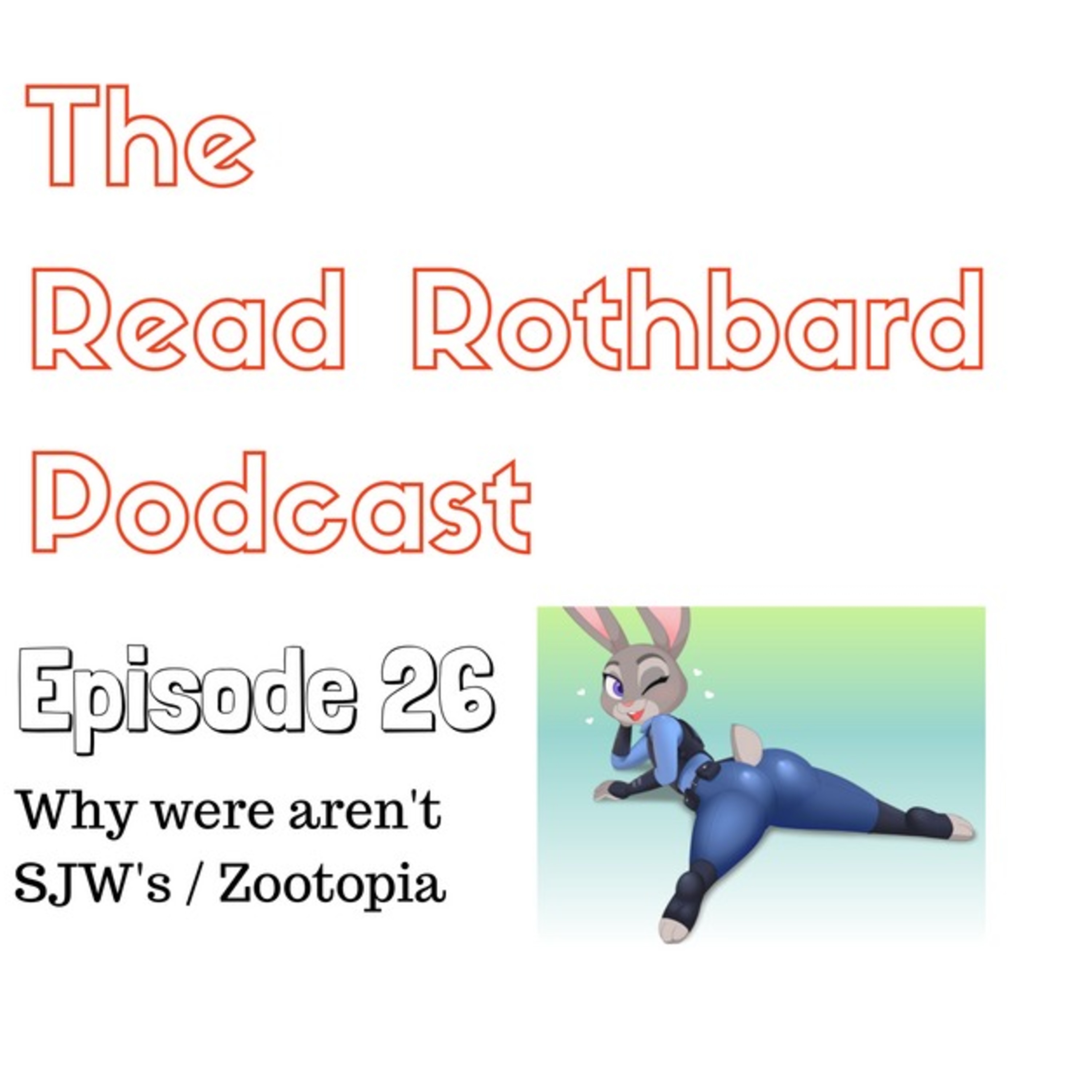
The Read Rothbard PodcastEpisode 26 - Why We Aren't SJW's / Zooptopia (1:27:06)We talk Zootopia and the craziness of minarchism, and the insane craziness of the idiotic SJW mindset.
For show notes and more, please visit: www.ReadRothbard.com/Episode-26
This episode on YouTube: https://youtu.be/x06t9ebjbgQ
Presented by Read Rothbard:
Read Rothbard is comprised of a small group of voluntaryists who are fans of Murray N. Rothbard. We curate content on the www.ReadRothbard.com site including books, lectures, articles, speeches, and we make a weekly podcast based on his free-market approach to economics. Our focus is on education and how advancement in technology improves the living...
2016-11-201h 27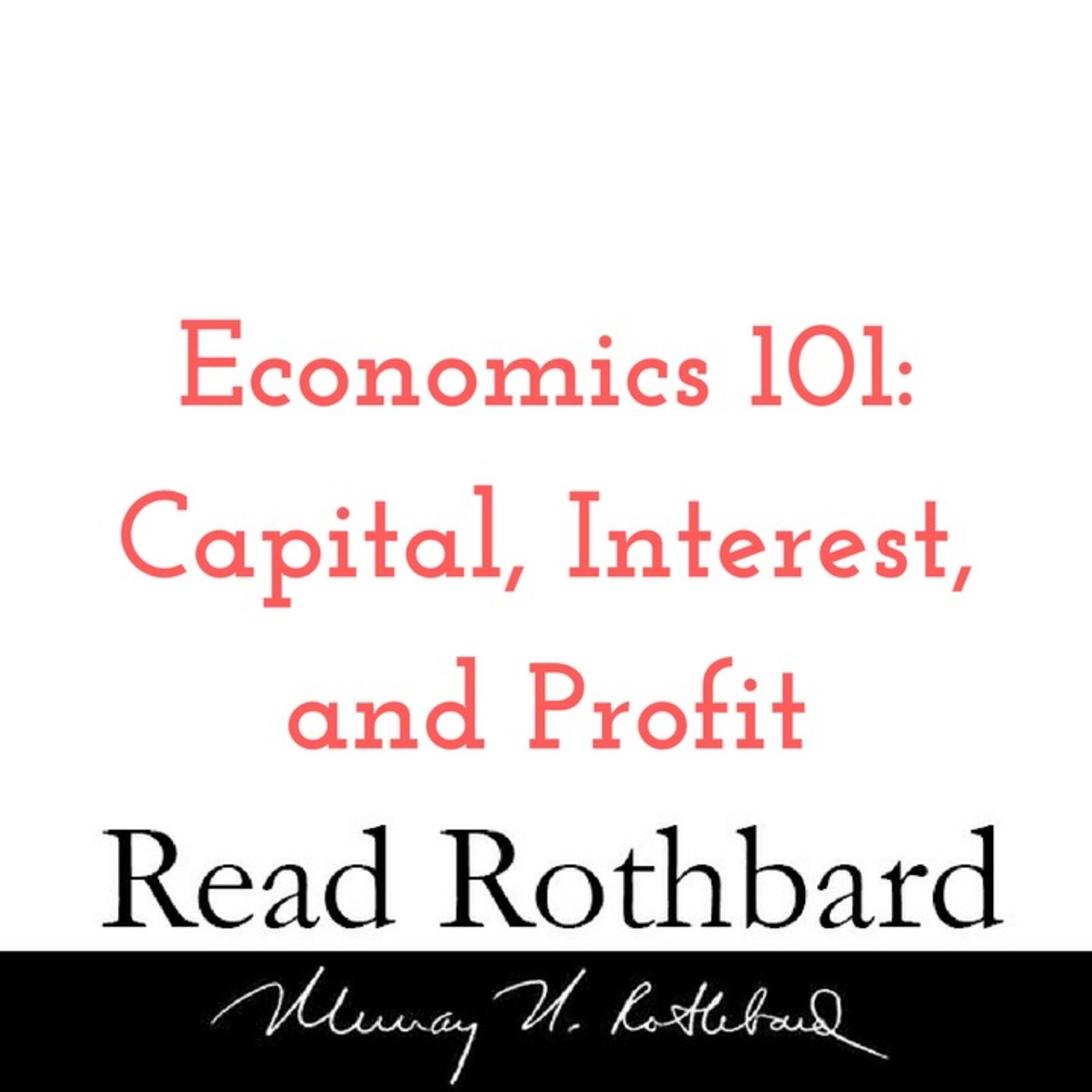
Enemy of the State: Murray RothbardEpisode 14 - Economics 101 - 3 of 8 - Capital, Interest, and Profit - Murray N RothbardECONOMICS 101
Murray Rothbard's Economics 101 series
3. Capital, Interest, and Profit
Profit is total revenue minus total costs. Ours is not just a profit system, it is a profit and loss system. Losses are a sign that you wasted land, labor, or capital, yet those who make profits are criticized.
Entrepreneurship is an art not a course you can learn.
Labor earns wages. Land earns rent. Capital earns interest. Confusingly, the word capital means both the machines used to produce goods and the funds available for investment. Bohm-Bawerk answered the question of where interest rates come from.
Time is the key element...
2016-11-1554 min
The Read Rothbard PodcastSpecial - 2016 Elections - Taste the RainbowDouble Rainbow of Schadenfreude! We mix it up about the stunning presidential result with Trump defeating the shoe-in Clinton. We recall a play-by-play of our updates to each other as it was happening. Pretty fun stuff. Of course, we don't support either candidate, but it is fun to see the expected winning side lose their collective shit in an ocean of lefty tears. Ride the wave, for a day.
For Show Notes and more, please visit: http://www.readrothbard.com/Special-Election-Episode
This episode on YouTube: https://youtu.be/r2NTOBHmbyM
Presented by Read Rothbard:
Read Rothbard is comprised of...
2016-11-101h 50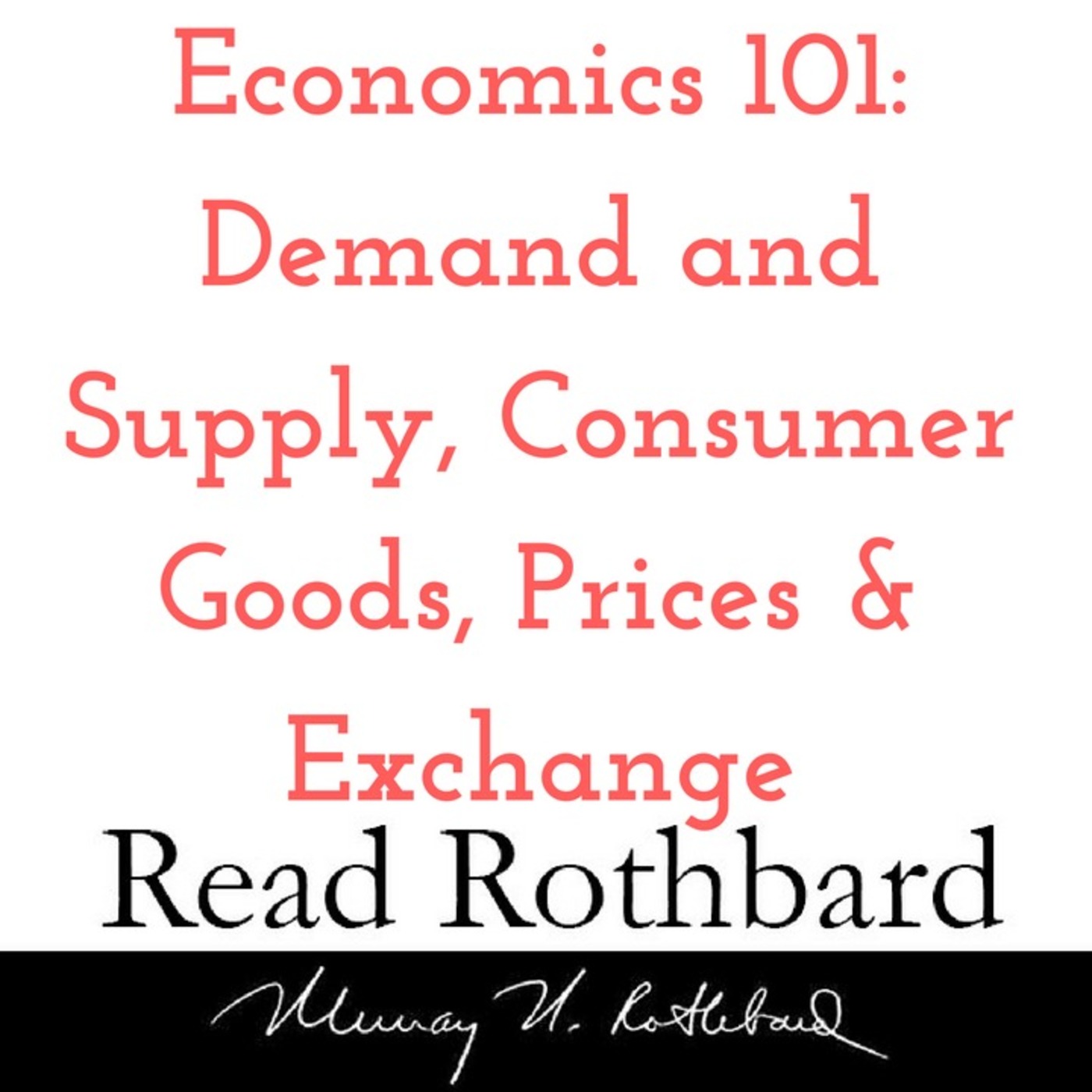
Enemy of the State: Murray RothbardEpisode 12 - Economics 101 - 1 of 8 - Demand and Supply, Consumer Goods, Prices and Exchange - Murray N RothbardECONOMICS 101
Murray Rothbard's Economics 101 series
1. Demand and Supply, Consumer Goods, Prices and Exchange
Micro economics starts with the basic fact that each person has short term and long term goals, like buying a ham sandwich and graduating from college. People act in the world to accomplish something. Human action is purposive. You employ different means to achieve certain goals.
Rothbard begins with the simple situation of Crusoe – one laborer- on an island. Capital is everything used in production that is not land or labor. Production ends up with consumer goods which are consumed. The free market coordinates everything. No world pl...
2016-11-0753 min
The Read Rothbard PodcastEpisode 25 - Enter the Interstellar FloodEpisode 25! Can't believe we made it this far. In this episode, we are discussing/dismantling Interstellar and Before the Flood. They both call for massive, collective response to a "crisis". Examples of World Wars, the Great Depression, NASA and the moon landings, the Manhattan Project seem to be ingrained in the culture as problems only collective action led by government can, or ever has solved.
For Show Notes and more, please visit: http://www.readrothbard.com/Episode-25
This episode on YouTube: https://youtu.be/5ZO_c6eJmNQ
Presented by Read Rothbard:
Read Rothbard is comprised of a small group...
2016-11-041h 17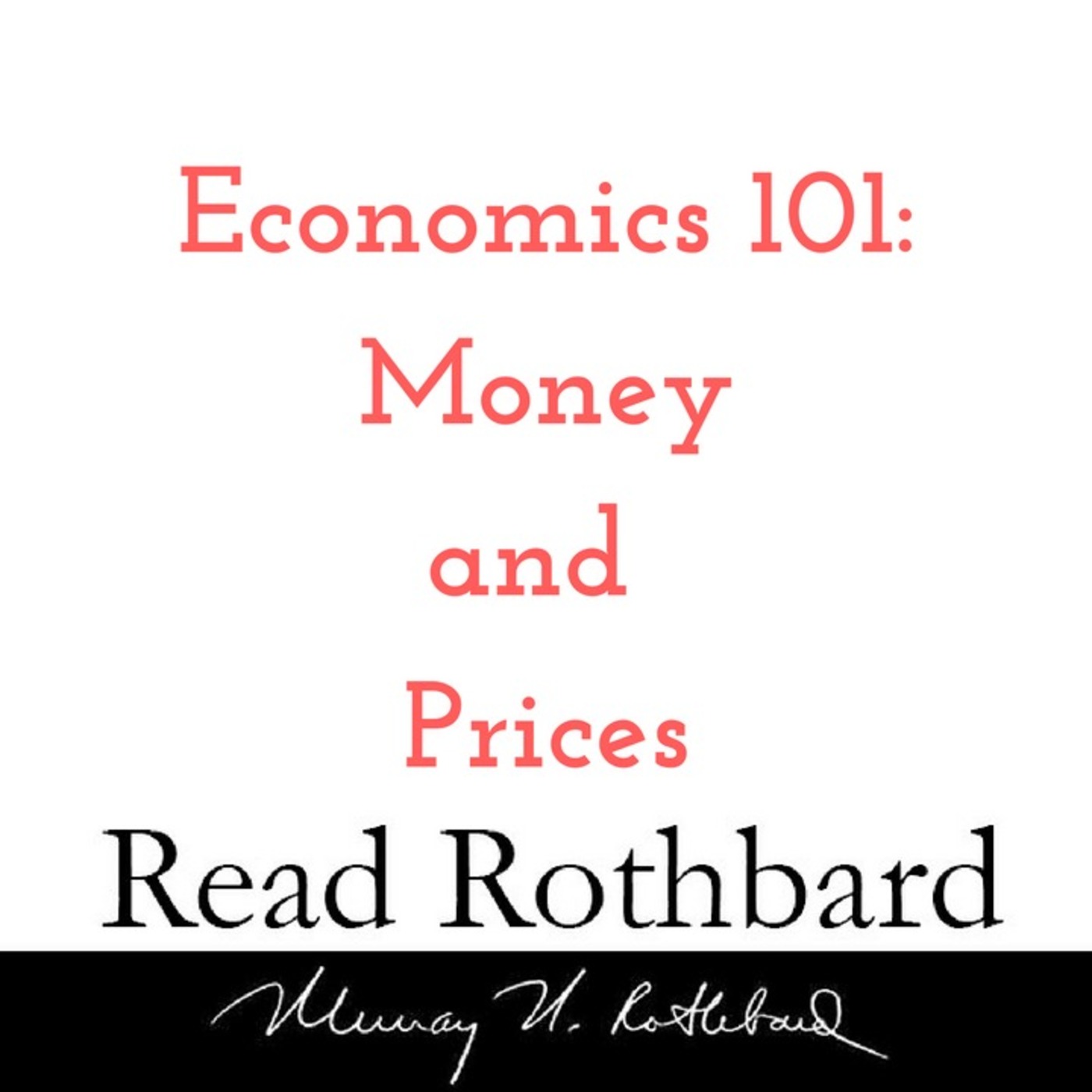
Enemy of the State: Murray RothbardEpisode 13 - Economics 101 - 2 of 8 - Money and Prices - Murray N RothbardECONOMICS 101
Murray Rothbard's Economics 101 series
2. Money and Prices
Many believe that if governments would just issue greater quantities of money then all problems would be solved. In truth that would create unsurmountable problems by lowering the purchasing power of each money unit. Money is the one good that is not made better by increasing its supply.
Rothbard discusses how money originates. Products are originally merely exchanged between people. This is the barter system and it is based upon the double coincidence of wants. Very shortly, one or two commodities like wheat or tobacco emerge on the market as more marketable...
2016-11-0355 min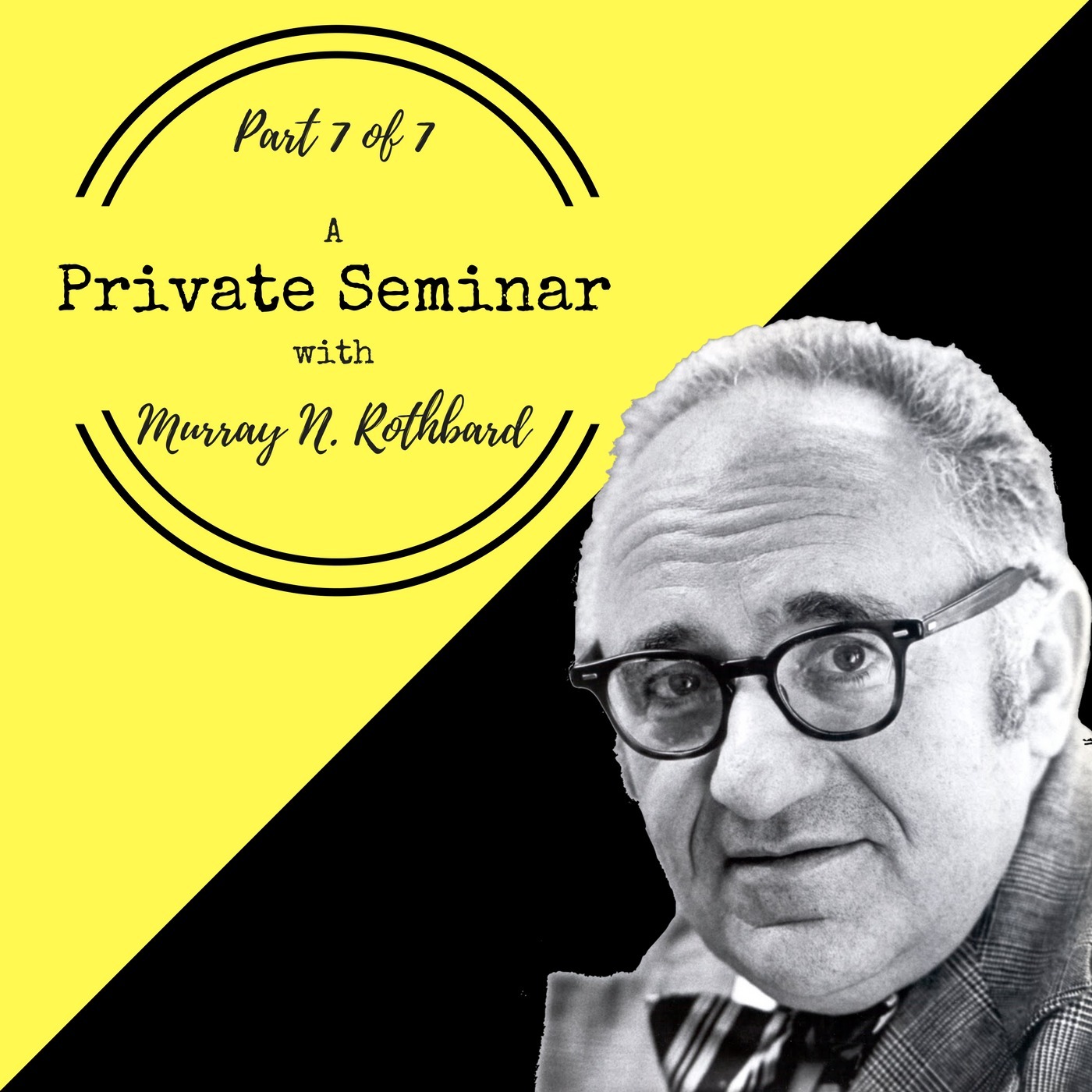
Enemy of the State: Murray RothbardEpisode 11 - Introduction to Economics Part 7 of 7 - Murray N RothbardIntroduction to Economics: A Private Seminar with Murray N. Rothbard
Deficits are equal to expenditures minus taxes. Reagan spoke of cutting government spending, but meant only cutting the rate of growth of government spending. Stagflation appeared in 1957-58. Inflation during a recession was not supposed to happen. It happened again in 1973-75. The file stops at 7:01 and unfortunately the rest of the lecture is lost.
Part seven of seven from Introduction to Economics: A Private Seminar with Murray N. Rothbard.
This lecture on YouTube: https://youtu.be/4IGn9Hl-op0
Sourced from: https://mises.org/library/introduction-economics-part-7
We are not endorsed or af...
2016-11-0125 min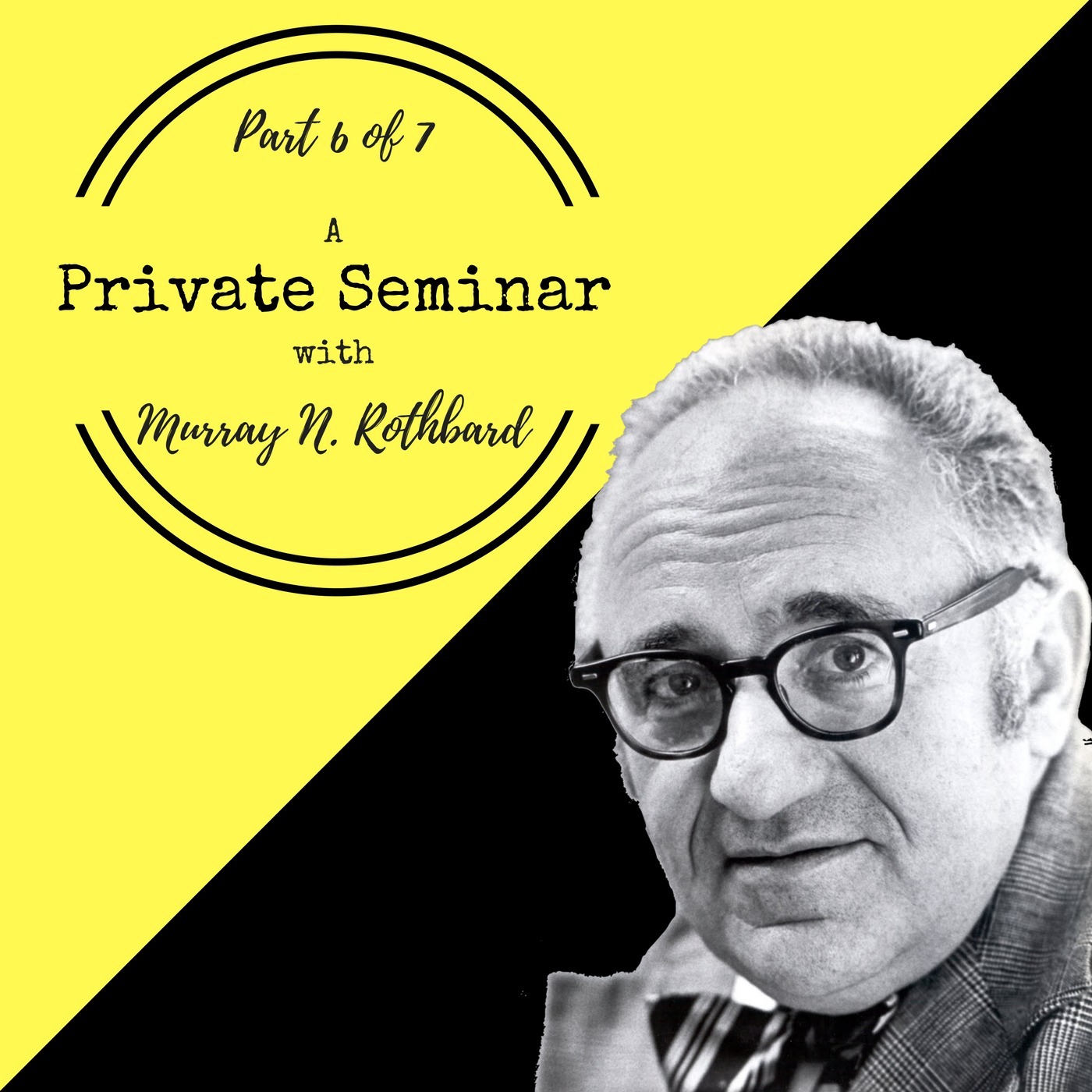
Enemy of the State: Murray RothbardEpisode 10 - Introduction to Economics Part 6 of 7 - Murray N RothbardIntroduction to Economics: A Private Seminar with Murray N. Rothbard
What causes business cycles? Keynesians say the cycles happen because the free market economy does not spend enough. Thus, pump spending in. Additionally, Keynesians say that animal spirits cause these cycles. Government must fix things. Nobody could understand Keynes' General Theory. What was simply obscure was wrongly considered deep.
Keynes linked national income with employment, by assuming wage rates are fixed downward. Although Keynes wrote of balanced budgets, there were only deficits.
Part six of seven from Introduction to Economics: A Private Seminar with Murray N. Rothbard.
This lecture on...
2016-11-0145 min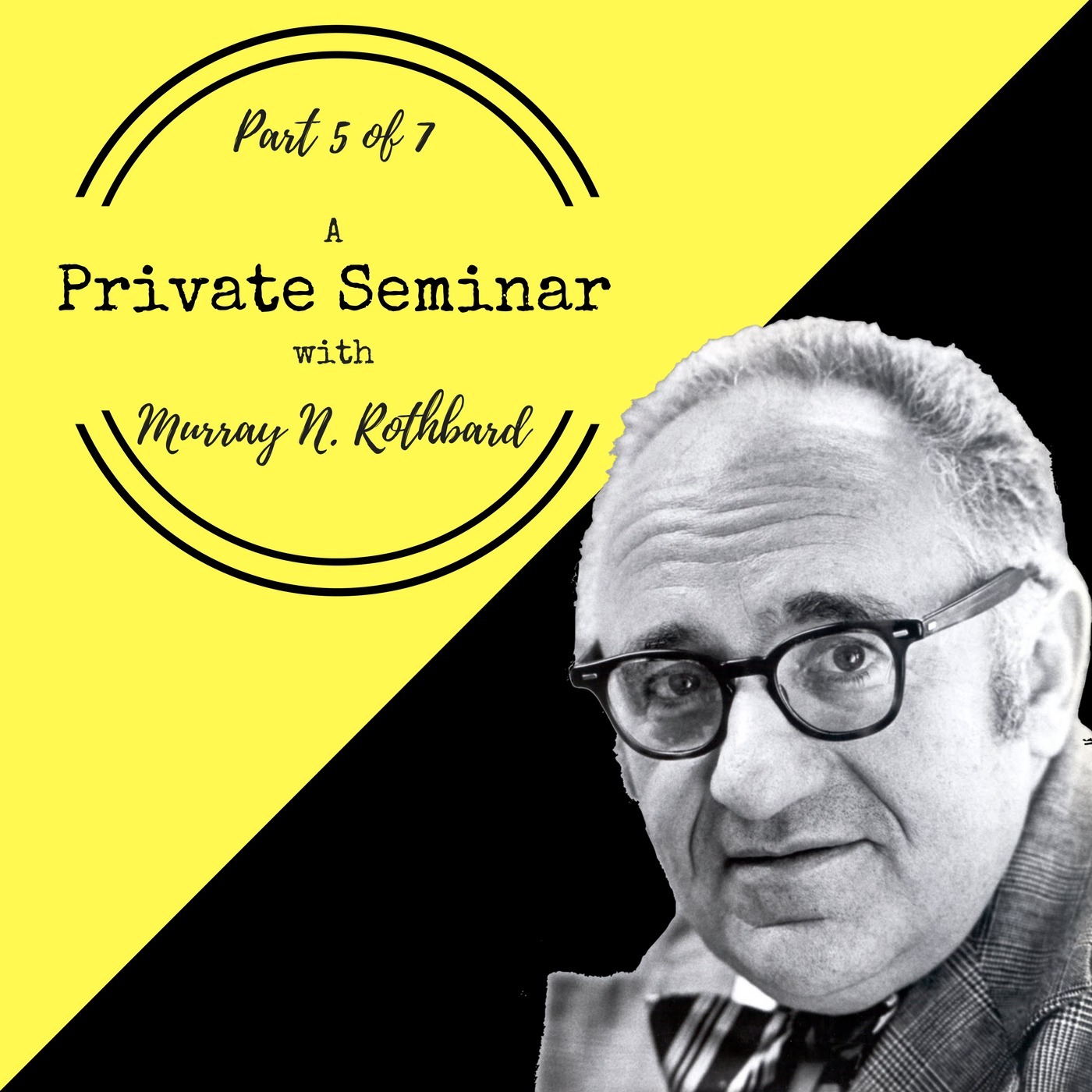
Enemy of the State: Murray RothbardEpisode 9 - Introduction to Economics Part 5 of 7 - Murray N RothbardIntroduction to Economics: A Private Seminar with Murray N. Rothbard
The entrepreneur is the major risk bearer. Business return on capital is long run profits or losses. Real rate of interest is determined by time preferences. Government contracts are cost plus. Medical costs are higher because supply is so restricted by government intervention. Who benefits?[by government action]. Rockefeller families are heavily invested in drug companies. Cartelism. Monopolies. Yet, free market productivity causes prices of goods to drop, e.g. computer products.
How the history of the business cycle starts. War stimulus, famine, were outside the market and not cyclical...
2016-11-0146 min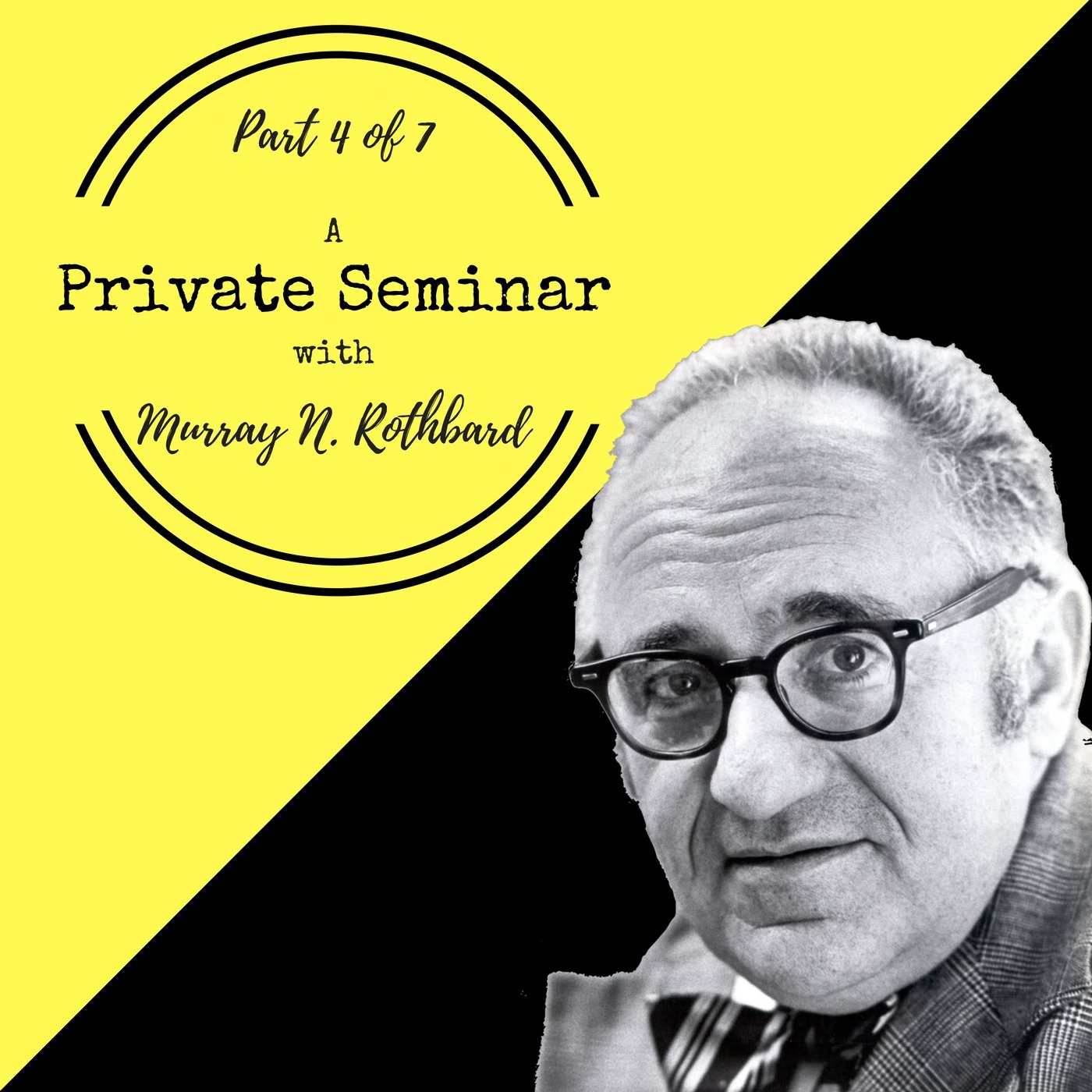
Enemy of the State: Murray RothbardEpisode 8 - Introduction to Economics Part 4 of 7 - Murray N RothbardIntroduction to Economics: A Private Seminar with Murray N. Rothbard
Costs are always ex ante. There are no such things as social costs or social benefits. Costs are determined by how much entrepreneurs think consumers will pay. Costs are not determined by supply and demand. Nobody waits for costs to raise prices. Rothbard does not believe in cost curves.
Antitrust suits are often filed by one set of competitors trying to eliminate another set. Additionally, antitrust suits are money making rackets for lawyers.
Interest is not just a loan; it is a time preference. Usury laws misunderstood interest.
Part four...
2016-11-0145 min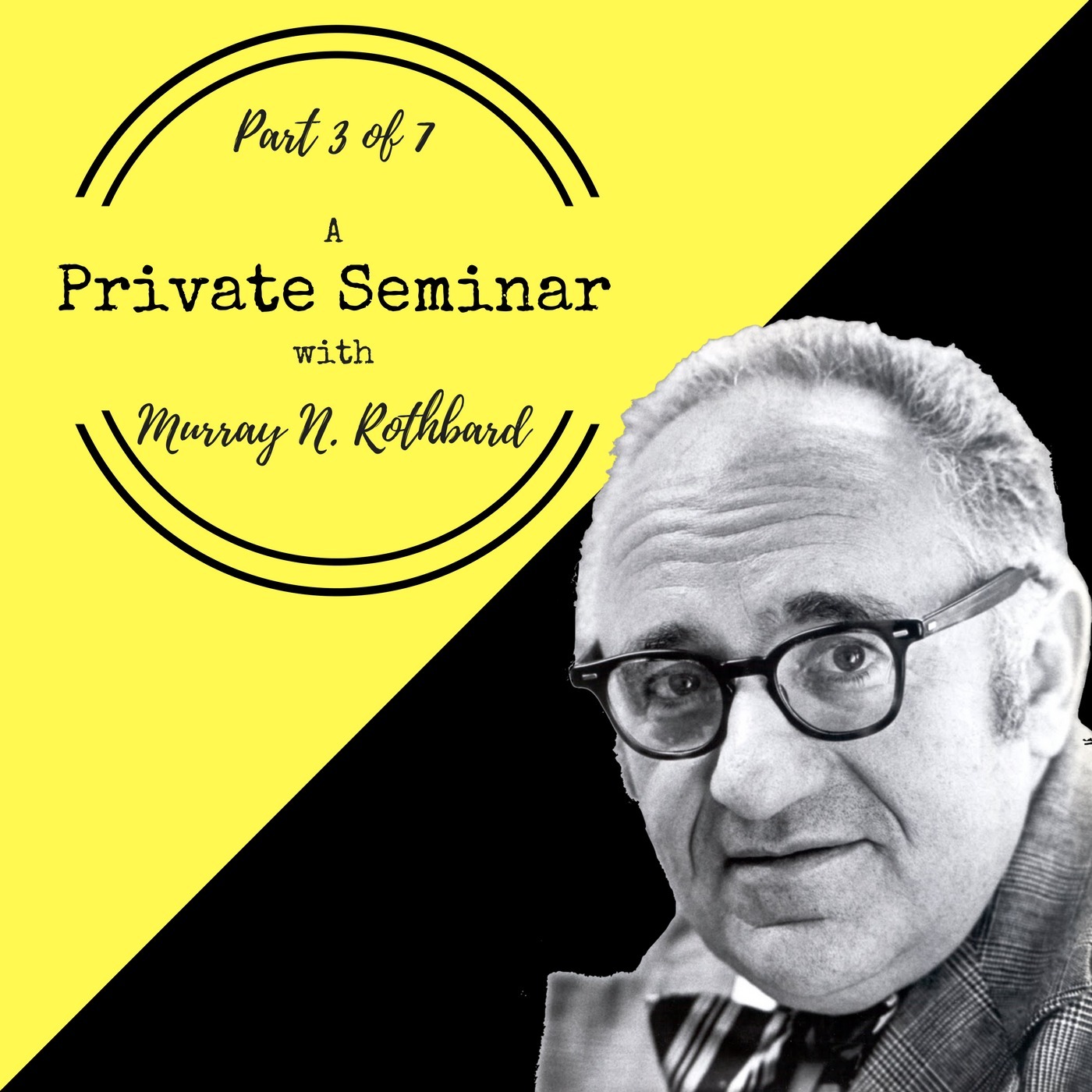
Enemy of the State: Murray RothbardEpisode 7 - Introduction to Economics Part 3 of 7 - Murray N RothbardIntroduction to Economics: A Private Seminar with Murray N. Rothbard
Rothbard considers how prices are determined by supply and demand on the free market. All long shortages are caused by government interventions. Forecasting is not possible. Economics is not an objective science.
Part three of seven from Introduction to Economics: A Private Seminar with Murray N. Rothbard.
This lecture as on YouTube: https://youtu.be/CLyrvIKY2N4
Sourced from: https://mises.org/library/introduction-economics-part-3
We are not endorsed or affiliated with the above.
https://creativecommons.org/licenses/by-nc-nd/3.0/legalcode
Presented by Read Rothbard:
Read Rothbard is comprised of a small...
2016-11-0146 min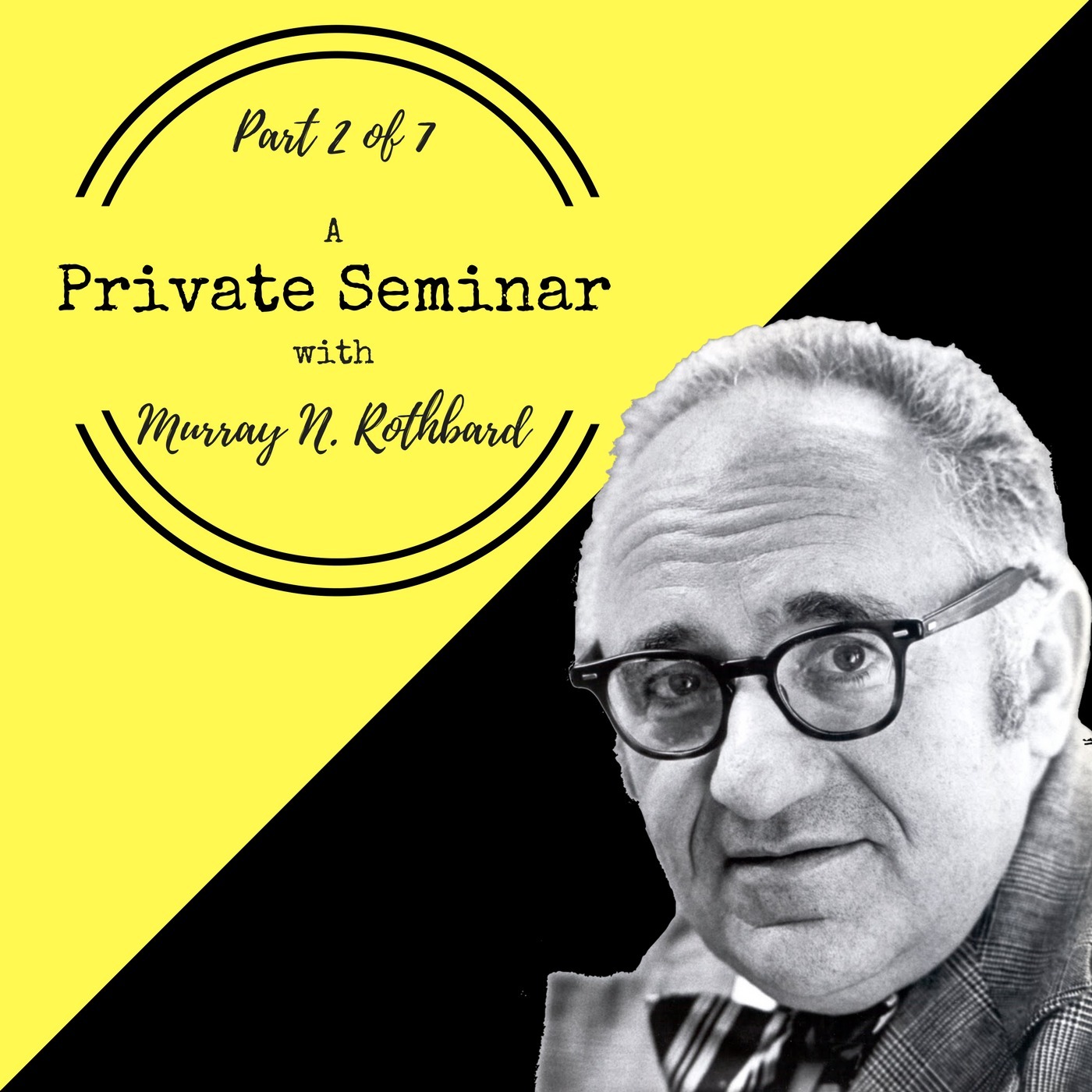
Enemy of the State: Murray RothbardEpisode 6 - Introduction to Economics Part 2 of 7 - Murray N RothbardIntroduction to Economics: A Private Seminar with Murray N. Rothbard
Rothbard continues the Crusoe analogy. He covers subjectivity of value, and the concept of marginal utility.
Part two of seven from Introduction to Economics: A Private Seminar with Murray N. Rothbard.
This lecture as on YouTube: https://youtu.be/VAMY6qLH1nU
Sourced from: https://mises.org/library/introduction-economics-part-2
We are not endorsed or affiliated with the above.
https://creativecommons.org/licenses/by-nc-nd/3.0/legalcode
Presented by Read Rothbard:
Read Rothbard is comprised of a small group of voluntaryists who are fans of Murray N. Rothbard. We curate content on the...
2016-11-0145 min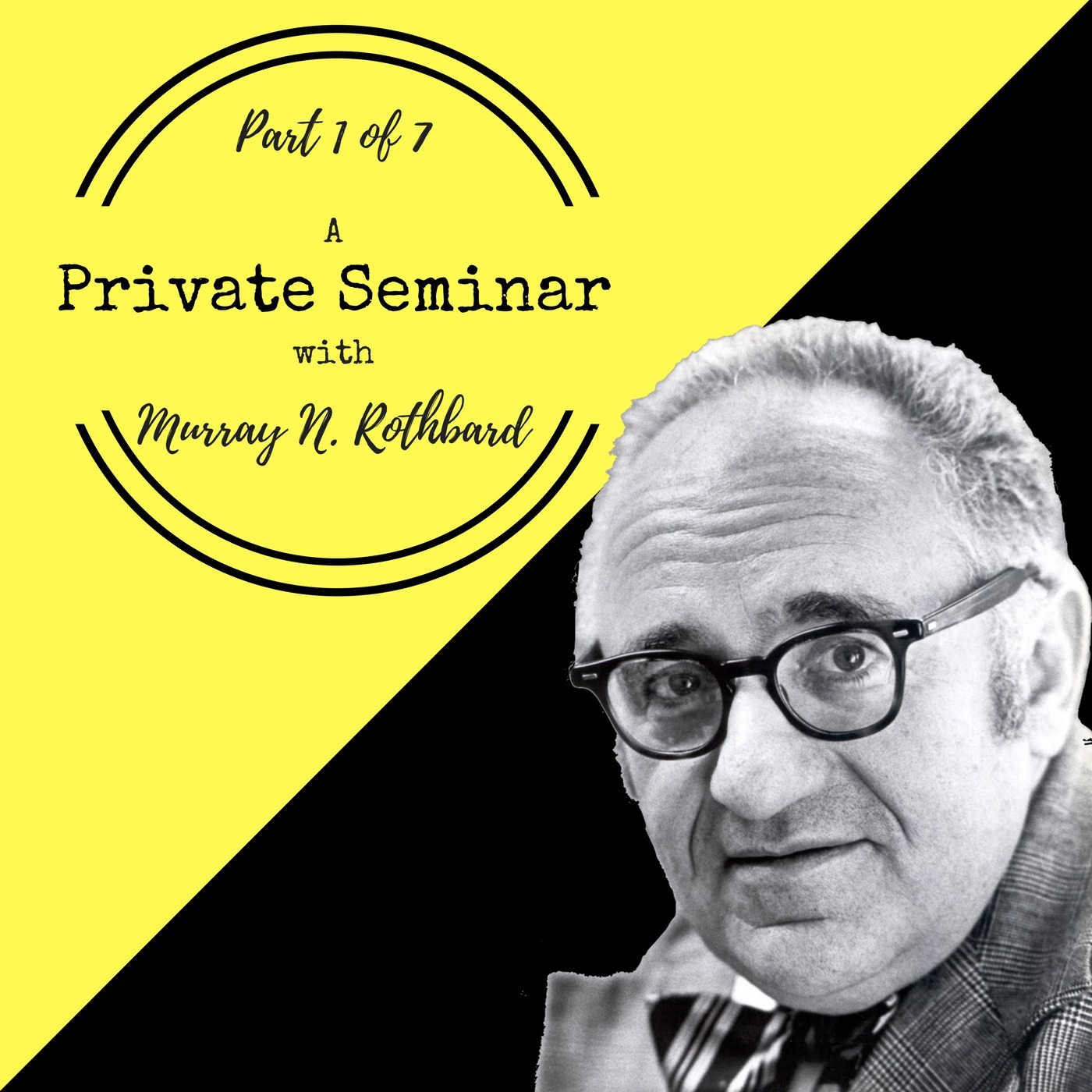
Enemy of the State: Murray RothbardEpisode 5 - Introduction to Economics Part 1 of 7 - Murray N RothbardIntroduction to Economics: A Private Seminar with Murray N. Rothbard
Starting with Crusoe economics, Rothbard builds the economic concepts which can be developed by this analogy.These concepts are the axiom of human action. Among them are: man acts, man acts by virtue of his existence, man acts with purposeful behavior, man prefers present to future actions, resources are means to achieve ends, scarcity exists, actions take time, life is uncertain, and the theory of value is subjective.
Part one of seven from Introduction to Economics: A Private Seminar with Murray N. Rothbard.
This lecture on YouTube: https://youtu.be...
2016-11-0146 min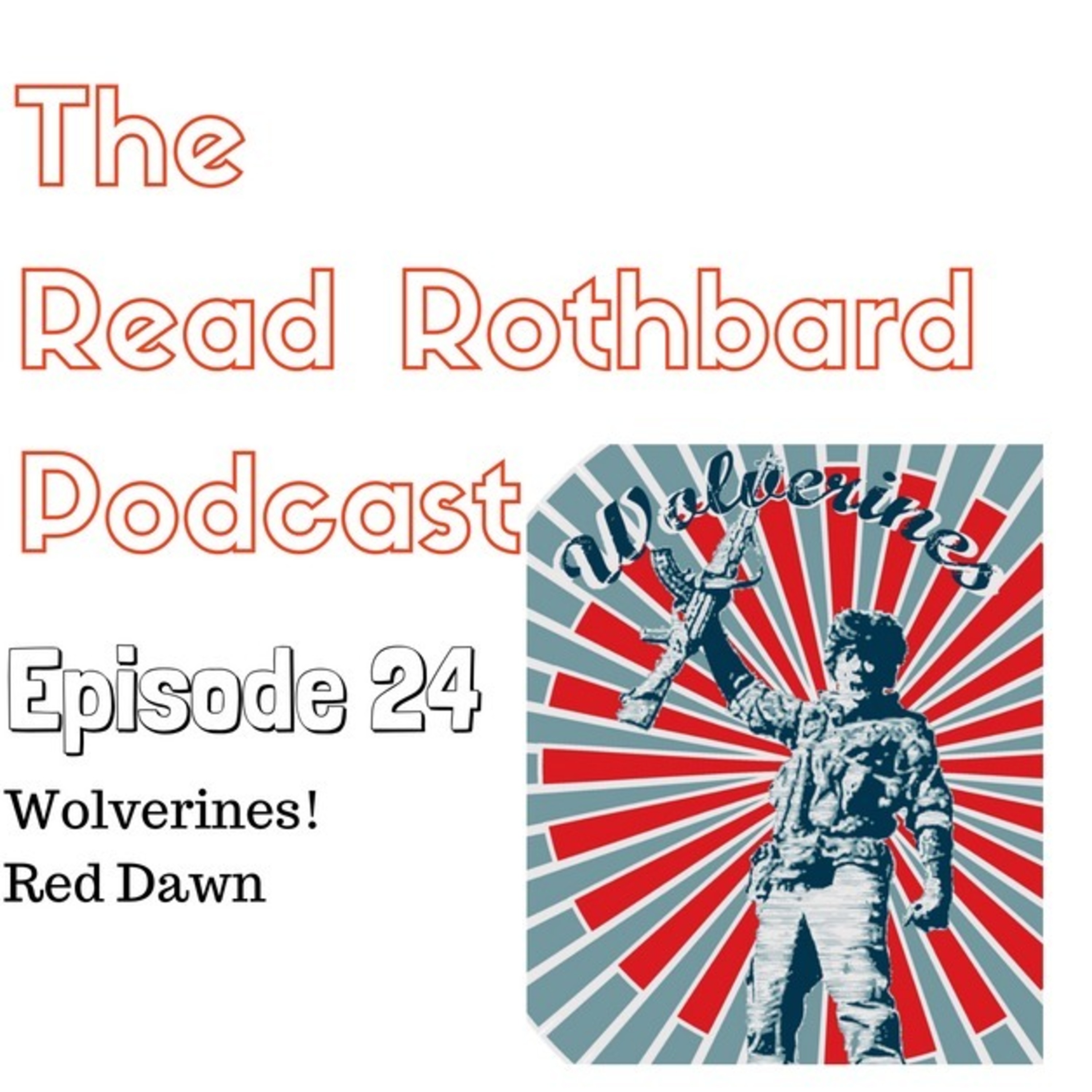
The Read Rothbard PodcastEpisode 24 - Wolverines! Red Dawn (1:54:42)We are back at it again discussing the 1984 cult-classic, Red Dawn. Is there a libertarian thread? There seems to be. This is a long and rambling podcast almost 2 HOURS long! We also spend a fair amount of time discussing the recent Stefan Molyneux video where he appears to be breaking up with libertarianism. It's an interesting conversation and we hope you enjoy. Looking forward to comments or feedback to the show. WOLVERINES!
Wolverines photo for Episode 24
https://www.flickr.com/photos/charlesfettinger/4888175335
https://creativecommons.org/licenses/by/2.0/
For show notes and more, please visit: http://www.readrothbard.com/Episode-24
...
2016-10-291h 54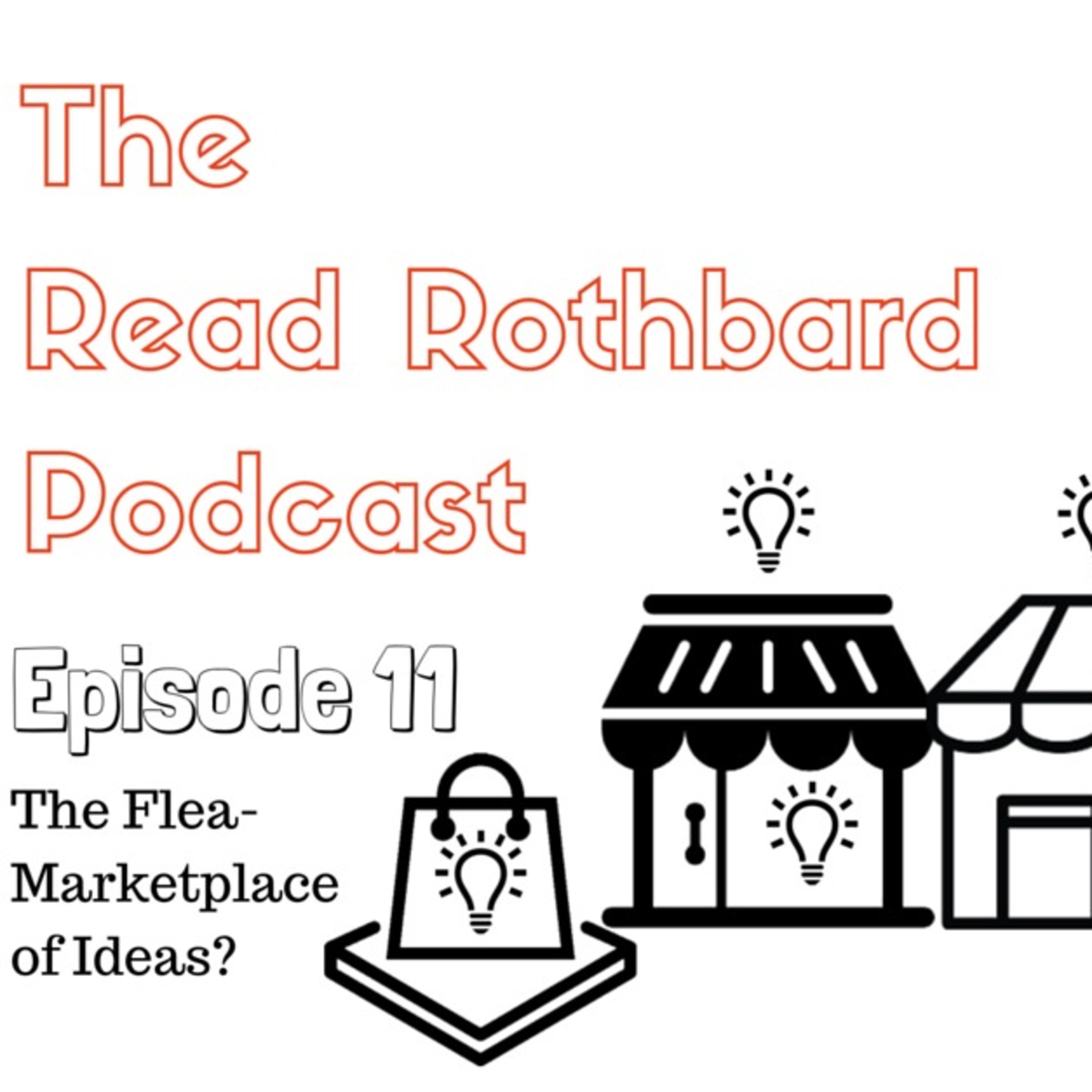
The Read Rothbard PodcastEpisode 11 - The Flea-marketplace of Ideas?Episode 11 of the Read Rothbard Podcast, starts out as a rambling mess...but I think we find our way.
We also introduce TRANSCRIPTS as an option for Murray Rothbard lectures here at www.ReadRothbard.com. Feel free to take a look at a free sample:
http://www.readrothbard.com/rothbard-on-libertarianism
There are already additional ones available regarding Rothbard's talks on the History of Economic Thought, and once I get those posted to the site, you will see a link here.
We are still finalizing the details surrounding our Premium Membership option, so look for more on that in the...
2016-07-301h 08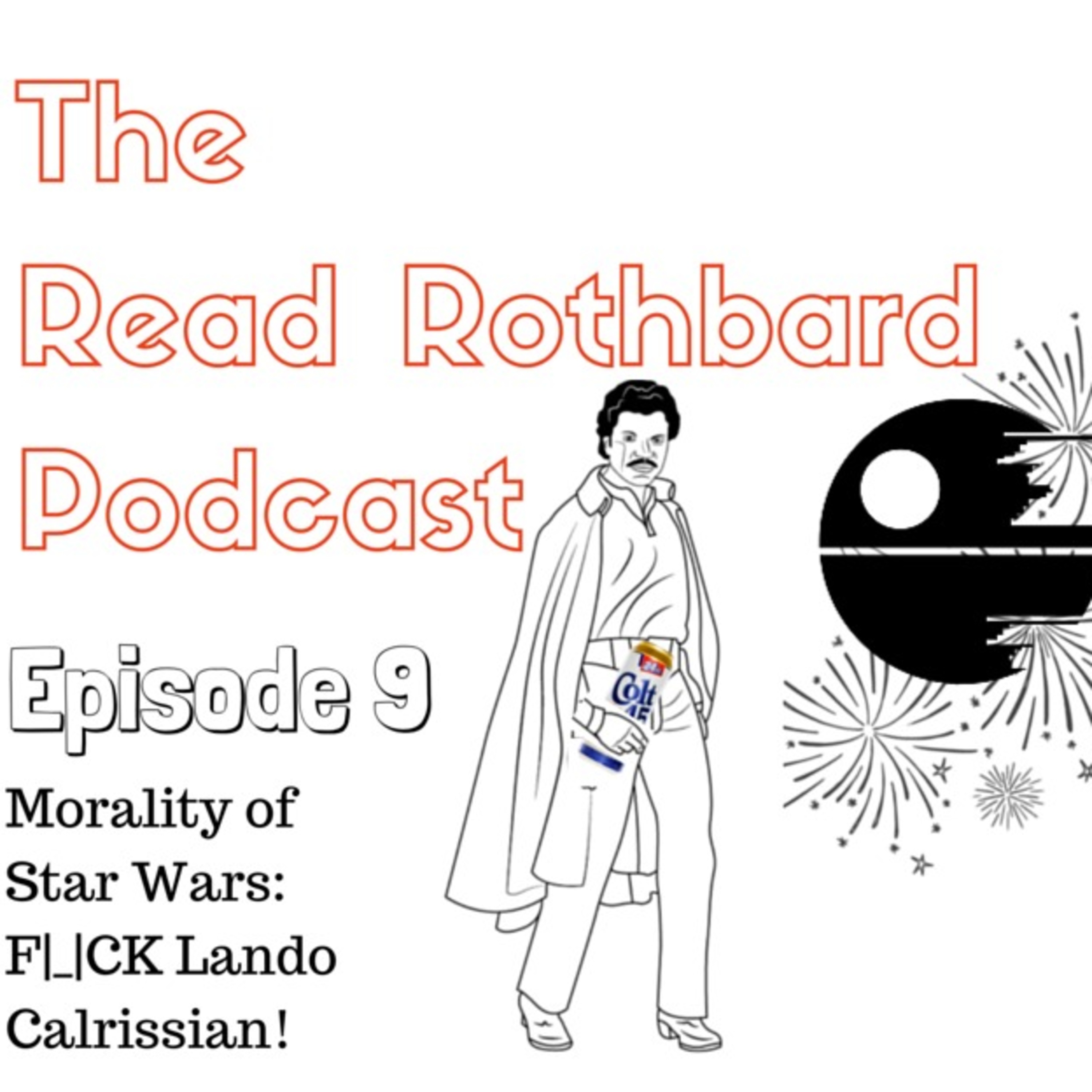
The Read Rothbard PodcastEpisode 9 - The Morality of Star WarsSPOILER ALERT! - Batman vs. Superman plot-line is discussed. - /SPOILER ALERT!
We open with Pokemon Go and talk about how providing a medium for something is not tied to it being used for evil, unless that thing is specifically evil.
Then we get on to the morality of Star Wars with two Kevin Smith movie scenes as our jumping off points. F|_|ck Lando Calrissian!
The first clip we play is from 1997's Chasing Amy.
The second clip is from 1994's Clerks.
Here is the article we mention regarding the Pokemon Go:
http://kotaku.com/pokemon-go-could-be-a-death-sentence-for-a-black-man-1783388743
Not much...
2016-07-131h 04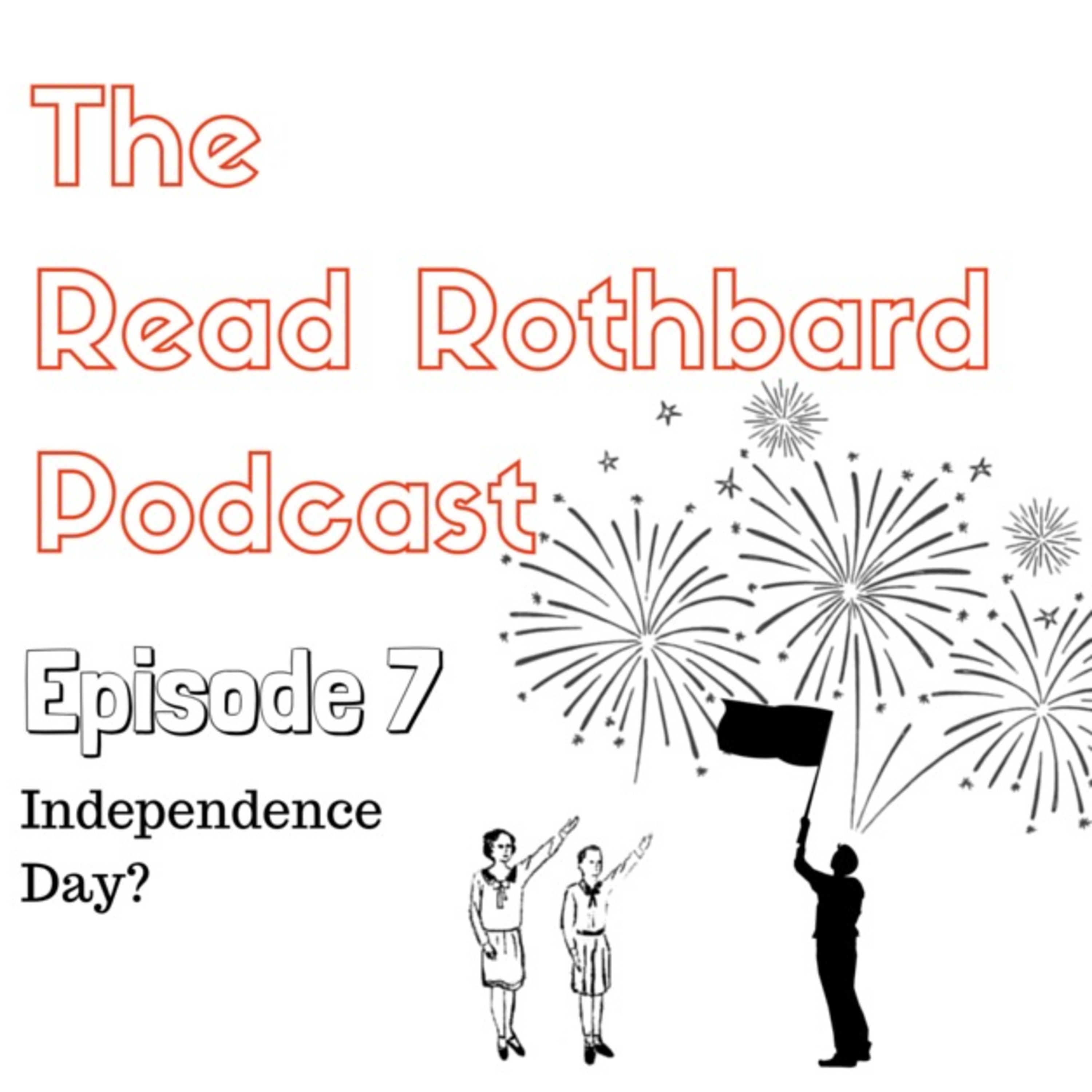
The Read Rothbard PodcastEpisode 7 - Independence Day?We break it down to some fundamentals. If this don't please 'em...I am not sure what else to say.
In Episode 7 of the Read Rothbard Podcast, we are again; all over the place. We do discuss a slate of topics that are sure to draw the ire of most. So, dive in and 'enjoy' an hour's worth of "two guys talking" about:
The Fourth of July
The Pledge of Allegiance
Brexit
Free State of Jones
We respond to a critique of our podcast!
More on Uber and Lyft
Muhammad Ali - draft dodger?
Articles discussed:
Tom Woods Article...
2016-07-021h 00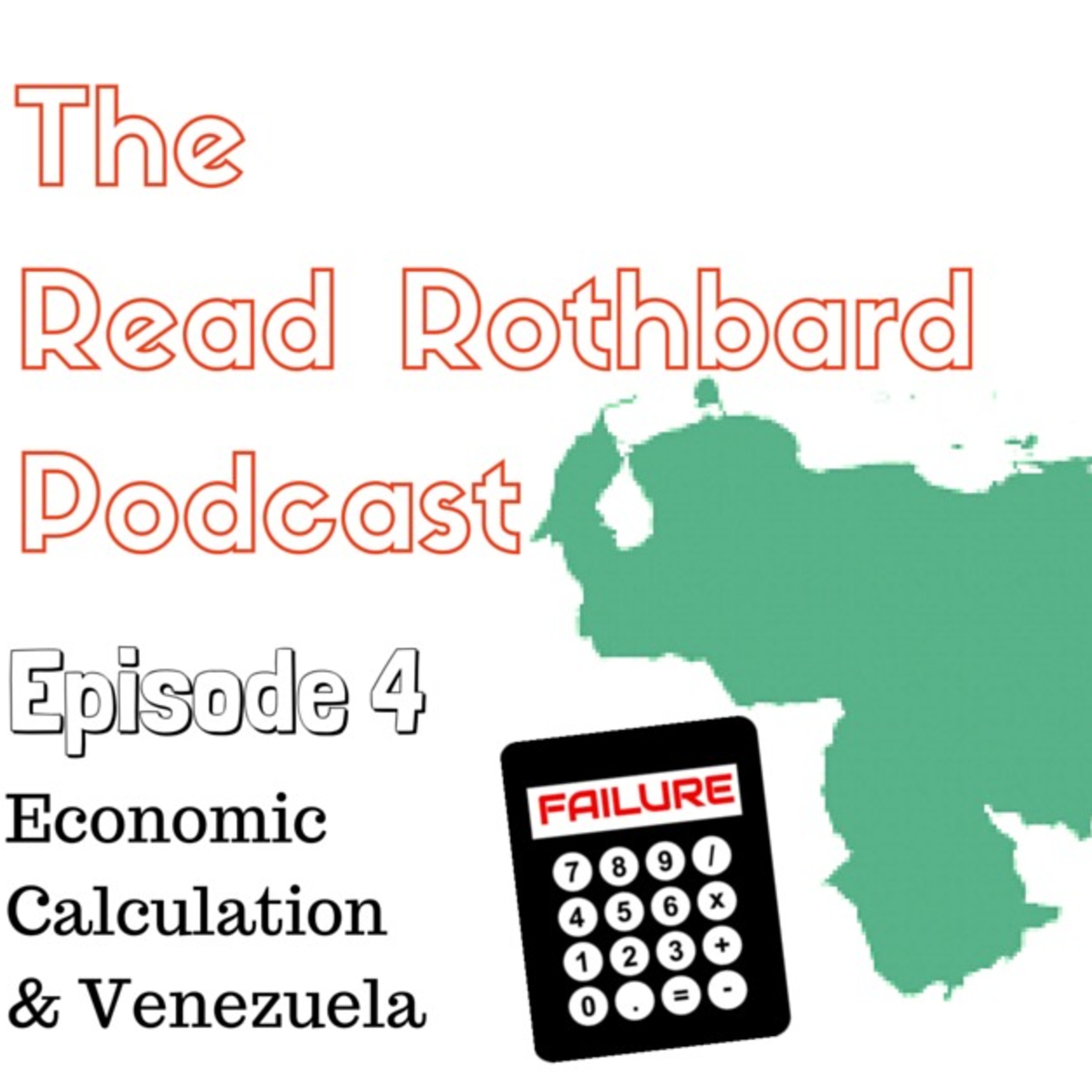
The Read Rothbard PodcastEpisode 4 - Economic Calculation & VenezuelaWe introduce a new format to the show where we play a short Rothbard clip and then apply it to present day events. In this episode, Rothbard discusses how socialism is unable to provide necessary economic calculation to have a functioning economy and we discuss the goings ons in the socialist hell-pit of Venezuela where there has been a 60x increase in gas prices as the country struggles with economic collapse. We also mention dicks. No, not like that. Dirty mind. (29:32)
For Show notes and more, please visit: http://www.readrothbard.com/episode-4
2016-06-0129 min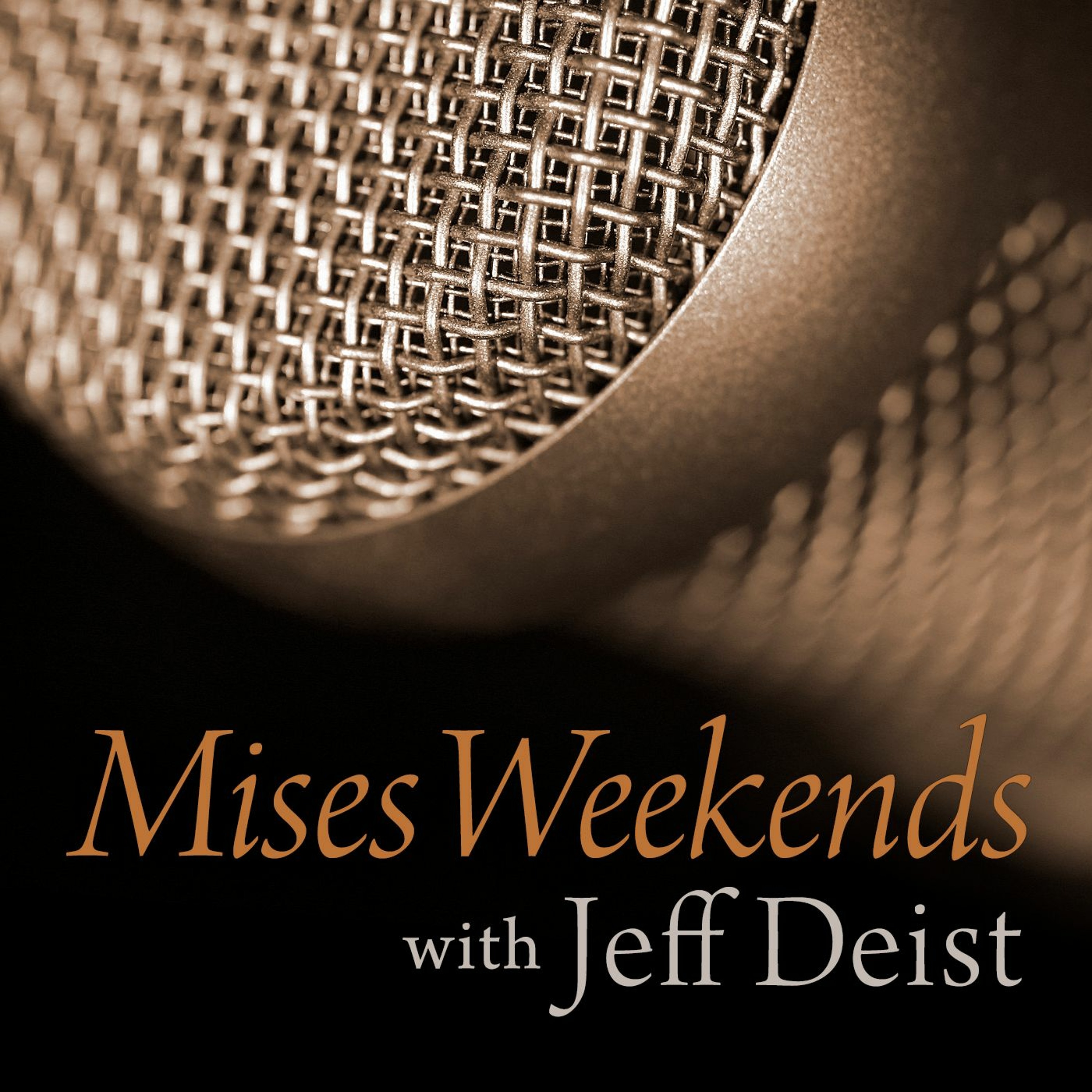
The Human Action PodcastMatt McCaffrey: Revisiting RothbardMurray Rothbard would have celebrated his 90th birthday this past week, so the Mises Institute held a reception in his honor at the ISFLC conference in Washington DC. Joining us to explain why Rothbard remains so relevant today is University of Manchester professor Matt McCaffrey, a former Mises Institute Fellow and editor of our new Rothbard Reader (https://mises.org/RothbardReader). Matt discusses Rothbard's amazing range of interests and knowledge, his relationship with Mises, his great opus Man, Economy, and State — written in his early 30s — and his enduring legacy in a sea of forgotten mainstream economists.
To read Professor McCa...
2016-03-0416 minKinsella On LibertyKOL197 | Tom Woods Show: The Central Rothbard Contribution I Overlooked, and Why It Matters: The Rothbard-Evers Title-Transfer Theory of ContractKinsella on Liberty Podcast, Episode 197.
I discussed Rothbardian/libertarian contract theory with Tom Woods on his show today.
Update: See also Łukasz Dominiak & Tate Fegley, "Contract Theory, Title Transfer, and Libertarianism," Diametros (10 Sep. 2022; doi: 10.33392/diam.180)
Transcript below.
Ep. 547 The Central Rothbard Contribution I Overlooked, and Why It Matters
Youtube:
3rd December 2015
Stephan Kinsella explains the importance of Rothbard’s theory of contract — a point I myself did not appreciate until this episode — and contrasts it with mainstream theories, which most libertarians think are the same as their own. We need to get these fundamentals right, so listen in and learn with me...
2015-12-0333 minKinsella on LibertyVolume 3 of Rothbard’s History of Economic Thought Exists!It's a tragedy Rothbard died in 1995, before he could finish his History of Economic Thought series. At the time of his death, he had only published volumes I and II (epub and PDF files available here; Mises catalog). However, as noted in the Mises store entry for Vol. III, The History of Economic Thought: From Marx to Hayek, although he "died before he could write his third volume of his famous History of Economic Thought that would cover the birth and development of the Austrian School, through the Keynesian Revolution and Chicago School," "he had already mapped out the entire...
2009-09-0100 min